Segun James Lagos State Governor, Mr. Babajide Sanwo-Olu, yesterday signed the
State's 2025 appropriation bill of N3.36 trillion into law. The Lagos State House of Assembly had jerked up the N3.005
www.thisdaylive.com

Segun James Lagos State Governor, Mr. Babajide Sanwo-Olu, yesterday signed the
State's 2025 appropriation bill of N3.36 trillion into law. The Lagos State House of Assembly had jerked up the N3.005
www.thisdaylive.com
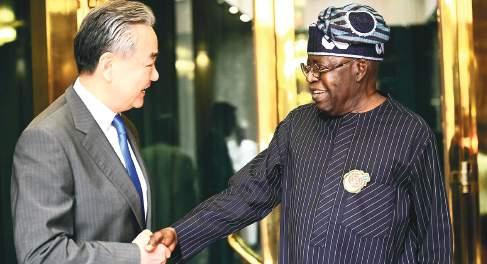




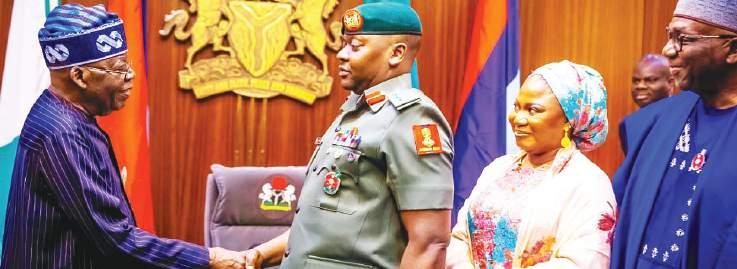
To collaborate with China in domesticating production of military equipment Tinubu canvasses increase in $2bn currency swap between Nigeria and China Wants upward review of $50bn African aid package announced last year by Chinese President Jinping Seeks Chinese support for Nigeria's bid for Permanent UN Security Council seat China kicks against external interference in Africa's internal affairs
Deji Elumoye, Michael Olugbode and Linus Aleke in Abuja
The Nigerian government, yesterday, ruled out the possibility of engaging foreign mercenaries in the fight against insurgency, banditry, and other security challenges facing the country.
The government said it did not believe such foreign forces held out any hope of solving the myriad security problems different parts of the country had been contending with.
It, however, indicated interest in working with China to domesticate production of military equipment to avoid delays involved in the procurement of the equipment from foreign countries.
President Bola Tinubu made the comments yesterday while receiving the Chinese Minister of Foreign Affairs, Wang Yi, at State House, Abuja.
A release issued by the president’s Adviser on Information and Strategy, Bayo Onanuga, said Tinubu called on the government of the People's Republic of China to increase the $2 billion currency swap agreement between Nigeria and China to enhance trade between the two countries.
He said increasing the level of currency swap would speed up infrastructure development in Nigeria
and deepen the strategic bilateral relations.
The president also called for an upward review of the $50 billion aid package for Africa, which China's President Xi Jinping announced last year.China and Nigeria recently renewed their currency swap agreement, valued at 15 billion yuan (approximately $2 billion), to enhance trade and investment.
"We still demand more in the area of currency swap. The level you have approved as a government for Nigeria is inadequate considering our programme. If you can increase that, it will be well appreciated. Our bond should grow stronger and become unbreakable," he said.
Regarding the $50 billion pledged by the Chinese government to support Africa, the Nigerian president stated that the continent's infrastructural needs would require more commitment. He urged a review of the amount to reflect the continent's reality.
Tinubu told the visiting minister, "I am happy you are part of China's highest decision-making body. We will want you to use your position to influence improved project funding.
“First, I say yes to the $50 billion support, and thank you for contributing
to African growth. The infrastructural needs of Africa are greater than that, and we want to move as rapidly as our other counterparts. “All share your vision of rapid development. Africa values the relationship with China, and we seek deeper collaboration for infrastructural development."
While calling on China to support Nigeria's bid for Permanent Seat in the United Nations Security Council, the president said, "You are a member
Peter Uzoho
Petroleum Retail Outlets Owners Association of Nigeria (PETROAN) has expressed concern over the slow pace of work by Reynolds Construction Company (RCC) on the Eleme East-West Road.
PETROAN accused the project contractor of sabotaging President Bola Tinubu's efforts to ensure smooth distribution of products from the Port Harcourt Refinery that recently came
of the UN Security Council. We want you to use your influence to ensure Nigeria secures the seat."
Tinubu thanked Jinping for his warm reception during his visit to China last year, and said Africa, particularly Nigeria, was prepared to meet development goals and contribute counterpart project funding.
According to Nigerian president, "We are ready to move and reach the various developmental goals.
Due to our deliberation, we signed many MOUs and planned many action programmes.
"My visit during FOCAC was a good experience. We signed several comprehensive MOUs during the visit. We planned several programmes of action.
“As a result of that deliberation, I made sure that immediately after I returned, I appointed one of the best brains available to coordinate Nigeria-
China relations, Mr Joseph Tegbe. He will work to actualise various MOUs and promote a greater understanding of developmental programmes. "It is good that you came at such a critical time. My visit to China was a good experience. Once again, accept my sympathy for the earthquake in Tibet. It was a natural disaster that nobody expected. We commend your government for the rapid reaction to protect lives."
back on stream.
National President of PETROAN, Dr. Billy Gillis-Harry, raised the concern in a statement he issued yesterday.
Gillis-Harry called on the president and Minister of Works, Dave Umahi, to urgently step in and evaluate the ongoing contract by RCC in line with the contract timeline.
He stated that about 60 retail outlets were negatively affected by the delay of the road construction
Kayode Tokede
pany secretary, Adewale Arogundade,
a
statement
on NGX stated that “This matter does not in any way impact the operations of the Company; and all the businesses within the Group continue to provide uninterrupted services to its customers.
He added: “We assure our valued customers, shareholders, investors, other stakeholders and the general public that we are taking all necessary steps to protect the interests of the Company and its subsidiaries.
“The Group’s performance continues to improve, resulting in a higher market capitalisation even as we work towards
surpassing the regulatory minimum capital well ahead of the deadline.
“In the meantime, the Registrar and Lead Issuing House are collating the returns from all receiving agents in respect of the Company’s Rights Issue which closed on December 30, 2024.”
He pointed out that FBN Holdings and its subsidiaries remain committed to the highest level of corporate governance.
FBN Holdings in April 2024 cancelled a scheduled EGM scheduled to be held virtually for the consideration and authorisation of the company to undertake a capital raise of up to
by RCC and requested adequate compensation for owners of those filling stations.
Gillis-Harry added that the project was suffering delay in construction despite RCC receiving N33 billion from the Federal Ministry of Works.
He recalled that Umahi had in a previous press conference also complained about the slow approach of RCC, leading to the issuance of a seven-day ultimatum by the minister.
The PETROAN president said
N300 billion.
The financial institution recently closed a N150 billion rights issue on the Exchange. The rights issue offered on a one-for-six basis to existing shareholders. FBN Holdings has been battling over who holds the single largest share of the institution.
The Holdings, in its audited accounts for 2023, had put Otedola as the single largest shareholder with a 9.41 per cent stake in the financial institution. Otedola, however, has recently increased his share holding by massive acquisition of more shares. At the moment, his exact stake is unclear.
thousands of petroleum trucks will be using the road to convey products from the newly inaugurated Port Harcourt refinery; hence, further delay was detrimental.
He said, "The Eleme East-West Road is a critical route for the transportation of petroleum products, and its safety is paramount.
"The road's deplorable condition poses a significant risk to trucks carrying petroleum products, which could lead to catastrophic accidents and environmental disasters.
"PETROAN is calling on President Tinubu to evaluate the ongoing contract by RCC in line with the contract timeline. This move would consolidate his renewed hope agenda by ensuring the timely completion of the Eleme East-West Road project.
"Furthermore, PETROAN is calling on the Minister of Works, David Umahi, to fast-track the contract evaluation process and take decisive action to address the slow pace of work by RCC."
In another development, PETROAN commended Tinubu for celebrating the 60th birthday of Group Chief Executive Officer of Nigerian National Petroleum Company (NNPC) Limited, Mallam Mele Kyari.
In a separate statement also issued yesterday by Gillis-Harry, PETROAN said Tinubu's acknowledgement of Kyari's diligence in transforming NNPC into a profitable organisation was a testament to the administration's commitment to the petroleum industry.

L-R: CEO of the Nigerian Economic Summit Group (NESG), Dr. Tayo Aduloju; Assistant Director of Statistics and Head, National Accounts Division, National Bureau of Statistics (NBS), Dr. Baba Madu; Thematic Lead of the Manufacturing Thematic Group, NESG Manufacturing and Mining Policy Commission, Dr. Muda Yusuf; Statistician-General of the Federation and CEO of NBS, Prince Adeyemi Adeniran; Chairman of the NESG, Mr. Niyi Yusuf; Head, Prices Statistics Division, NBS, Dr. Ayo Andrew Anthony; Economist at the NESG, Dr. Faith lyoha; and Director of Research/Chief Economist at Proshare Nigeria Limited, Teslim Shitta-Bey, at the NESG-NBS sensitisation workshop on GDP and CP| rebasing, held in Lagos... yesterday
There was a mild drama in the Senate yesterday when federal lawmakers put the economic team of the President Bola Tinubu's government on the spot again over the performance of the 2024 budget.
The team, led by the Minister of Finance and Coordinating Minister of the Economy, Mr. Wale Edun, was asked to explain details of the funds saved by the federal government from the fuel subsidy removal and amount so far spent on debt servicing.
A member of the Senate Committee on Appropriation, who is a chieftain of the Peoples Democratic Party (PDP) representing Bauchi Central Senatorial District, Senator Abdul Ningi, fired the barrage of questions.
Ningi put Edun on the spot when he asked the minister to explain how proceeds from fuel subsidy removal
were spent in the 2024 fiscal year. Ningi said, “What is the budget performance so far in the 2024 fiscal year, particularly in terms of the capital expenditure. We haven't heard from the minister how much has been saved from the removal of fuel subsidy and how much has been expended.
"We also haven't heard from the minister about the debt servicing. How much have we actually used to service our debts in 2004? How much are we expecting to service the debt in 2005?
“Finally, will the Minister of Finance guarantee that the extension of the capital component of the 2024 budget to June 30, 2025, will guarantee the desired results in terms of implementation that currently has a very low percentage?”
But obviously uncomfortable answering the questions in the presence of journalists, Edun pleaded with the senators to allow
him to provide detailed answers to the questions behind closed doors.
Edun said: “Are we in a closed door session? If we are not in a closed door session, I will humbly seek one so as to provide detailed explanations to the questions asked."
The Chairman of the Committee, Senator Solomon Adeola, sought the understanding of his colleagues to allow the minister to provide the answers in a close session.
He therefore asked the journalists to excuse them so that they could continue their deliberations behind closed doors.
Edun; the Minister of Budget, Economic planning, Senator Atiku Bagudu and other members of the Economic team appeared before the panel.
However, in another development, the Director General of National Orientation Agency (NOA), Mallam Lanre Issa-Onilu and his counterpart in the News Agency of Nigeria
(NAN), Ali Mohammed Ali, also encountered similar situation when they appeared before the Senate Committee on Information and National Orientation.
They were asked to go and reconcile disjointed figures presented in the 2024 budget implementation before coming for appropriation of their projected figures for 2025 fiscal year.
The panel, which appeared not to be satisfied with the estimates supplied by the two agencies, asked their Chief Executives to re-draft and re-present their budgetary proposals for 2025 fiscal year.
The committee chaired by Senator Kenneth Eze ( APC Ebonyi Central), tackled the NOA DG on the National Identity Project being implemented by the agency by saying the project was not known to Nigerians , particularly those residing at the grassroots.
The NOA DG explained to the
Abiodun to Raise ‘Ogun Teach Interns’ to 6,000, Pay Beneficiaries N80,000
Governor Dapo Abiodun of Ogun State has said that his administration would raise the bar of teacher recruitment in the state by increasing the number of teachers in the Ogun Teach initiative, currently pegged at 4,000 interns, to 6,000.
He said the move is to ensure that the gap in the student-to-teacher ratio in the state is closed.
Abiodun stated this in his OkeMosan office when he received the management team of Teach For All and the Teach For Nigeria program, who are in the state for their retreat.
Abiodun noted his administration, in line with current realities, has increased the wages of the Ogun Teach interns in the state to N80,000.
His words: "And I think we borrowed from the Teach For All and Teach For Nigeria schemes. Seeing the gap in the teacher-to-student ratio and how underserved our students were, we tried to plan how we can fast-track the employment or recruitment of teachers while also taking into account our budgetary allowance.
“We introduced the Ogun Teach program, which has been extremely successful.
"Out of the 4,000 who were employed under Ogun Teach, 2,000 of them have been given permanent
employment. This has allowed us to have teachers in our rural areas.
"To date, Ogun Teach has employed over 4,000 teachers. We are about to employ another batch now, which will make that 5,000. I have promised to raise that to 6,000."
The governor noted he had to declare an emergency in the education sector because of what his administration met on the ground, adding that his administration had been able to implement a wide range of policy initiatives like the Learners Identification Number, which helps to track each student in public schools in the state, and the Education Revitalization Agenda, which has helped to make education in the state seamless.
Abiodun said his administration would continue to absorb fellows of the Teach For Nigeria program who meet the requirements of the state government, as the state is committed to becoming the reference point for the Teach For Nigeria program in the country.
Earlier in her remarks, the Chief Executive Officer of Teach For Nigeria, Mrs. Molade Adeniyi, commended the current administration in the state for creating an enabling environment for the Teach For Nigeria program to thrive, saying that the Ogun State Government has been extremely supportive and also open
to dialogue.
Mrs. Molade Adeniyi noted the mission of Teach For Nigeria is to ensure that every child has access to excellent and quality education, adding that their mandate aligns greatly with the ISEYA mantra of the Ogun State Government.
She said that Teach For Nigeria
only recruits highly qualified, energetic, and disciplined young men and women who then go through a two-year fellowship as a deliberate effort to build leaders who are passionate about tackling inequity in education and, at the same time, passionate about providing quality education.
committee members that the project is very necessary in putting in place the right value system . "The challenge we have about the value system is about National Identity which is very necessary at galvanising Nigerians for Nation
building, national development and growth,” Issa-Onilu explained. The Committee however insisted that he should go back for re-drafting programmes of the agency to be captured and appropriated for, in the 2025 fiscal year.
Lagos State Governor, Mr. Babajide Sanwo-Olu, has restated his administration's unwavering commitment to the delivery of quality infrastructure to improve the lives of residents of Lagos State, assuring residents that no part of the state would be left behind in the government’s urban regeneration bid.
Sanwo-Olu made the commitment yesterday during the inauguration of five strategic networks of roads with improved drainage networks at Ikeja GRA in the Ikeja Local Government Area. The roads are Oba Dosumu Street, Oduduwa Way, Oduduwa Crescent, Sobo Arobiodu and Sasegbon Streets.
The network of roads spanning a total length of 6.134 kilometres complements Isaac John, Joel Ogunnaike Street, Oba Ladejobi and Harold Shodipo, which were upgraded earlier, a statement by his Chief Press Secretary, Gboyega Akosile, stated.
The newly rehabilitated roads will ease vehicular movement, improve
interconnectivity and also enhance the drainage network, ensuring efficient stormwater management to combat the recurrent flooding that has plagued the area.
Speaking at the event organised by the Ministry of Works and Infrastructure, Office of Infrastructure at Ikeja, Sanwo-Olu said the network of roads would bring about socioeconomic growth and development of the area, improve the quality of lives of residents, and impact positively on the Gross Domestic Product (GDP) of the State.
He said: "The rehabilitated roads and drainage systems will mitigate flooding and erosion, reduce traffic congestion and commute times. It will also enhance safety and security, improve the aesthetics of the environment, and increase property values. More importantly, the completion of this network of roads is expected to further boost business turnover, ultimately contributing to the growth of the state’s Gross Domestic Product (GDP).
Chuks Okocha in Abuja
A former governor of Anambra State, Peter Obi, has decried the increasing spate of insecurity in Nigeria, especially the kidnapping of farmers.
Obi, who was the presidential candidate of the Labour party in the 2023 general election, called on security agencies in the country to increase their efforts to stamp out all forms of criminality in the country.
He lamented that no one was even spared by the rampaging kidnappers as everyone has felt the heat of the kidnappers.
Obi, who lamented the spate of
kidnapping on X said, ''The frequent occurrence of crimes, especially kidnapping, in the country today is worrisome and it's causing a lot of apprehension in the land.
''Today, no one is currently spared from the dangerous wind of many kidnappings and killings blowing through many parts of the nation.
''Every Nigerian feels the heat of insecurity, which has continued to affect every aspect of our nation, from the agricultural sector, where farmers are often chased out of their farmlands, to the health and educational sectors, where critical workers are often kidnapped or killed.
''This is exemplified by the constant
kidnapping and, sometimes, killing of our farmers, teachers and lecturers in different schools and universities.
''Just recently, the Manager of College of Nursing Sciences, Ihiala, was killed. Yesterday, 2 Reverend Sisters, one a Principal and other a teacher who work in our different schools in Anambra state were again kidnapped.
''These are people contributing immensely to our national development through their sacrifices in farms, educational and health facilities in different remote villages.
''Nothing justifies these kidnaps, killings, as well as those of many Nigerians who suffer the same fate
daily. This worrisome situation continues to demand urgent attention from us, the leaders.
''One wonders if the reported cases of kidnapping and killings are this much, then how many go unreported?
''Again, I appeal to the government to employ every security arsenal at its disposal to end this menace and ensure the safe rescue of those in captivity. And to the criminals terrorizing our people, I urge them to have a change of heart and desist from their evil ways.
''We must not burn down our only nation with terror and violence,'' he stated.


The Minister of Works David Umahi (Middle) speaking with contractors during inspection of federal road projects in Rivers State.
BudgIT has called on the National Assembly to use its powers to proactively address irregularities contained in the 2025 proposed national budget to ensure that the approved budget would reflect the needs and preferences of Nigerians.
The organisation listed the needs as job creation, poverty reduction and inclusive broad-based economic growth.
BudgIT made this call yesterday in its public statement that was signed by its Communications Associate, Ms. Nancy Odimegwu, in which it said that the irregularities identified in the proposed budget included non-budgetary provision for the funding of the Lagos-Calabar Coastal Road.
Other irregularities identified in the proposed budget were noninclusion of budget breakdown of some MDAs, commissions, and councils, as well as the absence of the budgets of over 60 governmentowned enterprises (GOEs).
These, it said, included the Nigeria Ports Authority (NPA) Nigeria Customs Service (NCS), Nigerian Maritime Administration and Safety Agency (NIMASA), among others, which it said were conspicuously absent from the 2025 proposed budget.
BudgIT said: “We have observed that the 2025 proposed budget breakdown submitted to the National Assembly for review and approval and published on
the Budget Office website omits the breakdown of some MDAs, commissions, and councils, such as the National Judicial Council (N341.63 billion), and TETFUND (N940.5 billion).
“The budgets of over 60 government-owned enterprises (GOEs), including the Nigeria Ports Authority, Nigeria Customs Service, Nigerian Maritime Administration and Safety Agency (NIMASA), etc., were conspicuously absent from the 2025 Proposed Budget.
“Furthermore, a combined N2.49 trillion has been allocated to five regional development commissions (Niger Delta: N776.53 billion; South West: N498.40 billion; North East: N290.99 billion; North West: N585.93 billion; and South East: N341.27 billion) under the umbrella of personnel costs.
“This approach obscures the true nature of these commissions' operational expenses. Lumping development commission budgets under personnel costs raises concerns about transparency and accountability.
“It hinders proper scrutiny of how these funds are utilised and whether they effectively achieve their intended development objectives.”
It further observed the fact that the 2025 budget notably omits funding for the Lagos-Calabar Coastal Road, a capital-intensive infrastructure project.
“This omission implies that if funding for this project materialises,
it will likely necessitate reallocating funds from other critical projects, potentially hindering their implementation and impacting the budget's credibility,” it said.
Besides, the organisation expressed the view that the recent pronouncements of President Bola Tinubu’s regarding the retirement package of military generals contradicted his previous commitments to reducing the cost of governance and welfare packages to top-ranked public officials and civil servants.
“Such provisions not only inflate the budget and widen the fiscal deficit but may also demoralise lower-ranking military personnel,
Sylvester Idowu
The Community Development Committees of Niger Delta Oil and Gas Producing Areas (CDC) has called on the federal government to investigate alleged mismanagement of Ogoni clean-up by Hydrocarbon Pollution Remediation Project, a body saddled with the exercise.
The group maintained that investigation of HYPREP became necessary following revelations by INDEPENDENT, a United Kingdom-
who lack adequate health insurance and retirement benefits despite their higher exposure to combat risks,” BudgIT said.
BudgIT also urged the National Assembly to resist the temptation to increase the oil price benchmark in order to create fiscal space for the insertions of their budget sub-heads.
It recalled that it had in previous years identified several budgetary insertions made by the National Assembly that deviated from the federal government's constitutional mandate and priorities and are assigned to MDAs that have neither the capacity nor the mandate to implement the inserted projects.
It said: “In 2021, BudgIT observed that 5,601 capital projects were added to the Appropriation Bill during the review process by the National Assembly.
“In 2022, it increased to 6,462 projects across 37 Mother Ministries and 340 MDAs, while in 2024, 7,447 insertions amounting to a staggering N2.24 trillion were found in the budget.”
BudgIT noted that whereas the Constitution granted the National Assembly the authority to appropriate funds, the federal legislatures often modified the executive's proposed budget by distorting its original intent and
disconnecting it from the nation’s long-term development agenda. It said: “Many inserted projects usually lack proper conceptualisation, design, and cost estimation, undermining their effectiveness and feasibility.
“We believe that the legislature must exercise this power with the utmost responsibility.”
It, therefore, appealed to the 409 members of the National Assembly to prioritise national interest over personal or parochial considerations and ensure that the approved budget would stimulate economic activities and macroeconomic stability.
based newspaper in its December 23, 2024 publication.
INDEPENDENT UK had published a report titled "Nigerian Agency 'Failed Completely' To Clean Up Oil Damage Despite Funding, Leaked Files Say in Nigeria" with an introduction "In Nigeria, the first part of a $1 billion project to clean up Ogoniland in the Niger Delta, where there have been thousands of oil spills, was a “total failure.”
Reacting to the report, Community Development Committees of Niger
Former Governor of Abia State, Senator Theodore Orji, has condemned a recent publication linking him to an interim forfeiture of N228.4million and the fraudulent activities linked to Effdee Nigeria Limited.
In a statement issued by his liaison office, he vehemently faulted the reports, saying the publishers were out to tarnish his hard earned reputation.
The statement described the publication as "baseless" and "malicious," accusing publishers of spreading defamatory content without proper fact-checking.
Among the numerous inaccuracies,
the report falsely claimed that Senator Orji served as Governor of Abia State in 2016/2017, years after his tenure ended in May 2015.
Further, the statement refuted claims that individuals Mr. Uchenna Erondu and Mr. Austin Akuma were associated with Senator Orji's administration, clarifying that they had no connection to him during his time as governor.
The former governor also denied any knowledge of or dealings with Effdee Nigeria Limited, which the publication falsely linked to Senator Orji.
“This publication is not only false but also maliciously intended to damage Senator Orji’s hard-earned
reputation, a man known for his integrity and public service,” the statement said.
The statement demanded that the story be retracted in major national newspapers and online platforms where the original report appeared. Additionally, the statement called for an internal investigation from the News Agency of Nigeria (NAN) which first circulated the story to prevent similar occurrences in the future.
Failure to meet these demands, the statement warned, would prompt legal action, including claims for damages caused by the false publication.
Besides, the statement urged the
public to disregard the misleading report and reaffirmed Senator Orji’s commitment to transparency and good governance. It also called on the media to uphold professionalism and truth in their reporting, cautioning against unverified claims.
The letter stated that Mr. Uchenna Erondu never worked under Senator Orji’s administration. It affirmed that Uchenna Erondu served as special adviser during the regime of the immediate past Governor Okesie Ikpeazu.
"The claim that Mr. Erondu was a Special Adviser is entirely false, as he had no affiliation with Senator Orji’s administration.
Delta Oil and Gas Producing Areas
(CDC) said indictment of HYPREP in the report by INDEPENDENT newspaper based in United Kingdom, demands a probe of the organisation by the Nigerian government.
In a statement signed by the Chairman, Board of Trustees of CDC, Joseph Ambadekerimo, and issued yesterday, the group said it found the expose on the Ogoni clean-up and HUPREP as very unfortunate sending misgivings as a people who do not know what they actually want in the Niger Delta region.
"The reports well marshalled by the DAILY INDEPENDENT of London further confirms the endemic corruption that has once again bedeviled the good intentions of International Multilateral agencies.
"It is preposterous and mind boggling to find people whom trust is reposed on to have meted out this kind of unethical behaviour and taken undue advantage on the suffering of their own people to further their own self economic well-being", it stated.
The group said it was appalled with the untoward scandal and called for President Bola Tinubu to suspend the leadership of HYPREP as soon as practicable and institute a probe to unravel all of the issues and corruption in the agency.
"We also call on the anti-corruption agencies to swing into action immediately and undertake a painstaking investigation into the financial dealings of the agency.
“A further call is also to the minister of environment to unravel the issues of use of substandard laboratories and employment of unqualified companies to do the clean-up.
"What has happened so far in the HYPREP has been there in the public domain, neither the Ministry of Environment nor the anti-corruption agencies have summoned courage to intervene until this report is coming out from the London INDEPENDENT Newspaper.
"It is worrying to see what Ken Saro-Wiwa and the rest of the Ogoni Eleven agitated and died for, has now been rubbished. No doubt Ken Saro-Wiwa and others will be turning in their graves.
“The question to ask now is do we really know what we want as a people inhabiting the Niger Delta?", the group demanded.
CDC noted that it was a very sad commentary to say the least on happenings at the agency and asked President Tinubu to take a decisive step to remedy the ugly trend and reposition the HYPREP that will meet the aspirations of the Ogoni people for resettlement and their livelihood.
"Now we are talking of cleaning of other impacted sites in the region that is yet to be attended to, issues of mismanagement of resources are rife; how does the international organisations have confidence in providing further funds for the cleanup of the rest of the region.
Nume Ekeghe
Central Bank of Nigeria (CBN) announced the immediate suspension of approvals for extensions on the repatriation of export proceeds, marking a significant step to enforce compliance with the country's foreign exchange regulations.
In a circular dated January 8, 2025, and signed by Acting Director of the CBN’s Trade and Exchange Department, W.J. Kanya, the apex bank clarified that the directive applied to both oil and non-oil export transactions.
The move drew from provisions outlined in the Foreign Exchange Manual (Revised Edition, March 2018), particularly Memorandum 10A (23a) and Memorandum 10B (20a).
The statement added that exporters must adhere to existing timelines for repatriating export proceeds. Non-oil export proceeds must be repatriated within 180 days of the bill of lading date, while oil and gas export proceeds have a 90-day deadline. These timelines were now deemed non-negotiable.
The statement said, “With effect
from the date of this circular, the Central Bank of Nigeria will no longer approve requests for extension of repatriation of export proceeds by Authorized Dealers on behalf of their customers. For the avoidance of doubt, proceeds of oil and non-oil exports are to be repatriated and credited into the exporters' export proceeds domiciliary accounts within 180 days and 90 days from the bill of lading date for non-oil and oil and gas exports, respectively. Accordingly, all Authorised Dealer Banks were required to draw the attention of their customers to the
provision of extant regulation and ensure compliance.
The directive imposed stricter obligations on exporters and au thorised dealer banks to comply with repatriation rules. Banks are now required to notify their clients about these updated regulations and ensure full compliance. The CBN also warned that failure to adhere to the guidelines could result in penalties or other regulatory actions.
The policy formed part of broader efforts by the CBN to enhance foreign exchange inflows and strengthen Nigeria’s foreign reserves.
privies affiliates howsoever described, including any person claiming under its authority from making any calls or demands or taking any steps whatsoever to enforce any security receivables, instrument, finance documents or assets of the Applicant which have been charged as security for the facility agreements in respect of the Applicant's operation of OML 120.
“(This) include, but not limited to the said letter, and the amended and restatement agreements between the Applicant and the Respondent pending the hearing and determination of the arbitration proceedings between the Applicant and the Respondent brought pursuant to Clause 12 (c) of the Agreement between the Applicant and the Respondent dated 29th May, 2021," the court document showed.
But it was gathered that FBN went ahead by obtaining a court injunction purportedly freezing GHL's funds in all commercial banks in the country to the tune of $225.8 million, in violation of the earlier court order. As a result, GHL has initiated contempt proceeding against the bank and its directors.
Aside Otedola, who is facing arrest for going ahead to get a mareva order without disclosing to the court that the case had already been argued and determined, also facing contempt charges are the Managing Director/ Chief Executive Officer, Mr. Olusegun Alebiosu, and other directors.
GHL had dragged FBN Holdings to court as the holding company was seeking to frustrate and take over the oil and gas company’s bona fide assets after signing the memorandum of understanding (MOU).
“More importantly, FBN is putting at risk the repayment of the outstanding exposure to AMCON and the repayment of its new facili-
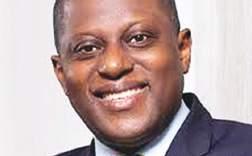

ties under the MOU and seeking to create Atlantic Energy 2 by trying to orchestrate another non-performing loan situation.
“GHL will resist this with all the powers of the law and will not allow any non-performing loan in its name as we remain committed to meeting all our obligations. In
addition, FBN’s non-payment for the TotalEnergies farm-out of the Noble Rig (drill ship), has exposed GHL to over $15M default penalty by 14 November 2024 which FBN is fully aware of.
“These costs are in addition to further millions of dollars in costs and exposures to global service
providers like Schlumberger, Baker Hughes, Century FPSO and Marine Platforms, Halliburton, etc. For over three years, despite demands from GHL and in line with all the signed agreements, FBN has refused, failed and neglected to pay salaries and operating expenses of GHL staff, offices and operations.
from external and internal loans and bonds.
The fiscal document was structured around five key pillars which include: Infrastructure Sustainability, Economic Diversification, and Institutional Reforms.
However, Sanwo-Olu signed the budget themed: "Budget of Sustainability," yesterday, at the Lagos House, Ikeja, at a ceremony that had in attendance, Deputy Governor, Lagos State, Dr. Obafemi Hazmat; Secretary to the State Government, Bimbola Salu-Hudeyin, members of the Lagos State House of Assembly, led by Chairman of the Joint Committee on Appropriation and Finance, Sa'ad Olumoh, members of the state Executive Council.
The Lagos State House of Assembly had on Monday approved a total sum of N3,366,815,224,144 as the total budget of the State for 2025.
The approval followed the presentation of a report on the budget by Olumoh, and the subsequent voice votes by lawmakers at a sitting presided over by the Speaker, Mudashiru Obasa.
According to Sanwo-Olu, "the budget is a blueprint for continuity, resilience and prosperity for residents."
Giving the details, the governor stated that "the Year 2025 Budget as proposed has a total budget size of N3,005,935,198,401, comprising a total Revenue of N2,597,034,000,000 and deficit financing of N408,902,000,000.
"Total Revenue comprises our Internally Generated Revenue of N1,970,897,000,000 and total Federal Transfers of N626,137,000,000.
"For capital expenditure, we propose a total figure of N1.766,117 trillion, as follows: Capital expenditure: N1.452 Trillion, while repayments is: ₦313.515 Billion."
The deficit financing, which is within the fiscal sustainability parameters, Sanwo-Olu stressed, shall consist of external and internal loans and bonds.
The approved budget is made of N1,295,630,197,452 as recurrent expenditure while N2,071,185,026,692 was earmarked as capital expenditure for the year ending December 31, 2025.
Sanwo-Olu, while speaking at the signing into law ceremony, called for continued collaboration between the Executive, who would implement the budget, and the Legislature, who would provide the much-needed monitoring and oversight to ensure it achieve the greatest good for the greatest number of people with the limited resources available.
While also calling on residents to join hands with government as it deploys resources in line with the provisions of the budget, SanwoOlu, stressed: "Your feedback will be deeply valued, as always, just as your judicious stewardship of all of the tangible dividends of the budget is required.
"The infrastructure that will be
delivered belongs to all of us, and we must care for it and protect it as owners. There is no room in our State for abuse, vandalism, neglect, or nonchalance in the management of our commonwealth.
"On our part as the Lagos State Government, we will also live up to the responsibility of delivering governance that is respectful of and responsive to the people at all times.
"I am charging the civil service and all other concerned stakeholders to once again deliver an impressive level of budget implementation in 2025."
Earlier, the Commissioner for Economic Planning and Budget, Ope George, noted that the N3.366 trillion budget was not only the largest in history but also positions Lagos as the first sub-national government in Nigeria to pass a budget of the magnitude.
George stated, "It reflects under your leadership your unwavering commitment to economic growth, infrastructural development, and the welfare of all Lagosians.
"This historic budget underscores our commitment to prioritising infrastructure, with 62 percent allocated to capital expenditure and 38 percent to recurrent spending.
"This allocation represents our focus on driving long-term investments while maintaining efficient delivery of essential services.
"Our revenue framework, which projects N2.342 trillion from total
internally generated revenue and N626.137 billion from federal transfers, is anchored on innovation, accountability, and fiscal sustainability.
"A deficit financing of N398.662 billion has also been carefully structured to ensure financial prudence.
As a state known for trailblazing achievements, Lagos continues to set the pace for innovation and development in Nigeria and beyond.
"This administration’s investment in Economic Affairs, with a record allocation of N1.142 trillion, reaffirms our commitment to job creation, enterprise growth, and economic diversification.
"Our allocations to Education (N223.3 billion) and Health (N222.2 billion) underscore our priority to nurture a skilled workforce and deliver world-class healthcare services.
"Recognising the global urgency of environmental sustainability, we have allocated N287.2 billion to environmental initiatives, further demonstrating Lagos’s leadership as the first state to establish a dedicated Climate Change Department and lead climate action at the sub-national level.
"Security and social protection remain at the heart of our development agenda, with allocations of N140.9 billion and N37.3 billion, respectively, ensuring the safety of our citizens and addressing the needs of our most vulnerable populations."
“If they cannot pay for GHL personnel and operations, how do they plan to pay for an additional independent asset manager, when GHL has already appointed ab initio Schlumberger and Baker Hughes as joint technical operators and advisers,” the oil company queried.
THISDAY reported on Thursday, that a group of shareholders at First Bank of Nigeria Holdings Plc., with 10 per cent of the company’s shares had formerly requested the company to call an Extra-ordinary General Meeting (EGM) under section 215 (1) of CAMA in which case they have 21 days to call the EGM.
Top on the agenda of the proposed meeting is the removal of Otedola and a Non-executive/Deputy Chief Executive of Geregu Power Plc, Omodayo-Owotuga.
The shareholders alleged that since Otedola’s acquisition of a significant amount of shares that led to his emergence as Chairman of FBN Holdings, the financial institution
N82.908 billion as of December 31, 2023.
Commenting on the findings, a stock market analyst who preferred to remain anonymous, noted that, “If you look at it carefully, you will see that Geregu’s market capitalisation is over 20 times its turnover, while that of MTN is different, which for me doesn’t add up. So, people would keep raising concerns over important things like that.
“Why does this matter? Essentially, Geregu is a cash cow that its Chairman, Femi Otedola uses to borrow money to mop up FBN Holdings shares from the NGX. He has just borrowed $45 million from Afreximbank against FBN shares.
“The point is that Geregu is
has not known peace.
Besides, materials made available to THISDAY have indicated how First Bank routinely breached the letters of the contract, causing severe losses to the oil company, including over $47 million and 217-man days, due to delayed funding of the project or outright refusal to finance the deal.
Specifically, GHL management said the agreement which entailed the bank funding the optimal exploration and development of the oil asset, made the bank escape a loan loss provision of N302 billion against a profit of N151 billion ultimately declared for the year ending December 31, 2021.
“Having saved them this massive hit, FBN’s books now became performing, avoiding a market punishment and loss of confidence that would have followed their loss which they may never have recovered from as a result of their own reckless lending.
“At GHL, we are wondering if FBN used us to get to profitability under false pretences knowing that they had no intention of meeting their financial obligations to GHL of fully funding the optimum exploration, development and production of OML 120 as events would later show,” part of the document read.
Due to FBN’s very tardy manner in disbursing the payments, the bank, GHL said did not make the $25 million out of the agreed $50 million for drilling available until three to four months later, in January/February 2024, causing more losses to GHL’s drilling operations.
The situation, the oil firm said, led to a liability for over $500,000 per day for the Blackford Dolphin rig which was on standby mode (not operating) during the period of non-payment. Besides, GHL has vowed to sue the bank for $1 billion in damages, following the breach of the contract entered by both parties, it was learnt.
These developments came, as more shareholders of the First Bank, including Barbican Barbican Capital Limited and Norsworthy Investment Limited have kicked against private placement by the bank and are seeking the holding of an Extraordinary General meeting (EGM) of the Company to be held as soon as possible.
In a letter seen by THISDAY , Barbican said: “We hereby requisition for an Extraordinary General meeting
owed power sector debt like other players in that sector and has little economic activity, so, why would it have a market capitalisation of N2.9 trillion? What drives it?
“There are allegations that those shares are sexed up to fund the acquisition of FBN shares. So, for FBN Holdings, the biggest problem it faces is its financial accounts.
The financial institution was in a loss position in 2021 until it did a deal with General Hydrocarbon Limited (GHL). “That deal was conditioned on them funding the GHL’s oil well, and they suddenly failed to fund the oil well.”
This failure has caused huge losses to GHL which is currently seeking redress in court.
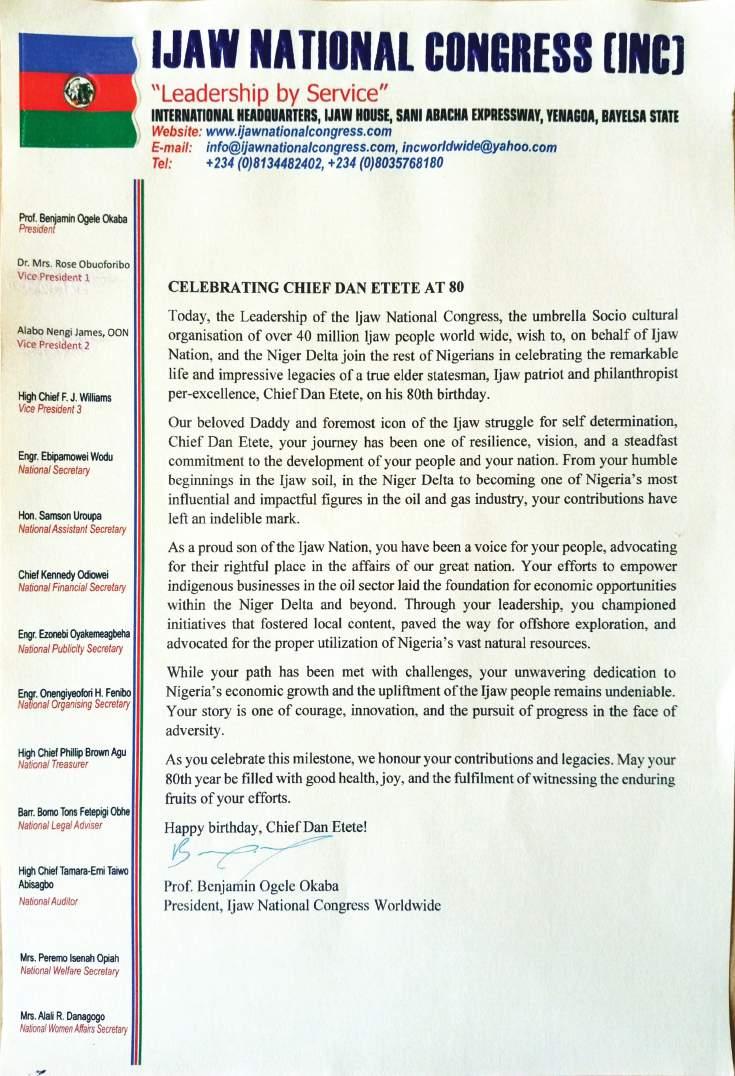



Today, we proudly celebrate an extraordinary milestone in the life of a remarkable elder statesman, our beloved patriarch, Sen Dauzia Loya Etete as he turns 80 years old
Over the decades, you have stood as a shining example of what it means to serve, be loyal, and Industrious, with an unwavering commitment to unity and progress especially for the ljaw Nation. In a world often divided, your detribalized approach to leadership has broken barriers, inspired hope, and fostered harmony within the family and across cultures Your vision for an empowered Ijaw Nation and Nigeria at large has guided your actions, leaving an indelible mark on our nation's development

Your life is a testament to the spirit and character of resilience, having triumphed over adversity with grace and courage

Whether navigating personal challenges or tackling national issues, your unwavering determination has always been a source of inspiration to your family, friends, and the countless individuals whose lives you have touched
As a family, we are deeply grateful for your love, guidance, and the invaluable legacy you continue to build As we celebrate this momentous occasion, we honour not only the years you have lived but the profound impact you have made in shaping a brighter future for generations to come. May this special day be filled with joy, love, and the recognition you so richly deserve We pray for many more years of good health, happiness, and continued service to humanity.
Happy 80th Birthday, Dauzia! With love and admiration,
Signed by Chief Bukazi L. Etete For The Etete Royal Family of Odi



Blessing Ibunge in Port Harcourt
The Rivers State Commissioner of Police(CP), Olugbenga Adepoju, has urged officers of the Command to uphold the integrity of the Nigerian Police Force and maintain professionalism in line of duty.
The CP gave the charge yesterday, while decorating the newly 119 promoted officers of the Command, at the Police Officers’ Mess, Port Harcourt.
Adepoju, who applauded the officers for their hard work and commitment, urged them to shun
corruption, embrace community policing and be disciplined in their new roles, adding that their conduct must reflect the ideals of the Force.
He said: “Today, we are celebrating our officers who have been promoted. This recognition is a result of their dedication and hard work. I want to thank the Inspector General of Police, Kayode Egbetokun, and the Police Service Commission for making this possible.
“You now bear more responsibilities and must work harder than before. Uphold the name of the Force, prove yourself
in your new rank, and carry the image of the police with pride.
“Rivers State has its unique challenges, and we must address them with a commitment to zero tolerance for corruption. Respect human rights, ensure your subordinates do the same, and always maintain a disciplined and professional appearance. Community policing is key; engage with the public and ensure you fulfill your responsibilities diligently.”
Adepoju also warned that failure to meet the expectations of their new ranks would attract consequences.
Former Inspector General of Police(IG), Mike Okiro, has withdrawn from the race for the position of President-General of Ohanaeze Ndigbo. Speaking during a press briefing in Enugu yesterday, Okiro explained that his decision was in compliance with an Enugu State High Court order that barred him from contesting. The court issued the injunction following a suit claiming Okiro is from Imo State, not Rivers State, where the position has been zoned. He stated: “My dear brothers and sisters, I, Sir Mike Okiro CFR, President General Candidate for Ohanaeze Ndigbo Election slated for 10th January 2025 address you today with unwavering resolve.
I have been made aware of the Enugu State High Court’s interim order, which regrettably restrains me from contesting the Ohanaeze Ndigbo Worldwide Presidency General Election tomorrow.
“The court order, based on alleged non-indigene status, contradicts verifiable facts. It is unfortunate that the court did not invite me or hear from me before giving that obnoxious order which I got from the media. The facts are (a) That I hail from Egbema in Rivers State as shown by my National Population Commission Attestation of Birth. (b) My Traditional Ruler, the Nzeobi of Egbema, has also confirmed my indigene status in Rivers State. (c)
I have written many books where my indigeneship of Rivers State is shown in the author’s column. A good example is my best seller, titled: “Nigeria: The Restructuring ‘Controversy”.“(d) Page 6 of my biography written by Mr. Dozie Okebalama also shows my indigeneship of Rivers. (e) I have attended many Imeobi meetings where I represented Rivers State in the attendance list compiled by the Secretary-General. (f) As a student at the University of Ibadan, I was a member of the Rivers State Students’ Association, where I was elected as Treasurer, and another Great UIte, now Distinguished Senator Andrew Uchendu was elected as Secretary.
Segun AwofadejiinGombe
Gombe State Governor, Alhaji Muhammadu Inuwa Yahaya, has sworn in five newly appointed Permanent Secretaries as part of his continued efforts to enhance service delivery and effective governance in the state.
He tasked the new appointees on diligence, integrity, commitment to ideals of public service in the discharge of their duties.
Speaking after performing the swearing-in ceremony, Governor Yahaya charged the new appointees to justify the confidence reposed in
them by demonstrating diligence, integrity and commitment to the ideals of public service.
He emphasised that their appointments were based on merit, proven track records, loyalty as well as their capacity to contribute to the progress and development of the state through the state civil service.
“Let me begin by extending my heartfelt congratulations to each of you on your well-deserved appointments. Your elevation to this position is a testament to your qualifications, dedication, loyalty, and unwavering commitment to
the progress and development of our dear State”, the Governor stated.
“As you assume this important office, I wish to remind you of the immense responsibilities that come with it. You are entrusted with the sacred duty of serving the people of Gombe State with integrity, transparency, and accountability. Your decisions will directly impact the lives of our citizens, and I am confident that you will carry out your roles with the highest ethical standards and an unwavering sense of duty,” he added.
The management of the Niger Delta Development Commission (NDDC), alongside regional stakeholders, has called on Nigerian youths, particularly those in the Niger Delta, to embrace digital technology as a transformative tool to enhance their skills and contribute to national development.
This call was a key resolution from the International Youth Day celebration for Delta youths, in Oleh, Delta State. Organised by the NDDC, the event sought to honour and recognise young innovators who have created impactful digital solutions in the region.
Themed “Youth Digital Pathways
for Sustainable Development,” the programme underscored the pivotal role of young people in harnessing digital tools to drive sustainable development.
According to the NDDC management, the initiative aimed to empower youths with digital skills, provide a platform for showcasing innovations, and foster partnerships that support youth-driven digital solutions.
In his welcome address, NDDC Chairman Mr. Chiedu Ebie, represented by Comrade Michael Akpobire, urged Niger Delta youths to fully embrace digital technology, emphasising its capacity to unlock
significant opportunities.
He noted that digital tools can transform young people from job seekers into employers of labour, stressing that the internet space, when used productively, can act as a catalyst for sustainable development in the region.
The keynote speakers Prof. Presly Obukadata, a brand and strategic communication expert from Delta State University Abraka and Dr. Okpako Ejeata, Dean of Computing, University of Delta Agbor, explored the endless opportunities that can be leveraged by youths to contribute to National development and improve on their wellbeing.
Ayodeji Ake
In a bid to ensure starters of riders and drivers, a new transportation company, DROP Innovation Limited, has launched a ride app with a security dial feature.
Drop has officially been launched in Lagos, Ibadan, and Abuja, with affordable and reliable services.
Drop Innovations Limited is a
dynamic and forward-thinking ride-hail and mobility solutions company. “We are dedicated to transforming transportation across Nigeria and beyond by offering efficient, safe, and customer-centric services,” the company said.
Speaking at the launch, the Chief Executive Officer of DROP, Moyosore Oladehinde, explained that the Drop is offering 8.5 per cent commission for drivers
She said: “We will take 8.5 per
cent and the drivers will have the rest. Our mission is to build trust and ensure customer satisfaction through 24-hour customer service and continuous service improvements.
“Our company plans to recruit 1,000 drivers across Lagos, Abuja, and Ibadan within the first six months of operations. To achieve this, our company aims to partner with car dealers to support drivers with vehicle accessibility.”



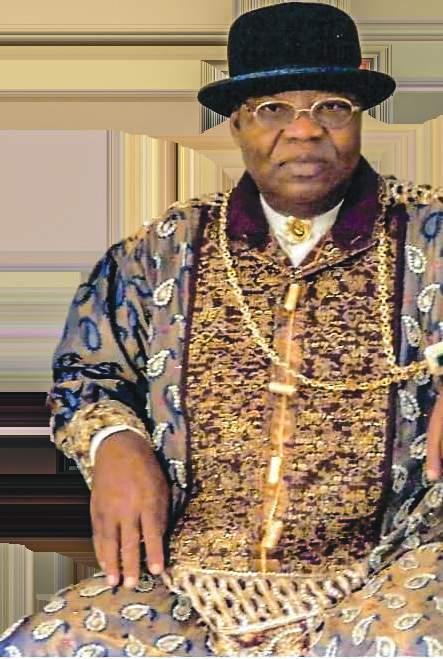

Emmanuel Addeh writes that despite the pledge by the Nigerian Ports Authority (NPA) to undertake emergency maintenance and dredging of critical sections of the Escravos channel, the organisation has failed to do so, months after.
Following years of complaints by operators using the Escravos Channel, around Warri, the NPA in October last year, promised to carry out the ‘desilting’ of the water route within 16 months, to ameliorate the challenges faced by the users.
But a follow-up by THISDAY has shown that nothing has been done in the last four months to make that commitment a reality, in spite of the assurances by the government organisation.
While the maintenance of the critical artery should be routine, however, it has been facing a recurring problem of clogging, without the authorities making any significant effort to make the passage of the route by business owners easier.
Since the Bola Tinubu administration took over the reins of power in May 2023, the government has boasted of removing all the bottlenecks hobbling foreign and local investment in Nigeria. Many observers see the problems on the Excravos route as a test case for that much-talked-about commitment.
Indeed, the channel, a major waterway in Nigeria, has been experiencing severe congestion due to its shallow depth, causing large vessels to get stuck. This has resulted in significant disruptions to shipping and trade activities in the region.
Despite the urgency of the situation, the government has been criticised for its inaction in addressing the issue. The congestion has had far-reaching implications for the country’s trade and commerce. Besides, the government has failed to act decisively to address the issue, raising concerns among stakeholders, including shippers and business leaders.
In spite of the award of a contract for remedial dredging of the channel, aimed at reviving the port and improving maritime trade in the past, the delay in implementing the project has only added to the frustration of stakeholders.
Aside from resulting in significant revenue losses for the Nigerian government, the lack of urgency in resolving the issue has led to increased costs for shippers, importers, and exporters, thereby reducing Nigeria’s competitiveness in the global market.
The congestion at the Escravos channel is also capable of leading to environmental degradation, including oil spills and pollution, thereby posing health risks to communities living around the channel.
For years, shippers and importers have expressed frustration over the delay in resolving the issue, which has affected their businesses and by extension the country’s economy.
Stakeholders are therefore calling for urgent intervention from the government to resolve the issue, while plans should be made for a long-term solution to address the root causes of the clogging. To break it down, the Excravos channel, which apparently appears to have been abandoned, connects the Niger Delta to the Atlantic Ocean and plays a critical role in Nigeria’s oil and gas exports, as well as cargo transportation
The removal of the sediments and debris from the channel will ordinarily increase the depth of navigation channels, anchorages, or berthing areas to ensure the safe passage of boats and ships. This is because vessels require a certain amount of water in order to float and not hit the bottom. Since massive ships carry the bulk of the goods imported into Nigeria, dredging plays a vital role in the nation’s economy.
Several factors have contributed to the clogging of the Escravos Channel, according to checks by THISDAY, including siltation, wherein the channel’s shallow depth and slow currents allow sediment to settle, reducing its navigability.
This challenge at the Excravos water route has further been worsened by poor maintenance as well as the much talked

about climate change, leading to rising sea levels and increased storm frequency which worsen coastal erosion and sedimentation. This severe clogging comes with its economic and environmental implications, including reduction of cargo capacity as vessels must lighten loads, thereby increasing transportation costs.
In addition, not unclogging the route increases transit time, since, as expected, ships face delays, affecting supply chains, resulting in economic losses, reduced trade volumes and increased costs which have harmed local businesses, leading to job losses.
When THISDAY sought to get an update, those in the know said that nothing was being done on the water route, except for a dredger that was parked on the site for sometime before it disappeared abruptly without doing any work.
“The dredger just parked there, it didn’t do anything. So, the next thing we’re hearing is that that dredger has gone, left that place. It’s no longer there. So basically, nothing has been done. Now, we’re wondering if they were paid for the job and didn’t do it, or they weren’t paid for the job, or they are having challenges.
“ Whatever it is, that problem needs to be addressed because it’s affecting all the businesses on that terrain. So, the long and short of it is that the dredging was not done. Even though they pretended to have brought the dredger, purportedly for that purpose, the dredger did not work.
“What people are noticing now is that the dredger has even been taken away. It’s no longer there. And the challenges have remained. And nobody is saying anything, nobody is giving us any feedback as to why this has
happened,” one user of the Excravos route told THISDAY.
Therefore despite NPA’s assurances as of October when the organization was reached, that it would carry out the emergency work within 16 weeks, THISDAY learnt that work had not even begun as of January 9, 2025.
When the NPA was reached the first time this story was published in October, the organisation listed the various efforts it had made to solve the problem, describing the Excravos Channel issue as ‘peculiar’. It therefore promised to carry emergency works, a pledge it has not kept.
“The contractor has concluded the in-survey and is already mobilising to site. It is expected that the campaign would be completed within 16 weeks. Once concluded, it would provide the much needed temporary respite pending the completion of the rehabilitation of the breakwater which would then be followed by regular/ routine maintenance of the entire channel,” NPA spokesman, Ikechukwu Onyemekara, said at the time.
He added: “The Warri/Escravos Channel is quite peculiar in the sense that its dredging must of necessity be preceded by reconstruction of the Escravos breakwater which had collapsed and is resulting in unprecedented rate of silt at the entrance of the Channel.
“Fortunately the federal government has approved the Authority’s inclusion of the comprehensive rehabilitation of the breakwater in the Port Modernisation Programme which is to be implemented shortly,” the NPA spokesman stressed.
He added that the rehabilitation, once achieved, will pave the way for regular and
routine maintenance dredging for the entire channel. According to him, the last time a dredging campaign that specifically targeted the critical entrance area covering over 21.0 kilometres was in 2022.
Onyemekara recalled that the Authority made a case for urgent federal government intervention and had secured administrative approval to undertake maintenance dredging in the most critical section of the channel on an emergency basis. As a measure of ensuring business continuity, the Authority, he said, had approved the ‘lightering’ of vessels laden with products to minimise incidences of vessel grounding and facilitate easy evacuation where violations of the advertised draught results in grounding.
“In addition to the above is the Authority’s enhanced installation of navigational aids/ buoys and robust stakeholder engagement with the host community and shipping lines to adhere to the ‘mitigatory’ measures being put in place to make the best of the situation,” he stated in the response.
But operators have said that nothing has changed since then, insisting that the NPA has not been helping matters, but instead, has been compounding the problem. The NPA aside, failing to do its job, they complained, is also delaying and frustrating other genuine efforts aimed at getting the job done in the interest of Nigeria.
By the law setting it up, the NPA plays a crucial role in maintaining the nation’s waterways, including the Escravos Channel. Although there have been attempts in the past to address the challenge, they have not borne the expected fruits, especially since it is not conducted regularly.
If the NPA does what is statutorily expected of it, this will improve navigation and reduce transit times, increase cargo capacity and reduce transportation costs, enhance economic growth and competitiveness as well as protect the environment by reducing sedimentation.
The operators insist that several vessels have been running aground in the channel, further compounding the mess, because the NPA, which should ensure the orderly movement of vessels around the area, has largely shirked its responsibility.
“Typically, this is the channel that allows access into the Warri port and there are multiple users. It is also a channel that provides access for the tankers that bring in Premium Motor Spirit (PMS) for the country.
“NNPC is a key user because those are tankers that are commissioned by them. Now, with regards to crude oil production for the country, some of the assets in the western Niger Delta corridor also convey crude oil from the fields via mid-range tankers shuttling from the asset through the channel to offshore locations for export.
“This channel, over the years as is typical with nature has been silted. So, increasingly, it has been difficult for vessels to navigate and once aground will require assistance to re-float with high-powered tug boats, ” THISDAY was told.
In the past, several ocean-going vessels had run aground within the same axis. It was further learnt that since the maximum draft at the channel during high tide is about 6.2 meters, many vessels now routinely get stuck in the area, leading to loss of huge revenues, including expenditure on heavy machinery for towing the affected vessels.
Before they are towed, these vessels are said to block the entire channel, thereby making it impossible for other vessels to move along the route for sometimes as many as 10 days, leading to significant financial losses to users and government. This problem is now a crisis and must be addressed now. If the NPA isn’t competent enough to deal with this (as the case appears to be now) then the Government should find other ingenious ways to deal with the crisis.

Acting Group Politics Edito r DEJI ELUMOYE
Email: deji.elumoye @thisdaylive.com
08033025611 s M s O n LY

Mary Nnah writes about the recent 65th birthday celebration of Lagos politician, Senator Ganiyu Olanrewaju Solomon, during which prominent politicians and associates from the Centre of Excellence and beyond eulogised the grassroots mobiliser from Mushin.
Senator Ganiyu Olanrewaju Solomon’s 65th birthday celebration was a grand affair, attended by the crème de la crème of Lagos politics and beyond.
The elaborate prayer session held recently at the prestigious High Point Event Centre and Suites in Ikeja, Lagos, was a tribute to the senator’s influence and respect within the political circle.
As a cerebral and shrewd politician, Senator Solomon has built a reputation for his leadership qualities, collaborative approach, and commitment to public service.
His political career spans over two decades, with notable achievements in the executive and legislative arms of government.
From his early days as Chairman of Mushin Local Government Council to his tenure as a Senator representing Lagos West Senatorial District, Solomon has consistently demonstrated his ability to connect with the people and deliver on his promises.
The event was graced by notable dignitaries, including former governors, deputy governors, senators, and members of the House of Representatives.
Deputy Governor of Lagos State, Dr. Obafemi Kadri Hamzat, fondly referred to Senator Solomon as “Egbon mi” (my elder brother), highlighting their long-standing relationship. Hamzat’s words were echoed by other speakers, including the Speaker of the Lagos State House of Assembly, Rt. Hon. Mudashiru Obasa, who praised Solomon’s steadfastness and loyalty to the All Progressives Congress (APC).
Solomon’s father, Alhaji Rafiu Solomon, was a prominent figure in Lagos politics, and his influence paved the way for his son’s entry into politics. Alhaji Rafiu Solomon was a contemporary of second Republic governor of Lagos state, late Alhaji Lateef Jakande, and his political dominance was felt throughout the Centre of Excellence. Senator Solomon had since carved out his own path, earning the respect of his peers and constituents.
Throughout his career, Solomon popularly called GOS by his political associates, has demonstrated his commitment to public service, sponsoring several bills and motions while in the Senate.
His leadership roles, including Chairman of the Senate Committee on Capital Market and Minority Whip, are a hallmark of his capabilities and dedication. Some of the notable bills he sponsored included the Amendment of the National Directorate of Act, Electronics Commerce, Whistle blowers Protection, Institution of Capital Market Registrars‘, Elderly Centre, Cancer Research and Treatment Centre, among others.
As Senator Solomon marked his 65th birthday, it is clear that his legacy is already etched in gold. His selfless service, collaborative approach, and commitment to the well-being of his constituents have earned him a special place in the hearts of many.
The birthday gig was also attended by Islamic scholars and clerics, who offered prayers and supplications for the senator’s continued good health and prosperity.
In his remarks, former Governor of Lagos State, Babatunde Raji Fashola, shared a memorable encounter with Senator Solomon, highlighting his humility and dedication to public service. Other dignitaries, including the National Missioner of Ansar-Deen Movement of Nigeria, Sheikh Abdul-Rahman Ahmad, and the Chief Imam of Lagos State, Sheikh Sulaimon Abunolla, also eulogised Senator Solomon’s contributions to the development of Lagos State and Nigeria as a whole.
Senator Solomon’s political journey has been marked by several notable milestones.
In 1997, he contested for a seat at the Lagos State House of Assembly under
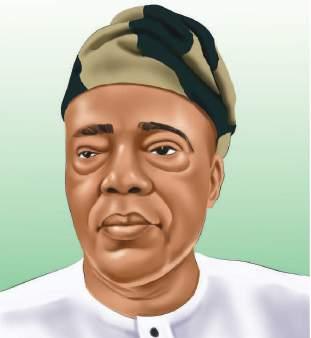
the platform of the Democratic Party of Nigeria (DPN). Although the election was truncated by the death of General Sani
Abacha, Senator Solomon’s determination and resilience were evident. He went on to contest for the chairmanship seat of
Mushin Local Government in 1999, winning the election convincingly.
In 2003, Senator Solomon contested for the Senate under the platform of the Alliance for Democracy (AD), but lost the primary election to Senator Tokunbo Afikuyomi. Undeterred, he went on to contest for a seat in the House of Representatives, representing Mushin Constituency 1. His determination and perseverance eventually paid off in 2007 when he was elected into the Senate to represent Lagos West Senatorial District.
Solomon holds a prominent position in the Governor’s Advisory Council (GAC), the apex decision-making body of the All Progressives Congress (APC) in Lagos State. As a respected member of the GAC, he plays a crucial role in shaping the party’s policies and direction in the state.
In addition to his role in the GAC, Solomon also serves as the apex leader of The Mandate Movement (TMM) in Mushin and Odi-Olowo, further solidifying his influence and leadership within the party. As the event came to a close, it was clear that Senator Ganiyu Olanrewaju Solomon’s 65th birthday celebration was not just a milestone, but a celebration of his enduring legacy and impact on the lives of those around him.
His commitment to public service, his collaborative approach, and his dedication to the well-being of his constituents have earned him a special place in the hearts of many. As he continues to contribute to the development of Lagos State and Nigeria, his legacy will continue to inspire future generations.
Etim Etim writes about the the political interests associated with the visit of Governor Monday Okpebholo of Edo State to the President of the Senate, Senator Godswill akpabio in Uyo, akwa Ibom State recently.
Governor Monday Okpebholo of Edo State flew into Akwa Ibom State late in the afternoon of Saturday, December 28, 2024 to visit the President of the Nigerian Senate, Senator Godswill Akpabio and express his profound gratitude for the singular role the senate president played in his emergence as governor in the September 21 election.
But the visit has left in its wake a swirl of political undercurrents in both Akwa Ibom and Edo States.
In Akwa Ibom, many APC chieftains are peeved that they were not invited to receive the Edo governor at Akpabio’s residence in Uyo and the dinner that was later hosted for the governor at Sheraton Hotel, Ikot Ekpene. For many, it is a further proof that the party is still as divided as it has been for years.
In Edo, the visit reverberated in a different way, setting off discussions about Akpabio’s second term bid as Senate President and a possible challenge from Senator Adam Oshiomhole. The 2027 political season is unfolding in a rather dramatic way.
Unknown to many, Akpabio is the main reason Okpobholo is governor today. On February 17, 2024, Dennis Idahosa, a member of the House of Representatives was declared winner of the Edo State APC governorship primary. Backed by Senator Oshiomhole, Idahosa polled 40, 483 votes, beating other candidates. But it was a very controversial nomination process. Although the result was disputed by all other contestants, Idahosa’s main political weakness was that he is from Edo South Senatorial District, the same district the outgoing governor, Godwin Obaseki, comes from. And that’s where Akpabio, ever so quick to identify opportunities, comes in.
The Senate President reckoned that since the PDP’s candidate, Asue Ighodalo, is from

Edo Central which was favoured by the zoning arrangement, and the APC and Labour Party’s candidates are from Edo South, the chance of PDP retaining victory was very high.
Akpabio reasoned that APC’s chance would be brighter if the party fielded a candidate from Edo Central. But what could be done at this stage since a primary had already been held?
Mid morning that February, Akpabio rushed to the Villa to discuss the dilemma with Vice President Kashim Shettima (President Tinubu was away on a foreign trip). He briefed the Vice President on the need to replace Idahosa with a candidate from Edo Central. The VP listened attentively to Akpabio, but was not willing to go with Akpabio’s recommendation, apparently because he did not want to offend Oshiomhole.
Undaunted, Akpabio then got on the phone and spoke to President Tinubu who was in Ethiopia. He marshaled out his the merits of replacing Idahosa from Edo South with another candidate from Edo Central because of the zoning arrangement and the fact that Idahosa is from
the same zone as the exiting governor.
‘’The President was convinced by Akpabio’s arguments, but on the condition that Akapbio must see to the victory of APC in the election’’, a well-placed source told this writer. Akpabio assured the President that he would pull all stops to clinch victory.
The President then called Dr Abdullahi Ganduje, the party’s National Chairman, and instructed him to organize another primary. The Senate President tapped Godwin Okpeboloh, who was then a nondescript member of the Senate, to enter the race. To take care of Oshiomhole’s interest, it was decided that Idahosa will now become the deputy governorship candidate to Okpebholo.
But why was Akpabio so concerned with Edo election and the choice of APC’s candidate? The answer is self preservation. If Senator Oshiomhole returns to the Senate in 2027, he is likely to challenge Akpabio for the Senate President position. So, in Akpabio’s calculation, it was politically expedient to whittle down Oshiomhole’s influence by denying him the opportunity to produce the governor. Akpabio only capitalized on Oshiomhole’s support for Idahosa.
“It was a smart political calculation by Akpabio and the Senate President had to relocate to Edo State throughout the campaigns just to ensure that Okpebholo won as President Tinubu told him’’, said an APC chieftain who was part of the intrigues. Akpabio’s maneuvers to get Okpebholo elected typify the kind of cold calculations that our political leaders bring up just to sustain and promote their self interests.
-Etim writes from Lagos.

L-R: Chief of Staff to the President, Femi Gbajamiabila, discussing with Lagos State Commissioner of Police, Olarewaju Ishola, during President Bola Ahmed Tinubu arrival at the presidential wing of the Murtala Muhammed Airport from Enugu… recently
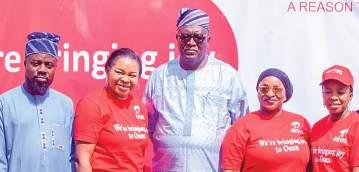
L-R: Super Mini Franchise Partner for Osun State, Alhaji Olaniyi Olawale Lukman; Regional Operations Director (West), Airtel
Pat

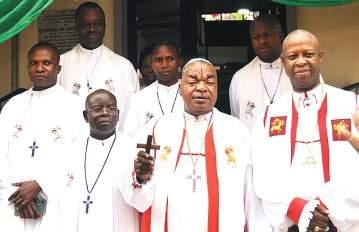
L-R: Proto Presbyter, Methodist Church of Nigeria, Very Rev. Dr. Jonathan Osin; Prelate, Methodist Church Nigeria (MCN), His Eminence Dr. Oliver AlliAba; Secretary of Conference, Rt. Rev. Dr. Babatunde Abiodun Taiwo; and other clerics, during the 20245 New Year Service at Methodist Church of Trinity, Tinubu, Lagos... recently

The Chief of Staff to Osun State Governor, Alhaji Kazeem Akinleye (left), and his wife, Dr. Bilikisu Olayemi Akinleye, during their 20th wedding anniversary ceremony held at their residence in Ede, Osun State… recently

www.thisdaylive.com


opinion@thisdaylive.com
The Nigerien leader should seek mutual cooperation instead of engaging in blame-game, argues THEOPHILUS ABBAH
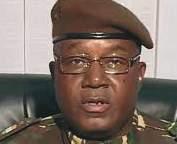
See page 20
JOSHUA J. OMOJUWA argues that there is a cost to every action or inaction
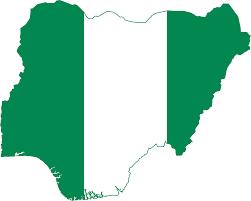
See page 20

UDU YAKUBU contends that Badenoch’s remarks on the north are deeply flawed

When Kemi Badenoch, the current leader of the Conservative Party (also called Tory) in the United Kingdom, set out on a spree of denigrating her home country, Nigeria, she didn’t just stop at blurting out unpalatable remarks about the political, economic, or social conditions in the country; she also delved into bitter tribal politics, declaring that she is Yoruba and has nothing in common with the northern part of Nigeria. According to her, northern Nigeria is a haven for Islamism and Boko Haram. She expressed dismay at being identified as Nigerian, stating, “I find it interesting that everybody defines me as being Nigerian. I identify less with the country than with the specific ethnicity (Yoruba). I have nothing in common with the people from the north of the country, the Boko Haram where Islamism is. Being Yoruba is my true identity, and I refuse to be lumped with the northern people of Nigeria, who ‘were our ethnic enemies,’ all in the name of being called a Nigerian.”
Her statements reflect a broader, often unspoken disdain that many southerners harbour towards the north and northerners. This attitude reeks of superiority and condescension, a pervasive blight on Nigeria’s national identity. Badenoch’s rhetoric does not just betray personal ignorance; it exposes a deeper prejudice entrenched in southern elitism and street sentiments. It is high time that this despicable mindset is called out for what it truly is: a baseless and damaging illusion of superiority.
By declaring that she does not see herself as Nigerian but as Yoruba, Badenoch aligns herself with a cohort of southern elites who perpetually detach themselves from national identity to stroke their ethnic egos.
Her description of the north as a “strange entity” not only dismisses the rich cultural and historical heritage of the region but also amplifies toxic stereotypes that portray the north as backward, violent, and unworthy of respect. Such rhetoric is not just insulting; it is inflammatory and unbecoming of anyone claiming intellectual or moral leadership.
This tension between northern and southern Nigeria is not new. Historically, it dates back to colonial policies that emphasized regional differences. The British colonial administration’s “indirect rule” system entrenched the north’s Islamic cultural identity while fostering a more Westernized socio-political structure in the south. These distinctions laid the groundwork for mutual distrust and stereotypes that persist today. Post-independence, this narrative has evolved with southern Nigeria often positioning itself as the more “civilized” part of the country, casting the north as a region needing “enlightenment” or “rescue.”
This superiority complex—that the south is more “enlightened,” more “progressive,” and better governed—has long been the anthem of the southern intelligentsia. Yet, the same south that boasts of its “progress” is riddled with corruption, insecurity, and underdevelopment. Its leaders, intellectuals and media practitioners-cum-propaganda

trumpeters reserve their sharpest critiques for the north, ignoring their own failures while branding the north as irredeemable.
Badenoch’s disassociation from Nigeria in favour of her Yoruba identity is emblematic of this divide. Her choice of words, calling northern people “our ethnic enemies,” is not only divisive but also indicative of how deeply ingrained these prejudices can be, even among those who have risen to high echelons within and outside Nigeria. Her attempt to conflate the entire north with Boko Haram is a perfect example of being intellectually stunt and indolent. Northern Nigeria is much more than just the Boko Haram insurgency. The region is made up of 19 states, with Boko Haram primarily operating in only three states— Borno, Yobe, and Adamawa—during its peak. At the close of the Buhari administration in May 2023, they had been critically confined to just the Lake Chad area. Reducing an entire region to the actions of a few extremist elements is not only unfair and uncharitable, but dangerous. It fosters division and perpetuates ignorance, traits unbecoming of someone who claims to represent rational thought. In actual fact, it smirks of racist thinking and strategy.
This regional bias and attitude manifests across multiple sectors of Nigerian society— from governance to economy, religion, and education. Common tropes paint northerners as uneducated, violent, and resistant to progress. These portrayals dehumanize an entire population and create barriers to understanding and empathy. In politics, criticism of northern leadership often operates on a double standard, where northern leaders face heightened scrutiny compared to their southern counterparts. Southern leaders frequently frame their northern peers as unfit for leadership, ignoring achievements and advancements made in northern states, even when southern leaders fall woefully short by comparison. This disparity in evaluation criteria suggests an ingrained bias that transcends objective assessment of governance and policy implementation. Economic discourse also reveals these biases. Southern critiques often ignore the north’s significant agricultural and mineral wealth, focusing instead on poverty statistics without considering historical economic injustices or current efforts at industrialization.
David Babachir Lawal’s article, “How
Tinubu’s Tax Reform Bills Expose Southern Disdain for North,” highlights how southern elites consistently undermine northern contributions. This tendency to attribute northern development challenges to inherent deficiencies rather than examining the historical and structural inequalities driving them reflects a deeply flawed mindset.
In education, the narrative persists. There is a prevalent belief in the south that northern education systems are inferior, with little acknowledgment of efforts like the Almajiri system reform to bridge gaps. Till today, many southerners are shocked when they hear a northerner speak standard British English, sometimes just as shocked as medieval Europeans who thought that Africans lived on trees. As Mark Amaza observes in his article, “Inaccurate View of the North by Southern Nigerians,” he is often asked, “How come you speak such good English?” The implication is that southerners expect northerners to speak less proficient English, or perhaps assume they should speak Arabic instead. This expectation stems from the stereotype that northerners are inherently less learned.
Cultural condescension is another pervasive issue. While “Aboki” as a Hausa word literally means friend, it has come to be used as a slur in southern Nigeria. In both Nigerian music and movies, “Aboki” is caricatured as an intellectually challenged, illiterate character whose stupidity is a source of entertainment. Truthfully, Hausa vendors and artisans are not called “aboki” because they are friends— it’s a condescending way of referring to a stereotyped group. Why then don’t southerners call random educated members of the same ethnic group “aboki”? The answer lies in prejudice.
The media amplifies these narratives. Their stories reek of generalisations and prejudices often associated with most analyses by a section of Western media and commentators. They view Nigeria with their jaundiced lenses, describing the country as made of a Muslim North and Christian South, oblivious of the various Christian minorities in the North and, the plethora of Muslims in the South, and the multiplicity of ethnic groups in the two divides that make a mockery of any analysis of a monolithic North or South. They view Africans with many unproven, unorthodox assumptions, in much the same way that many southerners view northerners and the North. Southern-dominated outlets often depict the north as a hotbed of violence, poverty, and illiteracy, glossing over similar or even worse issues in southern states. For example, while northern leaders are scrutinized for governance failures, their southern counterparts frequently escape equivalent criticism despite comparable or worse performances. Issues like Boko Haram are framed as defining the entire north, whereas militancy in the Niger Delta and the atrocities of IPOB in the southeast receive nuanced coverage.
Dr Yakubu is a biographer and publisher. He can be reached at: udu.yakubu@gmail.com

The Nigerien leader should seek mutual cooperation instead of engaging in blamegame, argues THEOPHILUS ABBAH

Nigerien President Abdourahamane Tchiani, in a video circulated in many parts of Nigeria and West Africa, breached the long-standing cordial relationship between Niger Republic and Nigeria since the two countries gained independence in 1960. For over 60 years and in their interactions with the ten previous civilian and military presidents of the Francophone country, Nigeria and Niger Republic have been engaged in mutual respect for each order, socio-economic diplomacy, security and military collaboration against non-state actors working against the two sovereign states.
President Tchiani’s outburst against Nigeria’s officials, including National Security Adviser (NSA) Nuhu Ribadu and former Director General of the National Intelligence Agency [NIA] Ambassador Ahmed Rufai Abubakar was a strange aberration from the cooperation between the two countries over the years.
Without concrete evidence, the Nigerien leader accused Nigeria of colluding with France to destabilize his country, claiming that France had made a substantial payment to President Bola Tinubu to establish a military base in Nigeria. The military ruler whose country has been collaborating with Nigeria to fight Lakurawa terrorist group, ironically also alleged that Nigeria was aware of the formation of that organization and deliberately chose to ignore it. Additionally, Tchiani accused Nigeria of seeking to sabotage the Trans-Saharan gas pipeline and disrupt agriculture in Niger.
It was clear to the discerning mind that Tchiani’s objective for releasing the message was to create disaffection between the Nigerian people and the federal government. An indicator for this was the fact that he spoke in Hausa Language, an attempt to send the message to the majority of the Nigerian people who populate the seven states that have cultural, religious and linguistic affinity with Niger Republic in both the North-West and North-East of Nigeria. The states include Katsina, Kano, Jigawa, Zamfara, Borno, Yobe and Kebbi. The two countries’ relationship predated the colonial era. The Hausa, Fulani, Kanuri, Shuwa Arab, Zabarmawa, Arawa, Kabawa and other ethnic groups in the North share a lot in common with the people of Niger Republic. President Tchiani was not unaware of this depth of relationship. He capitalised on it to whip up sentiments against the Tinubu administration.
Considering this affinity, over the years, Nigeria has provided significant support to Niger Republic. In the area of security, Nigeria and Niger have collaborated closely, particularly in combating Boko Haram and other terrorist groups in the region. Joint military operations and intelligence sharing have been key components of that cooperation. Nigeria has provided economic aid to Niger, including financial support and development projects aimed at improving infrastructure and boosting economic growth. Nigeria has offered humanitarian assistance to Niger, especially during times of crisis, such as droughts and food shortages. This aid has included food supplies, medical assistance, and other essential resources. Diplomatically, the two countries have maintained strong diplomatic ties, with regular high-level visits and meetings to discuss bilateral issues and strengthen their relationship.
It is unthinkable, therefore, that a country that has done so much for Niger Republic would collaborate with France and a terrorist organisation to sabotage Niger Republic’s oil

export. Nigeria was actively involved in ensuring that the oil refinery took shape. Nigeria's Ministry of Petroleum Resources and Niger's government signed agreements to design and construct the refinery. Why would Nigeria sabotage the project for which it has made significant financial contribution?
The trouble with Tchiani is that since he took over power on June 26, 2023, he has been unable to fulfill the promises the military junta made to the people of Niger Republic. Many Nigerien citizens are frustrated with the economic situation. They feel that the government has failed to address poverty and unemployment effectively. This has led to uncertainty and a lack of trust in the government. Tchiani's allegations against Nigeria and France have been seen by some as attempts to divert attention from his administration's shortcomings.
Since he made those allegations, some journalists have taken the trouble to visit Kebbi State to find out if there was a French military base in that part of Nigeria. Clearly there was none. President Tchiani’s claims lacked evidence. The Nigerien leader is facing the reality of the fact that a military coup is not an end in itself when it comes to providing the kind of leadership his country deserves. Being president requires hard work and statecraft.
Niger Republic, Mali, and Burkina Faso have pulled out of the Economic Community of West African States (ECOWAS) and driven French, UK and European Union security personnel from their countries. Those are populist actions, which are not enough to salvage their countries, as they must have found out by now. They must be engaging other countries on strategic security and economic issues. Nigeria, on its part, has pledged support for Niger Republic. The two countries must come together through bilateral and multilateral cooperation to deal with common challenges. For instance, the Multinational Joint Task Force remains the military agency that can tackle the Lakurawa terrorist group. The right way to deal with the situation is for Nigeria and Niger Republic to unite on that front to deal with the terrorist group. It is good that the Nigerian government has stretched its hand of fellowship toward Tchiani. The Nigerien leader must not allow the opportunity to work with Nigeria to slip away. He must seek mutual cooperation instead of engaging in baseless blame-game.
Abbah, PhD, is a newspaper editor and academic
JOSHUA J. OMOJUWA argues that there is a cost to every action or inaction

You could sum up a population in two ways: they are playing for the immediate gratification of short-term rewards or they are doing the work knowing that whilst the reward may not come immediately, it will some day come. Shorttermism often benefits a few at the expense of the lot. In the long term, other things being equal, more people benefit.
Can you name the country where live Premier League matches aren’t shown in the afternoon, especially between 2:45pm and 5:15pm?
Chances are that you’d probably name a North Korea. And even if you were given options, say to choose where there is a blockade of showing live Premier League matches on TV in that time belt on Saturday, amongst one of say Cuba, Vanuatu, the United Kingdom and Mongolia, chances are that you’d pick anyone of those countries apart from the U.K. itself.
You cannot watch live Premier League matches in England on Saturday afternoon, but you can watch same in virtually every city and country around the world. That sounds like an anomaly until you dig a little into it. If you are thinking the matches aren’t shown because they want people to go watch in the stadiums, then you probably do not know the depth of the English people and their obsession with football. No, the blockade isn’t so people won’t choose to watch on TV over going to the stadium. There are more than enough bums to fill the stadium seats whilst the pubs are simultaneously filled up any given Sunday.
There is something bigger at play here that should teach any serious people or country how to protect their own from being destroyed by their inability to see beyond immediate gains.
Bizarre as it may sound, majority of live Premier League matches are not broadcast live on a regular football weekend. The football establishment reached an understanding with broadcasters to do things this way to protect the attendance of amateur and other forms of non-professional football. In essence, those who would have been home to watch say Arsenal whack Chelsea on TV have to make do with watching Hereford Pegasus play Highworth Town at a nearby pitch.
The unintended consequence of having the league live at the same time as most non-league and other such level of football is that football in the UK would have been killed by the Premier League itself. Can you imagine what it must have taken to reach that understanding? Because take it or leave, that decision comes at a cost to some businesspeople, especially in the short-term, but it does benefit virtually everyone in the long term. That includes the businesspeople that’d have immediately benefited from having the people watch the live games on TV.
I posted a casual tweet about someone who was on a N60,000 salary spending N1.7m on a wedding, who then came to me to ask for a N300,000 loan. I asked the person, why they spent such an amount on a wedding considering their monthly pay. They said it was part of the traditional requirements where they come from.
I asked if those who married but never had to spend such money have since been buried. In the end, I gave a loan I’d never look back to see if it gets paid or not. This clear note on judgment and decision making took a different turn on Elon Musk’s X.
There was an unusual number of people who insisted that it was fine to have the wedding because it only happens once in a lifetime.
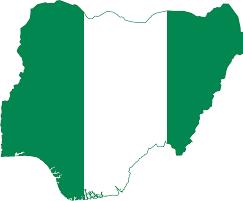
Shocked as you may be to read this, this was not just a few people. As far as they were concerned, it was just fine to spend N1.7m on a wedding if you are on a N60k salary and whoever was going to loan you money after such a self-defeating decision should dare not ask you about your sense of judgment when it comes to spending money.
This is not unusual. We are breeding quite an unusual number of people who cannot connect their decisions today to the kind of life they will live tomorrow. They’d rather enjoy now, and then hope that tomorrow rescues them from their poor decisions.
And that thing about “societal pressure” is just an excuse for your own lack of judgment. The only pressure there is the one you assume on yourself. People who cannot connect their decisions today to their reality tomorrow will always be on life’s receiving end.
Nigeria has had challenges with corruption through the years. That act itself is on account of a culture that elevates immediate personal satisfaction over the collective good. That the people in government have changed through the decades and the culture remains suggests that there is something in our society that indicates that corruption is not just the disease of those in government.
That said, whilst corruption has cost and bedeviled us, at no time did we literally elevate it into law. What we made law are policies that sought to pacify us today that in truth we end up reeling from their consequences tomorrow. The cheaper dollars and their many effects, the free train and bus rides, the endless privileges for office holders, the endless subsidies. We engage in these pastimes, pretending that the future will handle itself.
When the future does, it reflects in the poverty we continue to see entrenched. Countries that could not compare to our per capita income and GDP have now become examples for us to follow. Amidst this, we still have not come to any realization; that there is a cost to every action and inaction. We destroyed our schools; we now pay out of our noses for foreign education. We destroyed our health care system, to the point we now prefer medical care abroad… in a nutshell, we destroyed our country and now everyone lives or hopes to live abroad. That’s not as much a tragedy as the fact that many still cannot connect today’s realities with yesterday’s poor decisions.
Omojuwa is chief strategist, Alpha Reach/BGX Publishing

Editor, Editorial Page PETER ISHAKA
Email peter.ishaka@thisdaylive.com
Health authorities could do more to stem the menace
One of the most neglected public health problems in Nigeria today is snakebite which reportedly has a mortality rate of 12 per cent. More disturbing is that despite hundreds of people dying in the country annually from snakebites, authorities in the health sector do not take the challenge seriously. From north to south, inhabitants of our rural communities are frequent victims as they go about their daily food production and animal rearing activities, and sometimes even in the comfort of their homes. Unfortunately, many of these snakebite cases go unreported and thus do not appear in official epidemiological statistics. Besides, most health workers have little or no formal training in the management of snakebite.
According to the World Health Organisation (WHO), snake bite particularly affects the most vulnerable members of society which is why appropriate policies need to be put in place to tackle the menace. Perhaps the problem is economic. Treating snakebite requires at least two vials of anti-snake venom but with one vial costing as much as N85,000, most Nigerians in rural areas cannot afford the medication. While many resort to traditional healing methods, the absence of any structure makes them risky. States with the most cases of snakebite are Gombe, Plateau, Adamawa, Bauchi, Borno, Nasarawa, Enugu, Kogi, Kebbi, Oyo, Benue, and Taraba.

how snakebite can be deadly if not treated quickly. While the right anti-venom can save a snakebite victim’s life, getting to an emergency room as quickly as possible is also very important. If properly treated, many snake bites will not have serious effects. But the cost seems prohibitive. Since most of the victims are mainly subsistence farmers, it is important for the government to subsidize the treatment or make the anti-venom available in primary healthcare facilities. Besides, government, at all levels, must strengthen public clinics and hospitals as well as engage residents of rural communities in enlightenment campaign on preventive measures.
Snake bite affects the most vulnerable members of society which is why appropriate policies need to be put in place to tackle the menace
T H I S D AY
EDITOR SHAKA MOMODU
DEPUTY EDITOR WALE OLALEYE
MANAGING DIRECTOR ENIOLA BELLO
DEPUTY MANAGING DIRECTOR ISRAEL IWEGBU
CHAIRMAN EDITORIAL BOARD OLUSEGUN ADENIYI
EDITOR NATION’S CAPITAL IYOBOSA UWUGIAREN THE OMBUDSMAN KAYODE KOMOLAFE

Against the background that guidelines for the prevention and clinical management of snakebite have been developed by WHO/AFRO, we should not be witnessing the number of fatalities being recorded in the country. These guidelines, developed at the request of the federal government two decades ago, are meant to assist health workers to improve medical care for snakebite victims. They are also to serve as a source of information for the public on
EDITOR-IN-CHIEF/CHAIRMAN NDUKA OBAIGBENA
GROUP EXECUTIVE DIRECTORS ENIOLA BELLO, KAYODE KOMOLAFE, ISRAEL IWEGBU
DIVISIONAL DIRECTORS SHAKA MOMODU, PETER IWEGBU, ANTHONY OGEDENGBE
DEPUTY DIVISIONAL DIRECTOR OJOGUN VICTOR DANBOYI
SNR. ASSOCIATE DIRECTOR ERIC OJEH
ASSOCIATE DIRECTOR PATRICK EIMIUHI
CONTROLLERS ABIMBOLA TAIWO, UCHENNA DIBIAGWU, NDUKA MOSERI
DIRECTOR, PRINTING PRODUCTION CHUKS ONWUDINJO
TO SEND EMAIL: first name.surname@thisdaylive.com
Letters to the Editor
In 2011, the federal government promised to make Anti-Snake Venom (ASV) available and affordable but insisted on preventive strategies. That led to the establishment of the Nigeria/UK Echitab Study Group to research and develop ASV, while exploring ways of providing free treatment for snakebite victims. The inauguration of the structure that houses the Echitab Snakebite Control and Research Centre in Kaltungo in Gombe State was part of the collaborative efforts aimed at finding lasting solutions to the menace of snakebite in the country. It has over the years developed three different brands of ASV, using venom extracted from local snakes purposely to address the Nigerian situation. While the idea to increase research activities and prepare room for the development of ASV in the country is good, there is an urgent need for sustained public enlightenment, particularly among dwellers of rural communities. They should be told how to prevent snakebites and what to do as first aid when someone is bitten. To ensure the availability of the ASV before local production of the drugs begins, government should import large quantities. It is also important to train medical personnel to effectively manage cases of snakebite early since the venom usually worsens the health of victims by the minute and increases their likelihood of succumbing to death because of its potency.
Letters in response to specific publications in THISDAY should be brief (150-300 words) and straight to the point. Interested readers may send such letters along with their contact details to opinion@thisdaylive.com. We also welcome comments and opinions on topical local, national and international issues provided they are well-written and should also not be longer than (750- 1000 words). They should be sent to opinion@thisdaylive. com along with photograph, email address and phone numbers of the writer.
A critical thinking workshop held at De-Merry Hills Schools in Ogun state last year stood out because it highlighted three parties essential for critical thinking programs in schools. At the event, students, parents, and teachers were present and actively participated in the workshop. For hours, teachers, pupils, and guardians interacted and exchanged ideas on the meaning and significance of critical thinking. They actively took part in the exercises, in learning and unlearning, in understanding the importance and value of cultivating these mental habits. In discussing critical thinking or lack thereof in schools, much of the emphasis is usually on students or pupils, the focus is on children, learners, and youths. Other parties, parents, and teachers are seldom talked about. As I argue in this piece this approach is flawed and must change if schools must effectively embrace critical thinking and reflective inquiry.
Do not get me wrong. The emphasis on students in fostering reasoned inquiry is in order. Students are a critical factor in the promotion of inquiry based learning. They are at the center of creating critical-thinking schools and societies. Students are the main target in critical thinking based education. They are a key beneficiary. Learners are the main determinant of the success and failure of critical thinking programs. But other parties are also needed.
Other forces are necessary for the critical thinking project to succeed.
These parties are needed because students will not teach themselves critical thinking skills. Students need critical thinking tutors and instructors. Students require those with critical thinking knowledge and expertise. They need those who can effectively deliver the subject, those who can inculcate and help them cultivate these skills. Thus teacher training in critical thinking is necessary because teachers can only teach what they know or understand. More importantly, teachers can effectively deliver what they value and appreciate.
It is pertinent to know that most school teachers did not learn about these skills while they were in school. Many educators or school managers have never heard about critical thinking. They do not know the value. Many teachers only have some superficial knowledge of these skills. Many educators do not appreciate the importance of inquiry-based learning. So teachers and educators need upgrading and capacity building. Training is important to get teachers to understand the value of these skills. Training will help tutors and instructors reskill and upskill. More importantly, training will equip teachers with mechanisms and dispositions to effectively deliver the subject. Teachers need to know how to
assess the students, how to develop critical thinking lessons and exercises, and how to manage critical thinking classes.
In our previous trainings, teachers have registered some legitimate worries. Teachers have expressed many what-if concerns. Critical thinking encourages students to exercise their curiosity and inquisitiveness. Students are trained to ask open-ended questions, to challenge assumptions and authorities including the authority of the teacher. So some teachers have asked: What if students asked me questions that were very difficult? What if students asked me questions that I did not know the answers? What if students asked me questions about some culturally sensitive issues? What if the parents came back complaining that their children were asking too many questions? These behaviors are positive developments and indicative of progress.
Now, that brings us to the next necessary party in fostering critical thinking in schools- parents. Parents are important stakeholders in the education of children. For schools to succeed in promoting critical thinking, parents must come on board and be on board. Parents must buy into the idea.

Chinedu Eze
The Nigeria Civil Aviation Authority (NCAA) and the Airline Operators of Nigeria (AON), have taken stringent measures that will help put an end to the menace of unruly passengers’ behaviour in airline operations in Nigeria.
NCAA and the airlines agreed to battle the menace after a meeting in Lagos, where the airline gave details of how unruly passengers disrupt flight operations, exacerbate flight delays and cancellations.
Passengers, it was learnt, have allegedly beaten up airline staff, including female staff who were married and some of them expectant and some older men who happened to be at the departures when they revolted in protest against either flight delays or cancellation.
AON alleged that passengers had at different times beaten airline staff to coma, severely injured others and noted that they do these only on domestic flights.
The airlines said that the passengers do this because no one has held them to account and most often the staff of the Federal Airports Authority of Nigeria (FAAN) watch them without intervening, when they manhandle airline staff.
AON said what incite the passengers were flight delays and flight cancellation, which prompted some of them to become violent adding that these disruptions can be caused by weather, which is beyond the control of airlines.
During the meeting, the Director General of NCAA, Captain Najomo, said: “Passengers will be educated on their responsibilities as the NCAA
will also be joining airlines to enforce whatever penalties will be applicable for unruly behavior because with rights comes responsibilities.”
On December 19, 2024, United Nigeria Airlines aborted Lagos-Asaba 6:30 am flight when an unruly passenger allegedly assaulted a member of the crew, forcing the airline to ground the flight.
A statement from the airline said it decided to ground the flight after the passenger physically assaulted a crew member at the point of take off when every passenger had boarded the flight and the aircraft door was shut.
“The commotion caused by this passenger lasted a long time and for safety reasons and in accordance with international aviation protocols, the aircraft was grounded, resulting in hours-long delay. Unfortunately, this
disruption may have a reverberating effect on other flights across our network and may cause more delay and cancellations. We are deeply sorry about this,” the airline said.
The Vice President of AON and the Chairman and CEO of Air Peace, Dr. Allen Onyema, narrated how unruly passengers disrupt flights and beat up airlines’ staff.
He recounted how Air Peace Lagos to Kaduna flight was cancelled due to the harmattan haze, “and this was explained to the passengers by the airline. The passengers seem to have understood the situation, but 25 minutes later, some of the passengers came back to the desk of the airline and insisted that they must be airlifted despite the unfavourable weather report.”
“We don’t agree. You must take us to Kaduna, they shouted. They
started protesting and the protest is not just sitting down and saying, no, you must take us to our destination. The target is to disrupt other flights of Air Peace. They will go and target other flights and disrupt them so that those other flights that did not have weather issues in their places will not take off. They did not have anything you can give as an excuse for them. Those people over there will be saying, Air Peace delayed their flight. They will not know that some mischievous people had disrupted the aircraft that will be coming to their stations. We don’t hold it against Kaduna passengers. They have been one of our best. This is orchestrated,” Onyema recalled. He said that similar incident happened when the airline’s flight operated Lagos-Calabar and Calabar-Abuja service, but
in Abuja, it boarded passengers back to Calabar and report from the Nigeria Meteorological Agency (NIMET) indicated that the weather was zero, under which no aircraft could fly safely.
“We informed the passengers about the weather report and they showed understanding. When it indicated that there was no hope that the weather (harmattan haze) would improve, we cancelled the flight. The passengers said that it was better than risking their lives. They got out of the aircraft, went to the building, because we told them to reschedule to the next available date. Less than 30 minutes later, a different thing started happening at the airport.
The Nigerian Maritime Administration and Safety Agency (NIMASA) has reaffirmed its commitment to supporting the National Drug Law Enforcement Agency (NDLEA) in the fight against drug abuse and trafficking within Nigeria’s maritime domain.
Director General of NIMASA, Dr. Dayo Mobereola, stated this during a courtesy visit by the NDLEA Chairman, Brig. Gen. Mohammed Buba Marwa (rtd), to NIMASA in Lagos.
Speaking during the visit, the Director General of NIMASA, Dr. Dayo Mobereola, commended the NDLEA for its remarkable achievements in combating drug-related crimes across Nigeria. He pledged that NIMASA would collaborate with the NDLEA to secure Nigeria’s maritime space against the illicit shipment of drugs.
This is as Marwa proposed close collaboration between NDLEA and NIMASA through the Deep Blue Project, to enhance the protection of Nigeria’s maritime space.
The Deep Blue Project, a joint
initiative of the Federal Ministry of Transportation and the Federal Ministry of Defence, is domiciled in NIMASA with contributions from various security agencies, including the Nigerian Navy, Nigerian Air Force, Nigerian Army, the Nigerian Police, and the Department of State Services.
Marwa expressed his gratitude for the warm reception and emphasized the need for collaboration to address the rising threat of drug trafficking through maritime channels.
“As the agency responsible
for controlling drug abuse and trafficking in Nigeria, we recognize that this task requires collaboration with critical stakeholders like NIMASA. The global maritime space has increasingly become a conduit for the illegal movement of drugs, and we are keen to work with NIMASA to address this challenge.
“Recent seizures of illicit drugs transported through Lagos ports underscore the need for joint efforts to secure our ports. Within the NDLEA, we have established a Marine Command to focus on this
emerging threat. We propose close collaboration between this unit and NIMASA, particularly through the Deep Blue Project, to enhance the protection of Nigeria’s maritime space,” he said.
The NDLEA Chairman also pledged the agency’s support in sensitizing NIMASA staff and cadets under the National Seafarers Development Program (NSDP) on the dangers of drug abuse.
Mobereola assured Marwa that NIMASA would explore avenues to integrate NDLEA personnel into the existing maritime security
architecture, particularly the Deep Blue Project. He stated: “We are glad to welcome the NDLEA team, led by Brig. Gen. Marwa, whose exemplary leadership has brought significant progress in the fight against illicit drugs. NIMASA is firmly committed to partnering with the NDLEA to tackle the menace of drug trafficking, particularly through our nation’s Ports and Terminals. Together, we can ensure that the Nigerian maritime domain is not exploited for criminal activities.”
Stories by Chinedu Eze
Air Peace, Nigeria’s leading airline, recently solidified its commitment to fostering stronger ties between Africa and its global diaspora through its strategic partnership with the Africa Diaspora Investment Network Alliance (ADINA) Summit 2024.
The event, held in Accra, Ghana, brought together a diverse audience of African Diaspora investors, business leaders, and global institutions to discuss and advance the continent’s economic potential.
Accra, a global hub for the
African diaspora every December, provided the perfect setting for the ADINA Summit. The event facilitated conversations around trade, investment, and economic empowerment, positioning the diaspora as a significant force for Africa’s economic transformation. In his address at the summit, Head of Sales and Business Development at Air Peace, Davids Odeyemi, emphasised the airline’s mission to connect Africa and its diaspora. He highlighted Air Peace’s extensive network, which offers seamless travel solutions for diasporans seeking to reconnect with their roots, explore their heritage, and invest in Africa’s
burgeoning markets. Odeyemi also reaffirmed the airline’s role as a driver of intra-African trade, enhancing connectivity to enable the movement of goods, services, and people, thereby creating jobs and fostering economic growth.
Air Peace’s partnership with the ADINA Summit also aligns with its broader commitment to promoting tourism and showcasing Africa’s rich cultural heritage. The airline’s continuous investment in a modern fleet underscores its determination to provide a world-class travel experience, reinforcing its position as a catalyst for African development.
The Nigerian Aviation Handling Company PLC, (nahco aviance) has announced the appointment of Mr. Olumuyiwa Olumekun as the Group Managing Director/ Chief Executive Officer (GMD/ CEO) of the Company effective January 1, 2025.
Olumekun replaces Mr. Indranil Gupta whose tenure expired December 31, 2024.
In a notice to the Nigerian Exchange (NGX) dated 27 December, 2024, the Company Secretary, Mr. Bello Abdullahi, disclosed that “the Board has approved the appointment
of Mr. Olumuyiwa Olumekun as the Group Managing Director/Chief Executive Officer (GMD/CEO) of the Company with effect from 1st January 2025.”
The same notice also announced the retirement of Mr. Indranil Gupta, the former Group Managing Director/Chief Executive Officer of the company.
A seasoned business executive with over three decades of leadership experience across various industries, Olumekun retired as Group Executive Director, Corporate Services at NAHCO Plc

Chinedu Eze
Heads of aviation agencies have suggested new measures on how to mitigate the challenges of poor airport infrastructure and limited personnel that led to flight delays and cancellations in 2024.
in February 2022. During his tenure, he held multiple strategic roles, including acting Managing Director (August 2021 – February 2022) and Executive Director of Corporate Services, where he provided leadership to key functions such as Human Resources, Learning & Development, IT, Administrative Services, Infrastructure, and Procurement and was part of the team that successfully implemented the company’s transformative 2019–2023 strategic plan, which resulted in over a 300 per cent increase in profitability.
Qatar Executive (QE), the luxury private jet charter division of Qatar Airways Group, has announced that it has taken delivery of two additional Gulfstream G700 aircraft, taking its total fleet size to 24.
The two additional aircraft will increase the total number of Gulfstream G700 in QE’s fleet to six, with an additional four G700s scheduled for delivery throughout 2025 and early 2026. QE’s fleet also includes 15 Gulfstream G650ER aircraft.
Qatar Airways Group Chief Executive Officer, Badr Mohammed Al-Meer, said: “We are incredibly proud to continue growing our fleet with the groundbreaking G700, which delivers an innovative and exceptional experience for our customers. These aircraft represent our passion for redefining private aviation and offering the best possible luxury experience in the skies, exceeding the expectations of our esteemed passengers and clients.”
These state-of-the-art aircraft
further solidify QE’s position as a leader in luxury long-range travel and private aviation. They provide customers with the ultimate comfort and performance when combined with QE’s unparalleled service and hospitality.
With its luxurious and spacious cabin, innovative technology, increased fuel efficiency, and longrange capabilities, the QE Gulfstream G700 is a stand out choice in private business aviation charter and has become yet another reason why so
The International Air Transport Association (IATA) has warned that the airport capacity crunch is threatening the freedom for people to travel, and constraining economies, noting that there is little prospect for airport infrastructure to fully keep pace with growing demand.
This is contained in a white paper released recently, which included proposals for how slot regulations must incentivize airports to generate more capacity from existing infrastructure.
IATA stated that the number of airports unable to fully meet the demand for air connectivity and requiring slot coordination using the IATA Worldwide Airport Slot Guidelines has already grown to
nearly 400 worldwide. If current trends prevail, this number could grow by 25 per cent over the next decade.
An example of the severe consequences of this growing problem is evident in Europe where Airports Council International (ACI) Europe expects that airport infrastructure will be unable to meet up to 12 per cent of demand in 2050.
According to IATA’s SVP for Operations, Safety and Security, Nick Careen, “The only cure for insufficient capacity is construction. But as long as large-scale endeavors such as building new runways or terminals remain politically out-ofreach in many parts of the world,
we must squeeze every last unit of capacity out of the infrastructure we have. Some airports set strong benchmarks for maximizing capacity, but too many fail to follow the guidance in the Worldwide Airport Slot Guidelines.”
The newly published IATA White Paper on airport slots calls for stronger obligations on the part of airports to maximise capacity.
“Under the slot regulations, airlines are obliged to utilise the slots they are granted efficiently or face penalties for cancelling flights, or not operating to schedule. But airports face no penalties if they don’t deliver promised capacity,” Careen said.
Group Business Editor
Eromosele Abiodun
Deputy Business Editor
chinedu Eze
Comms/e-Business Editor
Emma Okonji
Asst. Editor, Energy
Emmanuel Addeh
Asst. Editor, Money Market
Nume Ekeghe
Correspondents
Kayodetokede(CapitalMarkets)
James Emejo (Finance)
Ebere Nwoji (Insurance)
reporter Peter Uzoho (Energy)
TD Africa, a leading technology distribution company in Africa, has launched its Green Hero Initiative, an initiative designed to tackle Nigeria’s persistent energy challenges and promote the adoption of sustainable energy solutions.
This initiative underscores TD Africa’s commitment to advancing cleaner, more affordable energy alternatives for Nigerian households and businesses.
As the cost of fossil fuels continues to rise, the urgency for a shift to renewable energy has never been more apparent. Recognising this need, TD Africa has partnered global industry leaders Huawei and EcoFlow to introduce innovative renewable energy solutions tailored to meet the unique needs of Nigerian consumers.
Speaking about the initiative, Business Manager, Renewable Energy Solutions at TD Africa,
Chidiebere Nwabuko, said: “The Green Hero Initiative is more than just a product launch; it’s a commitment to a sustainable future. We are empowering Nigerians to take control of their energy needs, reduce their carbon footprint, and enjoy the benefits of reliable, clean power. By partnering global leaders like Huawei and EcoFlow, we are bringing cutting-edge technology to the market that is not only affordable but also tailored to the specific needs of our customers and Nigerians across the country.”
Through the Green Hero Initiative, TD Africa is offering a variety of renewable energy solutions that cater to diverse energy needs. The solutions include the powerful Huawei ISite Power M, ideal for powering homes and small businesses, and the Huawei ISite Power S, designed for commercial and industrial applications.
The industry stakeholders gave the suggestions at a meeting held in December 2024, organised at the instance of the acting Director General of the Nigeria Civil Aviation Authority (NCAA), Captain Chris Najomo.
That forum offered opportunities for the Managing Director of the Federal Airports Authority of Nigeria (FAAN), Mrs. Olubunmi Kuku, to address the challenges of the agency and other collaborating agencies in order to have seamless and safe flight operations in and out of any airports in the country.

The airlines face the challenge of bird strike, daylight airports, delays in passenger screening and sometimes delays in baggage delivery. These problems can be solved by having adequate personnel, the right equipment to reduce the flocking of birds at the airports and modernisation of airport facilities.
Kuku, at the beginning of her speech regretted of the many shortcomings that happened at the airport last year and attributed them to FAAN; just as flight delays are attributed to airlines.
She however observed that one of the factors that gave rise to flight delays in 2024, was the inability of some airlines to have effective communication with FAAN.
“I do want to say that we have had quite a number of pressing issues within our airport environment. And of course, as you know, anything that happens at the airport is FAAN. It does not matter what it is, it is FAAN. So we take responsibility, but it is not just about taking responsibility, as I mentioned, it is collaboration and solutions. I have had some of the airlines who communicate better than others. I think the critical challenge we are having is more around communication,” she said.
“There are sunset airports. These are airports that do not have night landing facilities or there are night landing facilities but there are inadequate personnel to extend services in the night or FAAN cannot buoy the cost of extending such services because airlines may not be able to pay for the huge cost; like running generators with the high cost of diesel.
“What this means is that there is really no hope that some airports will ever operate in the night in Nigeria because of the cost of doing so; unless under a concessionaire. The cost is so huge that even state-owned airports like Uyo and Asaba, which are doing well, relatively, are reluctant to light their fields in the night for landing; unless under special arrangements,” Kuku further said.
However, Kuku said that agreements could be reached in some circumstances where airlines could be allowed to operate to some airports in the night.
“This will drastically reduce the number of cancelled flights. The main reason why some flights are cancelled is because daylight or sunset airports cannot receive flights after 6:00 to 6:30 pm. We engaged the AON (Airline Operators of Nigeria) in August (last year). We had our meeting, and I believe it was August 13th, where we spoke extensively about the sunrise, sunset airports and what we can do to support you. We ask that you come back with the priority airports where we can potentially extend and put in some investments.
“And also make sure that between FAAN and NAMA (Nigeria Airspace Management Agency), we are able to put in the right resources. Because some of the reasons why we close the secondary airports early,
outside the issue of light, it is not just the airfield lighting, it is the manpower as well. Because where we have to keep an airport open for additional hours for one flight, we can plan better. So we can know that three airlines are coming in to the same destination within a two-hour, three-hour timeframe and make sure that you have AVSEC (Aviation Security) on ground, you have our operations team on ground and we are better coordinated. I do want to say that we are all aware of the frustration that passengers have. And while those frustrations manifest into inappropriate behavior, the inappropriate behavior should not and will not be tolerated,”Mrs. Kuku said.
In other words, Kuku agreed with airlines that the later should list the airports of their priority so that FAAN will equipment them with critical facilities and deploy enough personnel to enable such airports operate hours into the night.
Kuku reiterated that lack of communication between the airlines and FAAN management contribute in some of the delays, noting that some airlines do not have specific schedule time they can communicate to FAAN.
“You may have had delays during the day, but we have nothing to communicate to the passengers. A lot of times, even the airline staff at the check-in gates do not have the data. And we have all been accused, I say we, because we are all stakeholders in this industry,” Kuku said.
Also, she regretted that the airlines were not ahead of information management. She said rather, the passengers, not adequately informed, run to the social media to feed the public wrong information and urged the airlines to ensure they are in control of the information emanating from them.
“If the flight is not going to take off today and it is tomorrow, let them know at three o’clock. Not that I have waited at the airport till 7, 8, 9 p.m., especially for people who may not have homes to return to or airports where they are actually outside of the city center. So we understand your challenges.
“We understand, yes, there are operational issues, there is declining fleet in some instances, there is weather, but better collaboration, communication, information, and planning is important. I have two airlines. Those two airlines are in constant communication with us,” the FAAN boss said.
Kuku admitted there were limitations in terms of infrastructure but emphasised on how airlines and FAAN could effectively manage the situation despite these limitations.
But one could get a signal, blaming the airlines despite acknowledging the limitations of the airports. For example, Benin, Enugu and Owerri have airfield lighting, which are not put into use. Airlines, it was learnt, may not have the update as quickly as FAAN management would like to have it; therefore, it behooves the agency to also make adjustments to mitigate the challenges.
c hinedu Eze reviews some of the key events that shaped the aviation industry in 2024, from policy implementations to breaking of barriers by Nigerian carriers and suggests the way forward in 2025

2024 may be described as a turnaround year in the aviation industry because it was the year that spelt out what President Tinubu’s administration wanted to do in the sector. The Minister of Aviation and Aerospace Development, Festus Keyamo, was appointed in late 2023, August 21, 2023 to be precise.
Keyamo carried out some actions within the next four months that indicated his vision and plan; like the immediate relocation to the new international terminal at the Murtala Muhammed Airport (MMIA), Lagos.
In collaboration with the Minister for Federal Capital Territory (FCT), Nyesom Wike, Keyamo made the first substantive move toward the construction of the second runway at the Nnamdi Azikiwe International Airport, Abuja in August 2023 and by December the same year he went to the National Assembly to defend the N81 billion earmarked for the project, saying that the additional runway was crucial to meeting the growing demands of air traffic and enhance the safety and efficiency of operations at the Nnamdi Azikiwe International Airport. The work is in progress. These were the prologue to the events of 2024.
LIquIdAtIon of trAppEd
A fundamental action taken by the Tinubu administration was the clearing of foreign airlines trapped funds due to the inability of Nigeria to raise foreign exchange to enable foreign carriers repatriate their revenues earned in Nigeria. The federal government under Tinubu and facilitated by the Minister of Aviation and Aerospace Development, Keyamo, started offsetting the trapped funds until the total amount that accrued to over $800 million at its peak was finally liquidated.
The International Air Transport Association (IATA) confirmed that the Central Bank of Nigeria (CBN) had successfully cleared $831 million of foreign airlines’ trapped funds
The highest of the trapped fund peaked on June 2023, Nigeria had $850 million in blocked funds, causing substantial operational and financial difficulties for international airlines. This situation led some carriers to reduce their operations, with one airline even temporarily ceasing services in Nigeria. The blocking of funds had severe repercussions on the country’s aviation industry. But the impasse ended with the intervention of Keyamo under the Tinubu administration.
AIr pEAcE InAugurAL
fLIght
Another highpoint archived in the aviation industry in 2024, was the flight service of Air Peace to London. By March this year, the service will be one year old and since it started, there have been no hiccups, which is a good achievement for Nigeria. It was at the inaugural flight to London by Air Peace that Keyamo made it clear that the vision of the Tinubu administration is to empower Nigerian carriers, create jobs for Nigerians and make Nigerian airlines competitive.
During the event to mark the inaugural flight to London, Keyamo promised that the President Tinubu’s administration would ensure that Nigerian airlines operating international destinations were protected. He regretted that over the years, Nigerian carriers had been denied the opportunity to utilise the Bilaterial Air Service Agreement (BASA) and reciprocate the flight operation of some airlines from different countries to Nigeria because of aeropolitics in which aviation authorities of these countries use to deny Nigerian carriers the opportunity to fly to some of those countries whose airlines fly to Nigeria.
One of the industry analysts stated, “Keyamo’s foresight was further evident when he facilitated the launch of Air Peace’s London Gatwick route. Many faulted his involvement in this endeavour, viewing it as too patronising. Today, Keyamo’s decision has proven to be a masterstroke, significantly enhancing Nigeria’s presence on the global aviation stage. This bold move is a reflection of his broader vision to elevate the country’s aviation industry to international standards.”
The flight service helped to tame airfares on that route, which was hitherto obnoxiously cut-throat.
President Tinubu’s government has been commended variously for the job the Minister of Aviation and Aerospace Development has done in 2024 by meeting the conditions of the Cape Town Convention (CTC), so that Nigeria will be removed from the blacklist, which prevents its airlines from leasing aircraft on the long term at lower cost, known as dry lease and also to have access to international financiers that can offer them long term credit facility at single interest rate.
Nigeria’s aviation global rating rose from 49 to 70.5 following the country’s full compliance with the Cape Town Convention on the dry-leasing of aircraft.
The Aviation Working Group, co-chaired by industry giants — Boeing and Airbus, raised Nigeria’s compliance score from 49 to 70.5 in September 2024.
The country moved up further to 75.5 from the 70.5 on dry leasing of aircraft when Nigeria prepared and signed the Practice Direction that enables lessors, with full support of the Nigerian courts, to take away its aircraft from Nigerian carriers in the case of non-compliance with lease agreements. So, as a result of this, the Aviation Working Group (AWG) removed the country from its watchlist.
The removal of the country from the watchlist would enable Nigerian airlines to access aircraft on dry leasing basis, while global financial companies would also be able to partner with Nigerian
airlines for aircraft financing. This will enable Nigerian airlines to easily lease aircraft and solve the intractable problem of inadequate capacity of operating equipment, which has contributed to the high cost of flight ticket.
ncAA’S conSumEr protEctIon
During the period under review, the Nigeria Civil Aviation Authority (NCAA), efficiently maintained its stronghold in ensuring the airworthiness and safety of aircraft through effective collaboration with airlines. In the twilight of last year, NCAA reinforced its campaign on ensuring that airlines keep to the rules in protecting the interest of the passenger. The NCAA’s Consumer Protection Directorate has ramped up efforts to address passenger complaints, including high airfares, flight delays, and cancellations.The NCAA has pledged to impose sanctions on airlines that fail to comply with refund policies or engage in unfair practices, signaling a stringent regime.
NCAA has also severely excoriated the behaviour of passengers on domestic air travel, their proclivity to violence in protest against flight delays and cancellation and the tendency to beat up airlines staff and destroy airlines equipment when things are not going their way. Airlines said they contribute to flight delays, as NCAA said that it would adopt a strategy to curb their excesses in the new year.
Also, NCAA workers in 2024 collectively commended the acting Director General, Captain Chris Najomo, for his welfare policy and in encouraging workers to bring out their best. He made sure that their allowances and salaries were duly paid. It was learnt that Najomo paid the backlog of allowances to the workers, including housing and promotion arrears that had lasted for eight years. He also promoted staff whose promotion had stagnated for years and these provided new tonic for the workforce of the agency.
However, NCAA could not tame the high airfares occasioned by high exchange rate, high cost of operation of airlines and limited capacity. It is hoped that this year will provide more opportunities for airlines to reduce their cost of operation, acquire more planes and bring in existing ones that have been ferried for maintenance overseas.
fAAn’S rELocAtIon of hEAdquArtErS
Although a little controversial, but industry pundits believe that one strategic decision taken by the Minister of Aviation and Aerospace Development was the approval for the Federal Airports Authority of Nigeria (FAAN) to relocate its headquarters to Lagos, an action that saved the agency several billions of naira in rent, movement and accommodation
allowances. FAAN also ended the operational hiccups, including logistics challenge and flight delays by foreign airlines when it reopened the second runway at the Murtala Muhammed International Airport, Lagos, known as Runway 18R.
Also, under the leadership of its Managing Director, Mrs Olubunmi Kuku, FAAN is undergoing positive changes in infrastructure renewal, modernization and in better collaboration with the private sector, which gave result to the upgrading of the E-wing arrivals at the old international terminal of the Lagos airport. FAAN also started renovating terminals in other airports across the country and in partnership with the state government intends to continue to expand and modernize airport facilities in the new year.
Other achievements of Kuku, include the decentralisation of power, allowing airport managers to make immediate decisions without waiting for lengthy bureaucratic approvals before generating power in their airports. This has enabled improvement in operational efficiency. Also, the Abuja and Port Harcourt airports received international awards for security improvements, reflecting FAAN’s alignment to global standards.
There are key issues that will shape the aviation industry in 2025. One of the key factors will be how far the Nigerian government will go in facilitating the ease of aircraft acquisition and access of credit from international financiers by domestic airlines.
Also, in 2025, it is expected that the federal government will firmly kick off the concession of airports to bring in the private sector to fund airport infrastructure. This will improve airport facilities and make it easy for Nigeria to have state-of-the-art airports in addition to easy facilitation of passengers.
The Minister of Aviation and the National Security Adviser in 2025 will conclude with the plan to weed Nigerian airports of corrupt security operatives in Immigration, Customs, the National Drug Law Enforcement Agency (NDLEA) and others who extort money from passengers and damage the image of Nigeria and leave passengers with gory experiences, as they travel through Nigerian airports. The Minister of Aviation and the National Security Adviser (NSA) have been working on this and it is hoped that the plan will become fully realized in 2025.
It is also hoped that before the end of 2025, Nigeria may have a major Maintenance, Repair and Overhaul (MRO) or have firm plan to have one with a timeline. This will help to reduce the forex demand by commercial airlines that carry out major maintenance overseas.
Aviation industry observers are optimistic that 2025 will deepen Tinubu’s policy in aviation, which is anchored on gaining mileage for Nigerian airlines, developing the airport infrastructure and strengthening policies that guide the aviation industry to be more efficient, safer airline operations, higher profitability and creation of more jobs.
Telecommunications expert, Bashir Gwandu, who in acting capacity was at one time Executive Vice Chairman EVC/CEO, Nigerian Communications Commission (NCC) and the immediate past EVC/ CEO, the National Agency for Science and Engineering Infrastructure (NASENI), in this interview with Oluchi Chibuzor, speaks on the importance of more spectrum allocation in telecoms sector, how Nigeria can appropriate its wherewithal for more spectrum allocation in the coming WRC in 2027, Quality of Service (QoS) delivery and other engaging concerns in telecoms ecosystem…Excerpts
What is spectrum in a lay man’s language?
In simple terms, spectrum refers to the range of different radio waves that are used for all kinds of wireless communications. It is like a highway, but for information, where different vehicles, in this case; phone calls, internet data, radio signals, TV broadcasts, aircraft communication, ship communication, radar signal, etc. travels. Just like a highway road has different lanes for different types of cars (buses, motorcycles, etc.), the spectrum has different frequencies or “bands” that are used for the different purposes.
Regulators around the world manages and organizes these frequencies, making sure each type of communication doesn’t interfere with others, just like a number of vehicles on different road-lanes heading to same or even opposite directions move without collision or interference with the other lane occupants. Just as too many cars on the same road can cause a traffic jam or interfere with others, or put pressure on other drivers, many signals using the same frequency can cause interference. Thus, proper spectrum management is very important for smooth telecom services operations.
What role does it play in telecommunications operations terrestrial/satellite?
In both telecommunications and satellite operations, spectrum plays a crucial role in enabling communication by providing the necessary frequencies to transmit and receive signal. Both the telecom networks and satellites use it to send signals. It is used for phone-calls, internet, and it is also used for communication between earth stations and satellites, as well as for other services like global position system (GPS) navigation and even weather monitoring. In short, without spectrum, wireless communication would not be possible, whether it is for talking on the phone, browsing the internet, or receiving signals from satellites orbiting the earth.
Is the 600MHz being put up by ITU not too small for Africa?
Please note that Africa is not looking for a total of 600MHz (megahertz) from International Telecommunications Union (ITU). At least that is not my understanding. If you are referring to our effort on the 600MHz band allocation for region 1 of the ITU, as I explained earlier, just like a highway has different lanes for different types of cars, radio spectrum has different set of frequencies or “bands” that are used for the different purposes.
The 600MHz band i.e. 614-694MHz, is one of such bands that we think can significantly benefit our people in Africa if allowed to be used for telecoms services, and that is why technical experts from Africa have been pushing for its sharing-studies and its eventual primary allocation to mobile services at various World Radiocommunications (WRCs) right from the conclusion of WRC-12 when I was at the Nigerian Communications Commission (NCC). Unfortunately, only few countries benefited from our efforts to get its primary allocation to mobile at WRC-23.
We are still advocating for African countries to unite and secure the allocation even via the entry into the Footnote 5.307A (Footnote 5.307A is allocation reserved for a country or some countries) in the ITU Radio Regulations, through entering such Footnote en masse at the next WRC that is coming up in 2027. The benefit to gross domestic products (GDPs) of various African countries that are able to secure such entry into the Footnote is very significant and therefore no African country should be left behind in joining such Footnote for primary allocation. I only hope that at WRC-27 there would not be blocking of countries wishing to join the Footnote by others that are not ready to do so. I believe there is solution to accommodate various interests.
What is the role of ATU and ITU in this allocation?
The African Telecommunications Union (ATU) can help to coordinate its members and provide forum for discussions on the matter among Africans. It can also work with the African Union Commission (AUC) to ensure that no African country blocks another African country from joining the Footnote 5.307A for primary allocation. It is the role of member states of the ITU to make the allocations when they meet at WRCs under the umbrella of the ITU, the United Nations (UN) body. The ITU Secretariat only provides secretarial function in this case. Of course, the secretariat is full of experts that can help with capacity building, re-planning of existing TV stations in the band, and many other technical support and guidance. The ITU is neutral when it comes to allocation decisions; they implement what the members decide on.
Can African countries work together on this 600 MHz?
Sure, that is my hope, and by God’s grace, it will
happen. From 2006 when we organised and led an ATU WRC Coordination Meeting of Experts towards WRC-07, and to date, African countries and experts have always worked together to deliver significant benefit and protect the interest of African countries. We, as engineers, have achieved so much by leading such cooperation. I can name a few of our key achievements in the area of Mobile Spectrum Allocation. Starting from the work of the African team on Agenda Item 1.4 of ITU WRC2007, which was the turning point for Africa on spectrum and ITU WRC matters, in that conference, we secured the primary allocation of 450MHz band (i.e. 450-470MHz), first Digital Dividend Spectrum 800MHz-4G band (i.e. 790–862MHz), and the 3.5GHz 5G band (i.e. 3.4–3.6GHz) all for mobile, and the bands were identified for International Mobile Telecommunications (IMT) for the region. At WRC-12, we led the successful technical arguments, planning, and the eventual allocation of the 700MHz 5G band i.e. the second Digital Dividend Spectrum. At WRC-2019, we also led the African team charge with the task of ensuring the IMT Identification of frequency bands including: 24.25– 27.5 GHz (with appropriate Earth Exploration Satellite Service (EESS) protection), 37–43.5 GHz, 45.5–47 GHz, 47.2–48.2 and 66–71 GHz bands, for the deployment of 5G, a task that we successfully delivered. At the same conference, we ensured that frequency bands 3.6-3.8GHz, upper 6GHz, and 10GHz are included in the agenda for Identification for IMT at WRC-23, whilst reducing constraints in other bands such as the 4.8GHz band.
At WRC-23, we only managed to secure the primary mobile allocation of 600MHz for Egypt in Africa, whereas 10 other countries were blocked including Nigeria, unfortunately by other African nations that were not ready to proceed. Despite that, we were still able to ensure that the 600MHz allocation door was open using an allocation to Arab Spectrum Management Group (ASMG)- Middle East countries. We also ensured the identification of the upper 6GHz (i.e. 6.425-7.125MHz) and 3.3-3.8GHz and 10.5GHz band for IMT for the whole Region 1. These are just to mention some, and not all, of our achievements in this space. I have not even elaborated on our achievements on the satellite domain, and indeed on standardization matters that are also many.
To God be the glory, we can confidently say that our team of engineers from Africa and our partners the ASMG can claim nearly unparalleled record of delivering for our people in this regard, and during these conferences. Well, it is another topic to discuss the billions of USDs that governments of ITU Region-1: Europe, Middle East and Africa (EMEA) countries have generated via these efforts that we have made, either through licensing or auctions revenues, or the impact on GDP contributions. I can venture to say that European countries of the region have cashed-in much earlier than Africa to harness the benefit of these works.
What is the difference between WRC-23 and WRC-27?
WRC stands for World Radiocommunication Conference. It is a major global Conference organized by the ITU, where representatives from member countries gather to discuss and make decisions on the allocation and management of radio frequency spectrum and satellite orbits. The WRC helps establish global rules for the use of radio frequencies, which are essential for various communications services, including mobile networks, broadcasting, and satellite communications. World Radio communication Conference 2023 (WRC-23) and World Radio communication Conference 2027 (WRC-27) are two different world conferences of the ITU.
How can Nigeria take advantage of its size and wealth to get a good chunk of the allocation in 2025? There is no allocation conference in 2025, the next one is in 2027, i.e. WRC-27. The
size and wealth of countries can help in their ability to finance delegates to participate. But the most important thing that helps is the expertise of the engineers and scientists as well as their commitment to the work. Countries do send their bests, or their first eleven (11) to secure what they are looking for in most cases. Delegates must be able to present their technical arguments, facts, proofs, results of simulations, or calculations etc. to convince others that their technical proposals is good and takes care of all interests with minimal negative impact on others that can be mitigated.
What is the interplay of politics and the developed nations in the allocation?
Well, of course, every country tries to get the best for its citizens, and that is why some countries like the United States send in experts from National Aeronautics Space Agency (NASA), Federal Communications Commission (FCC), universities, and the military, top technical companies and even appoint an ambassador for each conference to make sure that its interest is protected. Given the level of development of our nations, and how we started in 2006, we as Africa, have been doing quite well, I believe.
Any other issues and concern?
I don’t have any major worries. I only hope that African leadership will appreciate the strategic nature of these activities and give maximum support. I have seen countries that have among their delegates’ engineers that have been doing this work for 50 plus years. One can only imagine the experience that they bring
to bear on the work, and how they can use it to benefit their countries. From My personal experience, I have worked closely with technical experts from all the major nations of this world. Most of them have worked to support us in our drive to bring home the benefits of broadband communications to our people. I have on many occasions secured the support of US, Japan, and China against the opposition of their traditional known allies. Once they know that you are focus on results that can improve the lives of your people, and you are able to present convincing technical justifications, with facts and figures, and with no negative impact on them that cannot be mitigated technically, they will support you. A lot of them are scientists first, and politicians second. That is what is more exciting about these activities.
Despite huge investment in telecoms infrastructure, why is QoS is very bad? Now, coming back to Nigerian issues, I have to say that Quality of Service (QoS) in telecommunications is affected by many factors and it is difficult to discuss all, in short span of time, and that is why when I was in NCC, we developed QoS Regulation which enumerate many of the relevant Key Performance Indicators (KPIs) for good service quality. Almost all those KPIs listed in the regulation affects the QoS or Quality of Experience (QoE) in one way or another. However, to narrow the issue down, since we are using wireless communications mainly in Nigeria we can talk of coverage and capacity.
The story continues online on www.thisdaylive.com

A Mutual fund (Unit Trust) is an investment vehicle managed by a SEC (Securities and Exchange Commission) registered Fund Manager. Investors with similar objectives buy units of the Fund so that the Fund Manager can buy securities that willl generate their desired return. An ETF (Exchange Traded Fund) is a type of fund which owns the assets (shares of stock, bonds, oil futures, gold bars, foreign currency, etc.) and divides ownership of those assets into shares. Investors can buy these ‘shares’ on the
floor of the Nigerian Stock Exchange. A REIT (Real Estate Investment Trust) is an investment vehicle that allows both small and large investors to part-own real estate ventures (eg. Offices, Houses, Hospitals) in proportion to their investments. The assets are divided into shares that are traded on the Nigerian Stock Exchange.
GUIDE TO DATA:
Date: All fund prices are quoted in Naira as
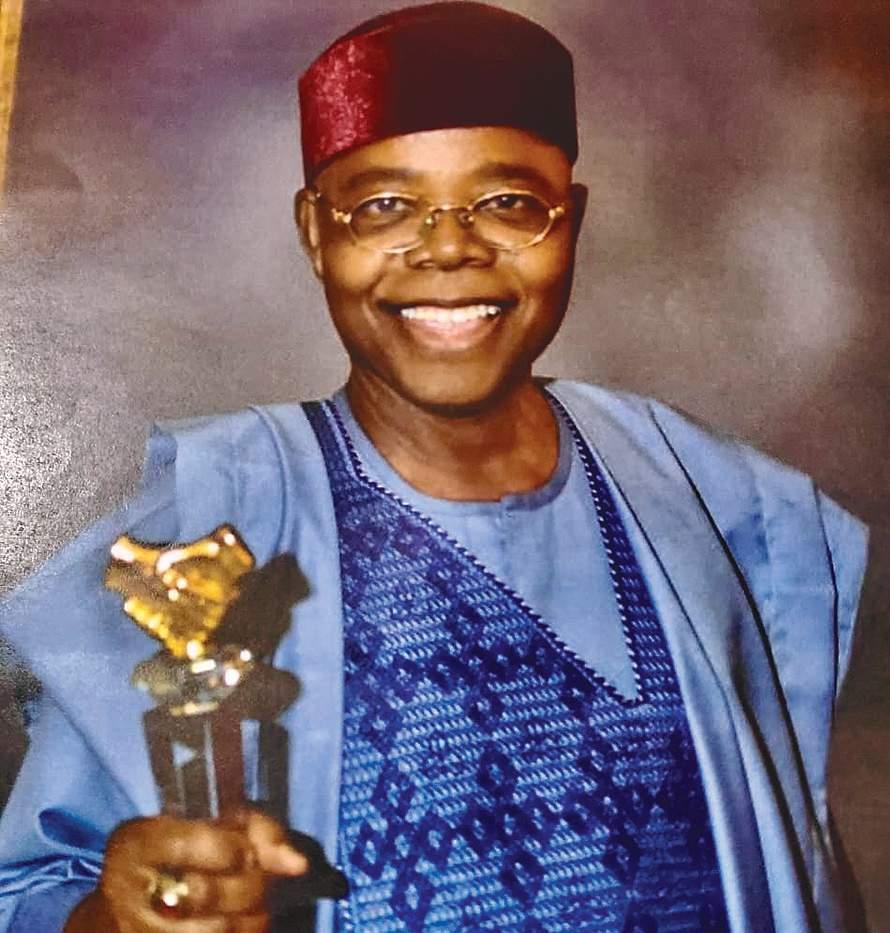
in an industry fraught with challenges and intense global competition, only a few names stand out as trailblazers—those whose vision, resilience, and innovation have shaped the sector’s future. One such name is dr. Vincent Ebuh, a pioneering figure in Nigeria’s oil and gas industry and the founder of Petrolog, the country’s first indigenous oil and gas services company. His extraordinary contributions and decades of unwavering dedication were recognised in spectacular fashion at the 2024 PETaN awards, where he and his company received a rare double honour. Chiemelie ezeobi writes that this prestigious recognition not only underscores his remarkable achievements but also highlights the enduring impact of Petrolog on both the local and international oil and gas landscape

The Petroleum Technology Association of Nigeria (PETAN) recently honoured Dr. Vincent Ebuh and his company, Petrolog, with a rare double recognition at the 2024 PETAN Awards. The event, held at the prestigious Oriental Hotel in Lagos, marked a milestone for the indigenous oil and gas services company and its visionary chairman.
Dr. Ebuh was bestowed with the Distinctive Leadership Medal of Honour Award, recognising his pioneering efforts in establishing Nigeria’s first oil and gas services company. His foresight and determination in founding Petrolog in 1980 paved the way for other indigenous firms in the sector, earning him widespread respect and admiration. The organisers described him as “a visionary, dogged fighter, and an incredible innovator” whose passion drives his every idea.
Constant Accolades
This isn’t the first time Dr Ebuh has received such accolades. In 2014, PETAN honoured him with the Lifetime Achievement Award in the Oil and Gas Industry, a testament to his enduring influence and contributions. Earlier, in 2011, he was presented with the Lion of Africa Award for outstanding private sector leadership by Ronald H. Brown in Washington, DC. His remarkable career continued to attract international recognition when he was named Top Executive and Professional of the Year 2015 by Strathmore’s Who’s Who Worldwide Edition, based in Farmingdale, New York. More recently, in 2022, he was listed among the 50 Most Impactful African CEOs by The Guardian.
Significant Contributions
In addition to these awards, Dr Ebuh has made significant contributions through his intellectual work. He authored the book International Trade: Third World Dilemma: Implication for African Countries before Year 2000, which used Nigeria as a case study to explore trade challenges facing developing nations. His thought leadership extends to policy advocacy, having presented several memoranda to the Nigerian government offering solutions to the perennial shortages of petroleum products in the country.
Intellectual, Corporate Achievements
Beyond his intellectual and corporate achievements, Dr Ebuh boasts an impressive academic and professional background. He is an alumnus of Harvard, Stanford, Oxford, and Georgetown Universities, institutions renowned for producing world-class leaders. Professionally, he holds Fellowships from several prestigious bodies, including
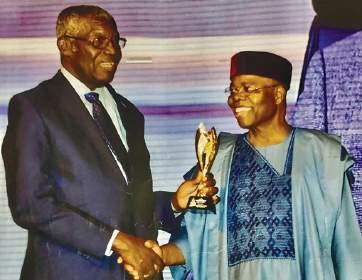
the Nigerian Institute of Management, the Nigerian Association of Petroleum Explorationists, and the Nigerian Institute of Petroleum Technology Association of Nigeria (PETAN). His entrepreneurial spirit is further reflected in his role as a Co-founder of Zenith Bank PLC, one of Nigeria’s leading financial institutions, established in 1990.
Dr Ebuh’s wealth of experience spans over four decades, during which he has overseen strategic planning, daily operations, financial management, and workforce development for over 650 employees. He is also the President of the Nigerian-Venezuelan Chamber of Commerce and a member of the Entrepreneurship Institute of Houston.
Awards at PETAN
Reflecting on his latest recognition, Dr Ebuh expressed his gratitude, saying: “I am thrilled
with the continued recognition by PETAN of our role as first movers in the oil and gas services sector in Nigeria. It is heartening to see an association committed to promoting and rewarding excellence in a society where it often goes unrecognised.”
No sooner had Dr Ebuh descended from the stage after receiving his personal award than the atmosphere at the Oriental Hotel was charged once more, with the announcement of Petrolog as the First PETAN Pioneer Company. This rare double honour highlights the company’s significant contributions to the oil and gas industry over the years.
Speaking on why Petrolog deserved this accolade, PETAN Chairman Engr. Wole Ogunsanya said, “Petrolog brings energy to the world as an integrated provider of solutions for the entire oil and gas lifecycle.
Established over four decades ago, the company has grown its services to include marine vessels, saturation diving, drilling services, engineering and design, subsea construction, and digital software solutions.”
With a presence on four continents and more than 10 offices worldwide, Petrolog has evolved into a conglomerate with a workforce of over 650 dedicated professionals. The company’s global reach and commitment to providing world-class services make it a leader in its field. Engr Ogunsanya added, “Petrolog’s teams work with a singular focus and vision to provide professional services in each area of operation, ensuring clients’ needs are met with excellence.”
Dr Ebuh, in his response, reiterated the company’s dedication to solving industry challenges. “Whatever the requirement, great or small, our team stands ready to find the solutions to address the challenges,” he said.
Since its inception in 1994, the PETAN Award for Excellence has recognised companies and individuals who distinguish themselves through innovation, resilience, and quality service delivery in Nigeria’s oil and gas industry. The association itself was established as a platform for exchanging ideas among stakeholders, policymakers, and major operators in the sector.
The double recognition for Dr Ebuh and Petrolog comes at a time when the Nigerian oil and gas industry faces numerous challenges, including environmental concerns, infrastructure deficits, security issues, and regulatory hurdles. With fluctuating global oil prices and increasing competition from other oil-producing nations, only the most resilient companies continue to thrive. PETAN’s decision to honour Petrolog reflects the company’s ability to navigate these challenges while maintaining high standards.
Dr Ebuh’s legacy in Nigeria’s oil and gas sector is undeniable. From pioneering indigenous service provision to influencing policy and fostering international partnerships, he has left an indelible mark on the industry. The double awards not only celebrate his past achievements but also signal confidence in his continued leadership.
As the evening drew to a close, one thing was clear: Dr Vincent Ebuh and Petrolog remain at the forefront of Nigeria’s oil and gas industry, setting standards for excellence and inspiring future generations of entrepreneurs.
Raheem Akingbolu
To protect consumers and further bring sanity into advertising practice, the federal government has called on individuals and organisations to desist from exposing unlawful and unethical advertisements on treatment of a range of ailments on Instagram and Facebook platforms. The two platforms are owned by Meta Incorporated and represented in Nigeria by Facebook Nigeria Operations Limited.
In a statement issued by the Advertising Regulatory Council of Nigeria (ARCON), which was signed by its Director General, Dr. Olalekan Fadolapo, the government stated that that the spurious and unsubstantiated claims in the advertisements pose serious health risks to Nigerians as they have no clinical or any scientific proof of their efficacies.
According to the statement, the council pointed out that its investigation has revealed that most of the products being exposed illegally
are not certified by relevant government agencies and may not be safe for consumption. It further stated that the the brand owners are taking the loose opportunities offered by online media platforms to expose those unapproved advertisements.
“These advertisements with frivolous claims were neither submitted to, nor approved for exposure by the Advertising Standards Panel (ASP) being the statutory Panel established by the Advertising Regulatory Council of Nigeria Act No. 23 of 2022 to ensure that advertisements targeting the Nigerian market conform with advertising ethics as well as the prevailing laws of the Federation,” Olalekan reveals.
ARCON promised to take necessary actions to ensure that the individuals and organizations involved are sanctioned in line with the prevailing laws and the Code of Advertising. Toward the end of last year, ARCON said it would take all necessary steps to ensure Jols Medix Nigeria
Limited was sanctioned for running an online/social media advert, without the authorisation of the council.
The apex regulatory body had noted that the company had run a social media platform advert of Lung Detox Tea, which, it stated, claims the tea makes smoking healthy.
It stated that the advert was neither submitted for vetting nor approved by the Advertising Standards Panel (ASP).
ASP is the statutory body with the responsibility of ensuring that all advertisements conform with the Nigerian Code of Advertising, in line with Section 53 of the Advertising Regulatory Council of Nigeria Act No. 23 of 2022.
“Upon petition, ARCON investigated the company’s advertising activities. It was discovered that besides the Lung Detox Tea advert, there are other advertisements with unsubstantiated claims exposed on the company’s Instagram page, a platform owned by Meta Inc, and represented in Nigeria by Facebook Nigeria Operations Limited,” it stated.
Chartered Institute of Stockbrokers (CIS), has appointed Ayo Adeonipekun as the Registrar and Chief Executive. Adeonipekun brings on board, over 25 years of extensive multidisciplinary experience and exposure in Leadership, Finance, People and Performance Management, Corporate Planning and Administration. He succeeds Dr Josiah Akerewusi who retired after a meritorious service , spanning one decade.
Prior to his appointment, Adeonipekun was the pioneer Managing Director/Chief Executive Officer of Reliance Capital Limited, a Funds/ Portfolio Manager, duly licensed by the Securities and Exchange Commission (SEC), An Alumnus of the prestigious Lagos Business School,
he holds a Bachelor of Science Degree in Accounting (Second Class Upper Division) and a Master’s Degree in Finance, both from Olabisi Onabanjo University, AgoIwoye. He also has a good Higher National Diploma in Accountancy from Yaba College of Technology. He is currently a Doctoral Candidate (PhD Finance) at Olabisi Onabanjo University.
A Fellow of the prestigious Chartered Institute of Stockbrokers, he qualified as a Chartered Stockbroker in March 2006 whilst in the employ of Crossword Securities Limited. He also qualified as a Chartered Accountant in May 1997 and was admitted as a Fellow of
the Institute of Chartered Accountants of Nigeria (ICAN) in 2013. He is a Certified Microfinance Banker (CIBN-MCP), and an Associate Member, Chartered Institute of Taxation of Nigeria (CITN), Trading License holder of the Nigerian Exchange Limited (NGX) and a Registered Capital Market Operator/Sponsored Individual with SEC.
“This is a critical role that requires strong leadership, strategic thinking, and a deep understanding of the capital market. Adeonipekun possesses these qualities to transform the Institute into a world- class certification entity,” said the 13th President and Chairman of Council, CIS, Oluropo Dada.
The Aurora Tech Award, an annual award celebrating the boldest and most ambitious female founders in emerging markets, has unveiled its top 120 founders for 2025 with Nigeria taking center stage. Out of a record-breaking 2,018 applications from 116 countries, Nigeria leads the Longlist with an impressive 21 founders, cementing its position as a hub for innovation and female entrepreneurship. Brazil and the United States follow, with Egypt close behind. Other notable contributors include Colombia, Kenya, the United Kingdom, India, and Kazakhstan, reflecting the award’s truly global impact.
This year’s Aurora Tech Award not only highlights the remarkable talent emerging from Nigeria but also underscores its growing influence in the tech and startup ecosystem, further inspiring female founders across the continent and beyond.
“The Aurora Top 120 is a first for us this year, created from a three-month open call that attracted over 2,000 applications from female founders. Through a
rigorous selection process, we’ve identified 120 standout women entrepreneurs who are building bold and innovative businesses in emerging markets. These founders are poised to shape the future of their industries and countries, making them the ones to watch in 2025,” said head of the Aurora Tech Awards Isabella Ghassemi-Smith.
The initiative also garnered increased support from venture capital firms, with the number of VC partners rising from 23 to 35 and new partners coming from Egypt, Brazil, and Pakistan, thus underscoring the growing global recognition of the award and its mission.
The four leading sectors that dominated the nomination list were Healthtech, Agrotech, Edtech and e-commerce. The majority of agrotech startups are from Africa while only a few startups made the nomination list from the renewable energy sector.
Over the years, there has been growing participation of women in entrepreneurship which marks a significant

global trend. According to the Global Entrepreneurship Monitor (GEM), women’s startup activity rates rose from an average of 6.1% (2001-2005) to 10.4% (2021-2023) across 30 countries.
Research conducted by Research WE-FI revealed that 17% of working-age women in developing economies are already entrepreneurs, with 35% aspiring to join them. In 2023, emerging economies received 17% of global Venture Capital investment, underscoring their resilience. For instance, according to a report released by the African Private Capital Association, funding from Venture capitalists in Africa skyrocketed to $6.5 billion in 2022 (AVCA), from $1.3 billion in 2020.
In a similar development, a report released by BCG shows that female-led startups generate 78 cents of revenue per dollar of funding, compared to just 31 cents for male-led ventures, which is a further confirmation that women outperform their male-led counterparts in revenue efficiency.
Kayode Tokede
The Nigerian stock yesterday posted its largest daily gain since the beginning of trading in 2025, as it gained N792 billion by market capitalisation, driven by investors buying interest in MTN Nigeria Communication Plc and 33 others.
As a result, the Nigerian Exchange Limited All-Share Index (NGX ASI) gained
1,300.01 basis points, or 1.25 per cent to close at 105,530.74 basis points, with the Yearto-Date returns settling at +2.5per cent.
Also, market capitalisation rose by N792 billion to close at N64.351 trillion.
Sectoral performance was mixed as the NGX Banking Index gained 1.7per cent and NGX Consumer Goods Index increased by 0.5 per cent, while the NGX Insurance
Index dipped by 1.4per cent and NGX Industrial Goods dropped by 0.2per cent. The NGX Oil & Gas index closed flat. As measured by market breadth, market sentiment was positive, as 34 stocks gained relative to 25 losers. MTNN emerged the highest price gainer of 10 per cent to close at N242.00, per share.
Honeywell Flour Mills followed with a gain of 9.89 per cent to close at N9.11,
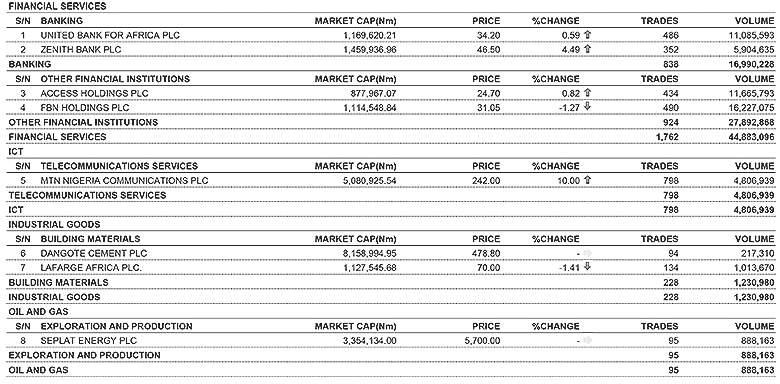
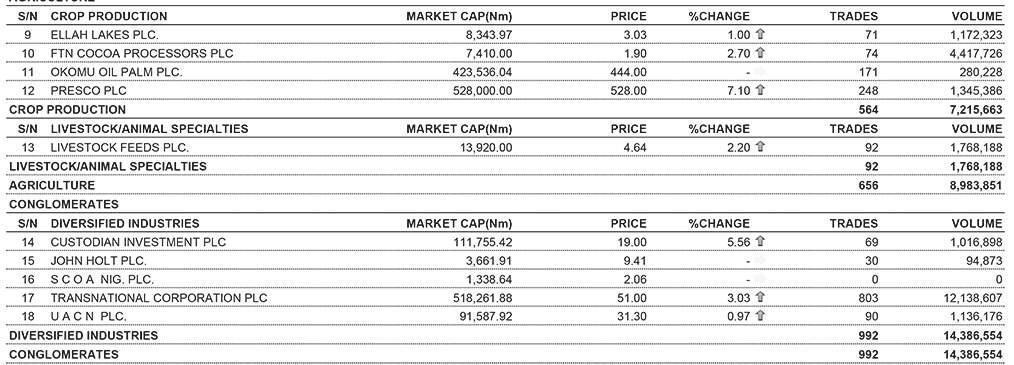

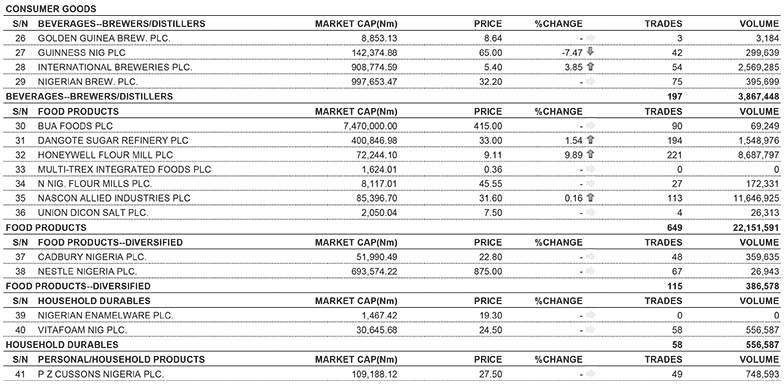

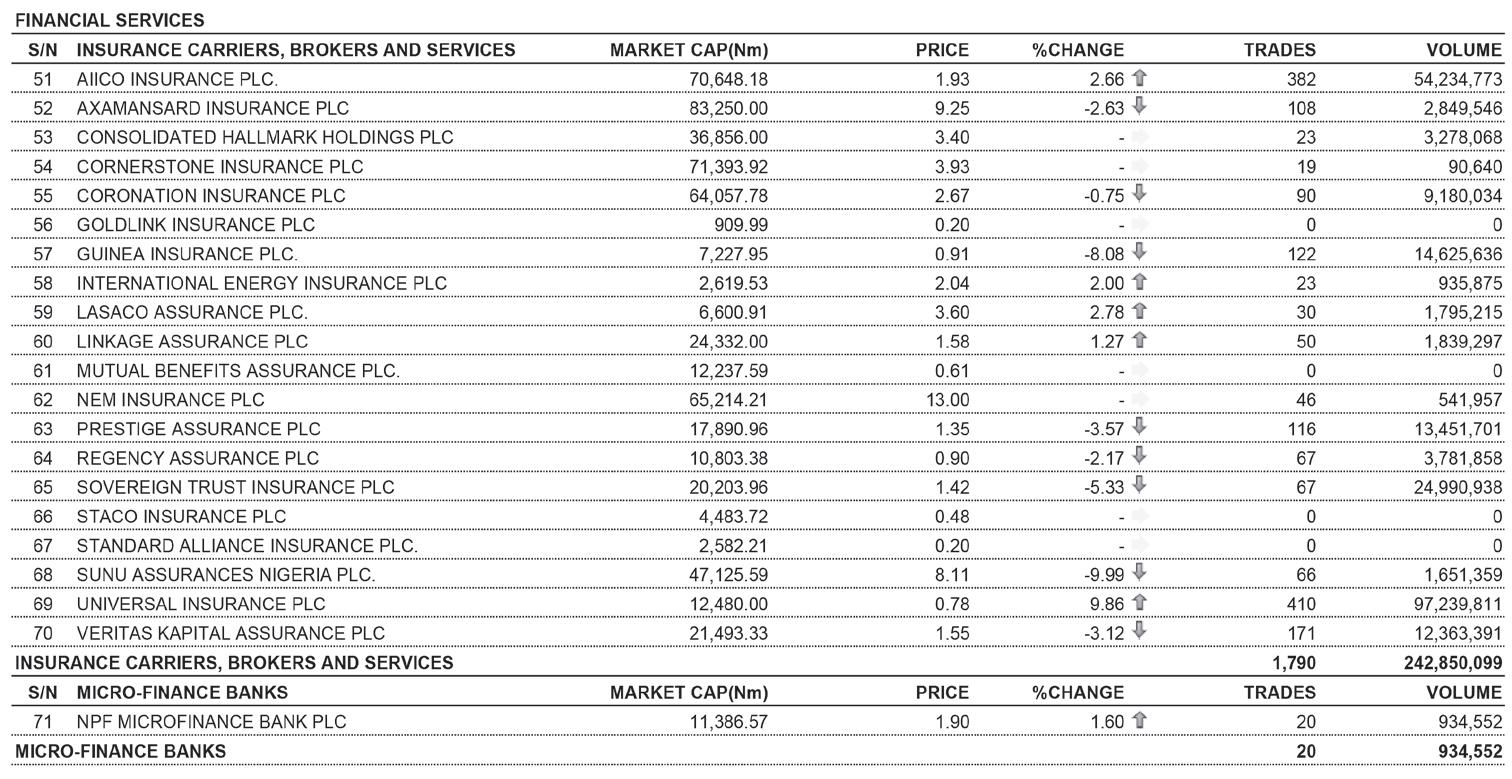
while Universal Insurance advanced by 9.86 per cent to close at 78 kobo, per share. Transcorp Hotel gained 9.78 per cent to close at N127.35, while Ikeja Hotel up by 9.31 per cent to close at N13.50, per share. On the other side, RT Briscoe Nigeria led others on the losers’ chart with 10 per cent to close at N2.34, per share. SUNU Assurance followed with a decline of 9.99 per cent to close at N8.11,
while The Initiates Plc (TIP) shed 9.68 per cent to close at N2.52, per share. UPDC lost 9.50 per cent to close at N1.81, while Guinea Insurance depreciated by 8.08 per cent to close at 91 kobo, per share. The total volume traded declined by 35.28 per cent to 489.525 million units, valued at N13.069 billion, and exchanged in 13,010 deals. Transactions in the shares of Universal Insurance led the activity with
million
N72.169 million. AIICO Insurance followed with account of 54.235 million shares valued at N104.178 million, while Sovereign Trust Insurance traded 24.991 million shares valued at N37.643 million. FBN Holdings (FBNH) traded 16.227 million shares worth N500.357 million, while Guinea Insurance traded 14.626 million shares worth N13.921 million.

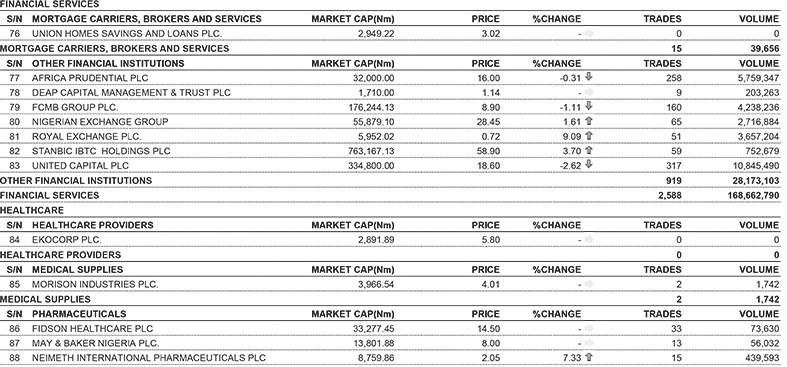
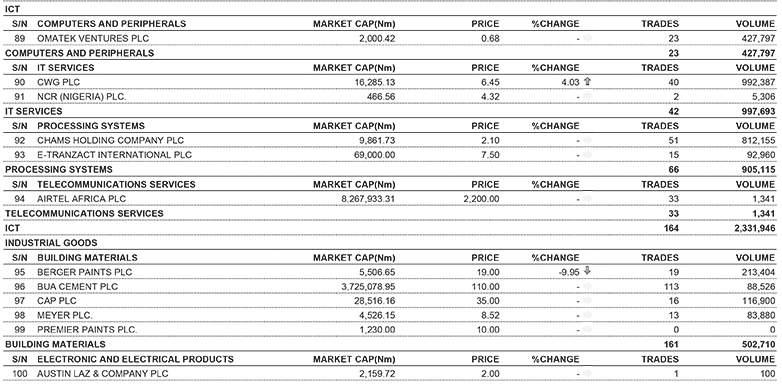
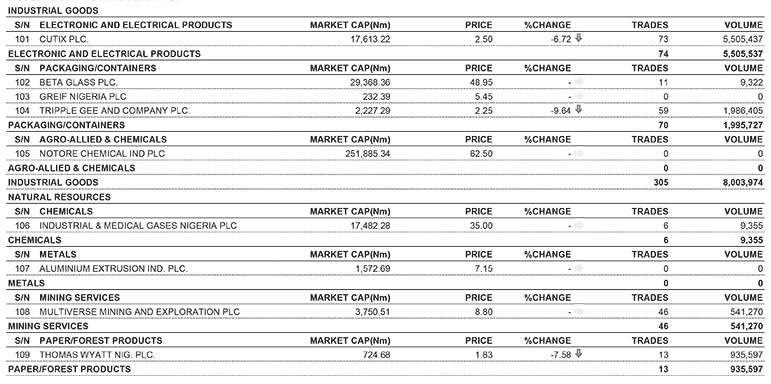
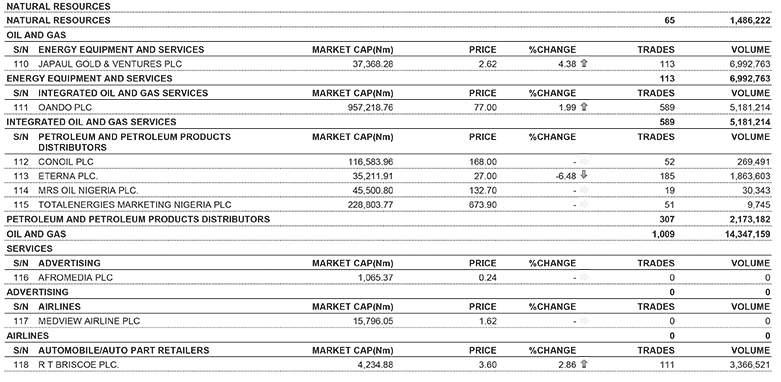


Thisday Afrinvest Index down 0.3%
Thisday Afrinvest 40 index declined 0.3% to print at 5,257.87 points due to price depreciation in WAPCO (-1.4%), FBNH (-1.3%), and UCAP (-0.5%). Cumulatively, these stocks account for 9.2% of the index.
Local Bourse Extend Gains ASI up 1.2%
Yesterday, in line with our projection, the NGX -ASI advanced 1.2% to close at 105,530.74 points, buoyed by buy interest in MTNN (+10.0%), TRANSCOHOT (+9.8%), and ZENITH (+4.5%). As such, YTD return improved to 2.5% (previously 1.3%), while market capitalisation gained 1.2% to ₦64.4tn. Meanwhile, activity level declined as volume and value traded shed 35.3% and 47.1% to 489.5m units and ₦13.1bn, respectively.
Performance across our coverage sectors was positive as three indices gained, two lost while the Oil & Gas index closed flat. Topping the leaderboard, the AFR -ICT and Banking indices rose 3.6% and 1.7% respectively, driven by gains in MTNN (+10.0%), NSLTECH (+8.8%), ZENITH (+4.5%), and ETI (+8.6%). Following suit, the Consumer Goods index inched higher by 50bps due to price appreciation in HO NYFLO UR (+9 9%) and CADBURY (+6.7%). Conversely, sell pressure on SUNUASSURE (- 10.0%), MANSARD (-2.6%), and WAPCO (-1.4%) dragged the Insurance and Industrial Goods indices lower by 1.4% and 0.2%, respectively.
Investor sentiment, as measured by market breadth, improved to 0.12x from -0.01x in the prior session as 35 stocks advanced, 27 declined, while 65 closed flat. We anticipate the market to close the final trading session for the week with a mild gain, driven by extended strategic portfolio positioning.
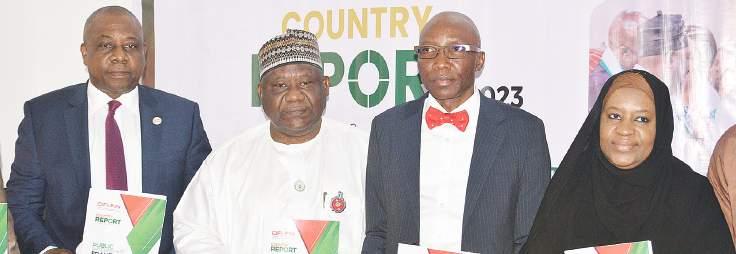
L-R: Registrar/Chief Executive, Chartered Institute of Forensics and Certified Fraud Investigators of Nigeria (CIFCFIN), Dr. Isa Salifu; Director General, Bureau of Public Service Reforms (BPSR), Dr. Dasuki Ibrahim Arabi; President/Founder, (CIFCFIN), Dr. Iliyasu Gashinbaki; and Executive Commissioner, Corporate Services, Security & Exchange Commission (SEC),
during the Presentation of CIFCFIN 2023 Country Report in Abuja... yesterday.
Chuks Okocha and Emmanuel Addeh in Abuja
The Governor of Nasarawa State, Abdullahi Sule, has said that it was impossible for Nigerian governors to
help former Kaduna State Governor, Nasir el-Rufai, after his rejection by the statutory institutions of government as a ministerial nominee.
Answering questions on a national television as to why the leaders of
the sub-national governments have neglected el-Rufai, despite working assiduously to install the current administration, Sule stated that the governors never discussed el-Rufai’s matter in any of their meetings.
Adedayo Akinwale in Abuja
The pan-Yoruba socio-cultural and socio-political organisation, Afenifere, has called on governments in the South West to secure the region following the influx of bandits into the region.
Oyo State Governor, Seyi Makinde Monday raised the alarm that bandits being dislodged in the northern part of Nigeria are camping in parts of Oyo State.
However, the factional National Publicity Secretary of Afenifere, Jare Ajayi in a statement issued yesterday said the disclosure of this nature coming from the Chief Security Officer of a state was not something to be treated with levity. It, therefore, called on all the
governors of the South Western States to, “as a matter of urgency, hold a meeting to map out strategies to expel the bandits from the region and to ensure that such elements do not infiltrate Yorubaland at any time again”.
“For these objectives to be achieved, there is the need to carry certain groups along. These are the security agencies that will implement whatever security decisions reached, traditional rulers and heads of local vigilantes, it said.
Afenifere noted that whatever strategies that were devised should include functional up-to-date equipment for those who would be on the fields, attractive incentives and the deployment of modern technologies to assist in identifying the bandits
Governor of the Year
A coalition of human rights and community based organisations spread across Nigeria has named the Ekiti State Governor, Abiodun Oyebanji as the Governor of the Year 2024.
In a release signed after its General Congress meeting held in Lagos, the Nigerian Human Rights Community, (NIHRCO) said the process for the selection of the best Governor of the year 2024 began last year with various suggestions made by leaders of the coalition whose groups are spread across the country.
The statement signed by the group's regional coordinators, Taiwo Adeleye, Kudu Abubakar, (North), Digifa Werenipre (South South) and Fred Ojinika (South East) singled out Oyebanji as a potential leader of Nigeria at the highest level.
The Governor, the group said, will be presented with a plaque on behalf of the 130 civil society and community based groups across the
36 states, with the hope that it would encourage other state governors to address the fears and aspirations of the people they govern.
The group said Ekiti remains the most politically stable and peaceful state all through 2024 adding that the governor has been able to build bridges that unites all political factions and interests by defining the Lowest Common Factor that has sustained mutual co-existence in the state.
The coalition established in 2003, and made up of 130 civil society and community based groups across the 36 states said the Governor of Ekiti stood out in the year 2024 in the area of transparency, promotion of human dignity, civil rights, peace building and sustainable development.
The coalition said his special welfare provisions for People with Disability, PWD inspire a paradigm shift from agelong state actors' perception of vulnerable communities.
and their hideouts.
While urging security agencies and citizens not to take the issue of security lightly, it said traditional rulers and community leaders in different parts of Yorubaland should not keep quiet whenever they notice any indication suggestive of security threat.
It said: “For example, until the governor made the revelation on Monday, such grave security danger was unknown to members of the public, yet there are people living in the Fashola area where the bandits were reported to have established a camp.
“ It is not unlikely that similar camps could be found in some other parts of the South West, hence the need for urgent and effective action”.
According to the Nasarawa governor, it wasn't really what the governors could concern themselves with, since the institutions of government already did their job by screening him.
On the issue of el-Rufai's recent meeting with some politicians in the country and the possibility of forming a new party or aligning with an existing one to contend against the ruling All Progressives Congress (APC) in 2027, Sule made reference to his own state where key political parties merged to contest against him in 2023 but still failed.
However, he said that el-Rufai had not announced that he was leaving the ruling party despite his rejection as a ministerial nominee by the National Assembly in August 2023 purportedly on the strength of a security report. He said that of the time of the interview, el-Rufai was still an APC stalwart.
The Nasarawa governor admitted that he hadn't spoken with el-Rufai in a long while, acknowledging that the former Kaduna governor was one of those who spearheaded the return of power to the south after the eight years of ex-President Muhammadu Buhari.
“El Rufai was one of those at the forefront when we got together
as governors of the APC from the northern part of the country to ensure that power returned to the south. We said it was going to be unfair for the power to remain in the north after our former President Muhammadu Buhari, had actually worked for for eight years under the APC,” he stressed.
However, Sule stated that since the saga started he had asked ‘very little questions’ because he (Sule) has been managing a state like Nasarawa that is already complicated on its own.
“What actually led to his nomination, what led to his rejection by the Senate or by the security agencies, whatever they say, to be honest, are not issues we discuss at either the Progressive Governors Forum or even the Nigerian Governors Forum. They are not issues. Because what doesn't concern us, we can do nothing about it.
“It is the prerogative of Mr. President to nominate whoever should be his minister, and he nominated. And also, there are agencies, you know, including the National Assembly, that have confirmed or rejected, and they rejected. And I asked very few questions about that, because there is nothing I can do about them,” he added.
He said that a lot of people had
been making all kinds of comments and threats as Nigeria approaches 2027, noting that it was too early when the administration had not even clocked two years on the saddle.
“So I think it's too early to start making those kinds of permutations,” he said, pointing out that he was not scared of anybody regrouping against the APC in 2027.
In the run-up to the 2023 presidential election, el-Rufai was literally everywhere with candidate Bola Tinubu, as he then was, and had been positioned to head a key ministry before he was suddenly dropped.
Since the August 2023 incident, el-Rufai has not been seen in the gathering of APC chieftains and has neither visited the president, nor has he been seen around the seat of power.
Aside recently being spotted among chieftains of the Social Democratic Party (SDP) fuelling defection rumours, el-Rufai’s relationship with his successor in Kaduna, Uba Sani, has also gone sour. His ex-Chief of Staff, Muhammad Saidu, is also being investigated by the federal government for alleged money laundering.
Emmanuel Addeh in Abuja
A foiled attack on Chad's presidential compound overnight was carried out by a group of two dozen armed "ill-intentioned individuals" who were neutralised by security forces, the public prosecutor said yesterday, though details of the incident remained unclear.
Bursts of gunfire rang out near the president's office in the capital N'Djamena on Wednesday night as the military blocked surrounding streets. The government said later it had foiled an attempt to destabilise the country and the situation was under control.
The attack comes at a delicate time for Chad, which recently scrapped a defence cooperation pact with longtime partner France that made it a key Western ally in the fight against Islamist militants in West and Central Africa's Sahel region.
The region has been riven by insurgencies, including by groups
linked to Islamic State, al Qaeda and Boko Haram, for more than a decade, Reuters reported.
Military authorities in Mali, Burkina Faso and Niger, which shares a border with Chad, have recently turned their backs on the West in favour of Russian military support.
Chad's public prosecutor said 24 armed assailants drove up to the presidential palace on Wednesday evening, feigned a breakdown and attacked security guards manning the gate, killing two and lightly wounded five others as they tried to enter the compound.
Security forces killed 18 of the assailants and wounded six, who were taken to hospital, the prosecutor said.
Investigations have been launched to identify all instigators and accomplices, the prosecutor said in a statement.
In an earlier interview on national television, government spokesperson Abderaman Koulamallah said the assailants, who seemed intoxicated and disorganised, were only armed
with knives and machetes.
Security sources and researchers said there was still a lot of confusion surrounding the incident, which sparked speculation it could be linked to jihadist groups, ethnic tensions, or discontent over the fallout of a war in neighbouring Sudan.
"It is too early to draw conclusions over exactly what happened," a security source in N'Djamena said. Koulamallah said it was "probably not" a terrorist act.
N'Djamena was calm on Thursday morning with daily life resuming its course. There was no additional gunfire during the night, although some residents said the military was still blocking access to neighbourhoods around the presidency.
Chad is led by President Mahamat Idriss Deby, who seized power after rebels killed his father, longstanding President Idriss Deby.
The older Deby had ruled Chadwhich is rich in oil resources but one of the poorest countries in Africa - since a military coup in the early 1990s.
Crisis Group expert Enrica Picco said the force and rapidity with which the attackers were neutralised suggested the presidency was already on alert.
"Tensions are very high at the presidential palace," she said. "Deby knows that he has a lot of enemies who want to replace him or change the way Chad is dealing with different crises," Picco said.
Meanwhile, the UAE has strongly condemned the ‘terrorist’ attack that targeted the presidential palace in the Chadian capital, N'Djamena. According to reports, two dozen armed men tried to storm into the country's presidential palace in which 18 of the attackers and two soldiers were killed.
The Ministry of Foreign Affairs, in a statement, said the UAE expressed its strong condemnation of these criminal acts, and its permanent rejection of all forms of violence and terrorism that aim to destabilise security and stability and are inconsistent with international law.
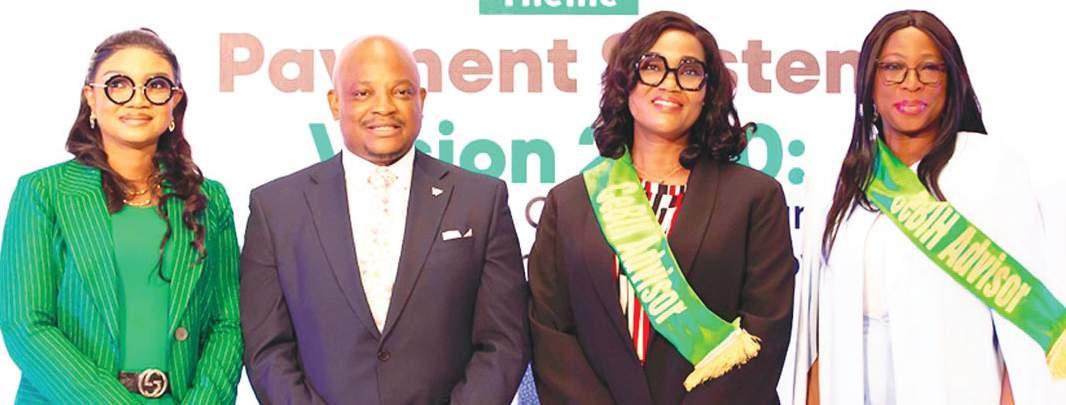
L-R: Vice Chairman, Committee of e-Business Industry Heads (CeBIH)/Group Head, E-Business, Premium Trust Bank Limited, Abidemi Asunmo; Chairman, CeBIH/Chief Partnership Officer, Wema Bank Plc, Ajibade Laolu-Adewale; newly inducted CeBIH Advisory Council Member/former CeBIH Chairman/Head, Card Services, Zenith Bank Plc, Celestina Appeal; newly inducted CeBIH Advisory Council Member/former Vice Chairman, CeBIH/ Country Manager, Mastercard West Africa, Folasade Femi-Lawal at the induction ceremony during the CeBIH 2024 annual conference in Lagos…recently
In exercise of his powers under the Land Use Act 1978, Governor of Enugu State, Dr. Peter Mbah, yesterday signed Land Use Regulation 2025 as well as Executive Order No. 1, 2025, designating some areas in the state as urban areas.
By the provisions of the Executive Order, entitled “Enugu State Designation of Land as Urban Areas,” the entire Enugu East, Enugu North, and Enugu South Local Government Areas have been designated urban areas. Likewise, the entire Udi LGA, Nkanu West LGA, Nkanu East LGA, and Nsukka LGA have been designated as urban areas.
In the same vein, parts of some LGAs have been designated urban areas. Consequently, Ndeabor Urban Area measuring 10km radius and Oduma Urban Area, measuring 20km radius both in Aninri LGA; Agwu Town measuring 25km radius, Ihe, Agbogugu, Mgbowo, Isu-Awa, Mmaku, Ituku, and Owelli-Court; Aguobuowa and Oghe in Ezeagu LGA; Ogbede, Ukehe, and Aku in Igbo-Etiti; Enugu Ezike in Igbo Eze North LGA; Ibagwa Aka in Igbo Eze South LGA; and Ikem and Eha-Amufu in Isi-Uzo Local Government Area have been so designated
The Executive Order equally designated urban areas Oji-River, Ugwuoba, and Inyi in Oji-River LGA; Obollo-Afor and Orba in Udenu LGA; Umulokpa and Adani
in Uzo-Uwani LGA.
Meanwhile, speaking at the brief signing ceremony, Mbah said, “I have just a few minutes ago signed a Land Use Regulation of 2025, and also an Executive Order designating certain locations of the state as urban areas.
“This is a major milestone that we have just witnessed. This is quite historic. This again is in line with what we witnessed a few weeks ago when we formally launched Enugu State Geographic Information System, ENGIS, a system that is designed to fast-track application for land titles, and indeed other administrative functions relating to land.
“So, what we have here today is going to bring clarity. As we all know, lack of transparency feeds corruption. This is really a major milestone towards our drive, not just to enhance the revenue of Enugu State, but to ensure ease of doing business where prospective applicants can easily know what their fees are and the timelines that the application will be processed.
“Therefore, with what we have done here today, there is no more hidden charges when you apply for whatever land transaction, whether it is for search, titles or indeed for whatever transactions you want to carry out relating to land in Enugu State.
“It is also going to end the era of double allocations, land grabbing, and all sorts of confusion that may
have existed before now in our land management system. They have now come to an end with the signing of this regulation.
“We have also expanded areas that before now we have designated as rural areas. That means effectively that those living in those locations
are now able to come forward and apply for their title document and they will be able to obtain their Certificate of Occupancy for the property and assets they have there. Again, this brings further clarity to our land management system.”
While commending his team for
the good job done, the governor promised that there would be adequate public enlightenment on the processes of land transactions under the new Order, Land Use Regulation, and the Enugu Geographic Information Service.
“This regulation clearly spelt out
the number of days it will require for any application, whether you are conducting your search or indeed applying to obtain your title document. The number, the timelines, your fees are spelt out. So, there is absolutely no confusion,” he concluded.
Visa delays and denials are keeping researchers from Nigeria and other African countries from participating in conferences and meetings in the global north, including those crucial for Africa’s development.
The development denies them opportunities for building research partnerships and means Africa’s needs are not represented.
Citing Local Action on Global Opportunities (LAGO), an organisation which analyses migration and visa issues, Nature Africa, disclosed that African nations had higher rates of rejection for Schengen visas in 2022 and 2023 than any other region.
According to the report, nine out of the 12 countries with 40 per cent
The Katsina State Government has vaccinated no fewer than 2,216,573 children against diphtheria and distributed 360 motorcycles to health personnel for routine immunisation.
The state deputy governor, Hon. Faruk Lawal, disclosed this while briefing journalists on the achievements of the state government under the leadership of Governor Dikko
Umaru Radda in the health sector.
He said the state government immunised the 2,2,216,573 children against the contagious diphtheria
through its Primary Healthcare Agency in order to curb the spread of the bacteria in the state.
He stressed the government also procured and distributed commodities for containment of the diphtheria outbreak as part of non-polio supplementary immunisation activities.
“Similarly, a total of 2,216,573 eligible children were vaccinated. In order to ensure adequate coverage to the nooks and crannies of the state, a total of 360 motorcycles were procured and distributed to ward focal persons for routine
immunisation and related exercises”, Lawal added.
The deputy governor explained that 438 health personnel have so far been engaged by the state government for the favourable outcome of the immunisation exercise across the state.
He, however said the state government has expended N919,000 for the fight against HIV and AIDS via the procurement of laboratory testing, consumables, prevention of mother to child transmission and other outreach awareness campaigns in the state.
or more visa applicants rejected in 2023 are in Africa.
Of the 27 countries with rejection rates of 30 per cent or more, 18 are in Africa, and fewer than 10 African countries are included among the 50 who face a rejection rate of less than 10 per cent.
Similarly, the Royal Society2 found that the highest visa refusal rates for UK work visas were skewed towards the global south.
“I have no doubt that the biggest bias among global north countries is against applicants from the Africa region,” said Madhukar Pai, Canada Research Chair in Epidemiology and Global Health at McGill University.
The result of this, said Pai, is that Africans are least represented in global health organisations, boards, conferences, and publications.
This challenge means that many African researchers are not able to participate in conferences that discuss issues of crucial importance to the continent.
For instance, African researchers struggled to attend the International Aids Society (IAS) 24th International AIDS Conference, held in Canada in 2022 and the subsequent meeting in Germany in 2024 due to visa delays and denials.
As AIDS is a priority on Africa’s health agenda, the IAS called for better access to visas.
According to the report, in 2023, many Nigerian scientists, for instance, missed the inaugural conference for the Consortium for Advanced Research Training in Africa (CARTA) held at University of the Witwatersrand in Johannesburg, South Africa.
Folusho Balogun, a research fellow at the Institute of Child health at Nigeria’s University of Ibadan and a
team of 10 Nigerian scientists missed the two-day event as their visas were not processed in time.
Balogun was supposed to present the research project she was leading at the event but received her visa on the day the conference ended.
Similarly, Barnabas Alayande, a Nigerian surgeon at the University of Global Health Equity, in Rwanda, argued that the country of origin of a passport holder is a factor to the “humiliation” that African scientists experience while traveling, even after getting a visa.
“My counterparts from the US usually pass through immigration with ease, while I must queue for long hours being questioned before I am allowed to go to my destination. Sometimes, my friends must make noise about it,” said Alayande.
Having missed two global health conferences in the United States and Switzerland due to visa denial two years ago, Alayande said the impact can be detrimental to mental health.
Marie-Claire Wangari was a fifthyear medical student at the University of Nairobi in 2017 when her visa to Montenegro was rejected and she couldn’t attend the International Federation of Medical Students’ Associations.
Six of her colleagues faced similar rejections and they had to miss the four-week gathering where medical students are exposed to global health issues, including research and clinical projects.
“All the students who applied for a visa from Kenya, Uganda and Tanzania were rejected,” said Wangari, who is now a global health practitioner and a human rights committee member at the Kenya Medical Association.
Applicants who were from Uganda
and Tanzania also incurred extra travelling costs as they had to travel to the nearest consulate in Nairobi to apply for the visas.
In 2024, all her Kenyan colleagues who applied for the same forum held in August in Finland were also rejected, despite applying six weeks in advance.
While visa denials for Africans are common in the global north, they also happen in Africa.
Africa Visa Openness Index3 gave African countries collectively a score of 0.479 out of 1 in how open the countries are to visitors from other African countries.
The index measures the ease with which travelers can obtain visas; this may include the availability of e-visas, for instance, or visas given upon arrival.
Scientists are increasingly calling for conference organisers to host their meetings in visa-friendly countries.
The IAS’s Conference on HIV Science will take place in Kigali, Rwanda next year, while the 26th International AIDS Conference will be hosted in Latin America and the Caribbean. Rwanda ranks first on the Africa Visa Openness Index.
The 2025 congress of the International Health Economics Association has been relocated from Canada to Bali, Indonesia due to concerns over restrictive visa policies in Canada that would limit the participation of delegates from the global south.
Pai says that while hosting meetings in more visa-friendly locations may not entirely address the global health imbalance, it is a step toward change. The growing wave of anti-immigrant and anti-refugee sentiments in North America and Europe will worsen visa inequities in future, Pai stated.

L-R: Veteran journalist Sam Ekpe and his wife, Vivian, during the installation of Ekpe as Ezenwa Ndi Igbo Enugwu-Ukwu na Umunri, and his wife as Chibundu Enugwu-Ukwu na Umunri, by the traditional ruler of Enugwu-Ukwu, Anambra State, Igwe Ralph Ọbụmnemeh Ekpeh...recently
Deji Elumoye and Chuks Okocha in Abuja
President Bola Tinubu has expressed his sympathy to the military authorities following the loss of six soldiers during a terrorist attack on January 4, 2025, on an army base in Sabon Gida, Damboa, Borno State.
The President, in a release by his Adviser on Information and Strategy, Bayo Onanuga, extended his condolences to the families of the fallen soldiers, whose sacrifice in defending the nation would forever be honoured and remembered.
Tinubu, therefore, called for a
thorough investigation to uncover the circumstances that led to the unfortunate incident and ensure that it served as a valuable lesson to prevent similar occurrences.
The president commended the armed forces for their swift and decisive response, particularly the air component, in launching effective retaliatory strikes.
The targeted air raids resulted in the significant neutralisation of numerous terrorists and the destruction of their assets as they attempted to flee.
"This resolute action by the Army demonstrates the capability and readiness of our military to confront and
defeat threats to our nation's security.
“Their actions testify to our resolve to eradicate terrorism and banditry, paving the way for a future where peace and security prevail for all Nigerians.
"I extend heartfelt gratitude and sympathy to our military and security forces on behalf of a grateful nation.
"Your sacrifices and dedication do not go unnoticed, and we stand firmly behind you in this ongoing fight to eliminate these threats."
The president also urged the military to proactively take the war to the camps of bandits and terrorists, with emphasis onthe Northwest,
where the criminals have continued to threaten the lives and homes of innocent villagers.
In the same vein, Tinubu appealed to Nigerians and the media to support the military's efforts to restore peace and security in our beloved nation.
HURIWA Questions Nigeria’s Intelligence Failures Amid CDS’s Call for UN Probe
The Human Rights Writers Association of Nigeria (HURIWA), has expressed concerns over the recent revelation by the Chief of Defence Staff, General Christopher
The Nenadi Usman-led Labour Party (LP) Caretaker Committee has insisted that the National Publicity Secretary of the All Progressives Congress (APC), Felix Morka, must apologise to its party’s presidential candidate in the 2023 elections, Peter Obi.
It expressed concern over the “inflammatory rhetoric” by Morka, saying it “has no place in our democracy.”
A statement by Usman, stated that Morka’s “baseless allegations and threats were an indication of APC’s inability to engage constructively on the issues that matter to Nigerians.”
The committee, therefore, demanded that “APC must immediately issue a public apology to Obi and retract the offensive statements made by Morka Obi had in his New Year message insisted that Nigeria’s economic situation had worsened despite improvement claims by the federal government, restating that the country remained one of the poverty capitals of the world.
However, Morka, who spoke during an interview on Arise Television,
said Obi was crossing the line with his incessant criticisms of the ruling party and Tinubu’s government.
Tagging Obi a prophet of doom, Morka said: “Peter Obi has crossed the line so many times and has It coming to him whatever he gets. Peter Obi is really crossing the line.”
The LP statement read in part:
“His statements not only pose a direct threat to the life, reputation, and business interests of Mr. Peter Obi but also constitute an affront to the principles of democracy, decency, and responsible political engagement.
“Mr. Peter Obi, a man of impeccable character, has devoted his life to the service of Nigeria and the
Musa, about the inability of Nigerian intelligence agencies to trace and disrupt the funding and training networks sustaining Boko Haram for over 15 years.
The group described the situation as a damning indictment of the country’s intelligence institutions and a troubling failure to justify their substantial annual budgets.
In a recent interview with AlJazeera, General Musa, reportedly emphasised the need for a United Nations-led investigation into the international flow of funds to Boko Haram.
He questioned how insurgents managed to sustain themselves financially and operationally for such an extended period and suggested the possibility of international conspiracies at play.
In a statement by the National Coordinator of HURIWA, Emmanuel Onwubiko, it highlighted the paradox of a nation with robust intelligence institutions yet unable to detect or prevent financial and logistical support for insurgent groups.
"The Directorate of Military Intelligence (DMI), Department of State Services (DSS), and Nigerian Intelligence Agency (NIA) are tasked with key roles in safeguarding national security,” he said. However, their apparent failure to address Boko Haram’s funding raises fundamental questions about their operational effectiveness.
"The DMI is responsible for gathering, processing, and disseminating military intelligence to support Nigeria’s armed forces.
pursuit of good governance. He has consistently demonstrated that competence, merit, and respect for the rule of law should guide leadership.
“To attack him with baseless allegations and threats is an indication of the APC’s inability to engage constructively on the issues that matter to Nigerians.”
The Niger State Government is to begin the enforcement of the law prohibiting the sale and consumption of alcohol and related beverages in restricted areas of the state.
Under the law promulgated by the administration of late Governor Abdulkhadir Kure some twenty years ago, sale and consumption of alcohol is banned within 8 kilometers radius of Minna the state capital and other local government headquarters across the state.
A high registration fee of N500,000 was also fixed for those licenced to retail alcohol while dealers were to pay N5m for the wholesale of the banned goods.
The Director General and Chief Executive Officer of the Niger State Liquor Licensing Board, Alhaji Yahaya Halidu, told newsmen in Minna on Thursday that a taskforce to enforce the law had been put in place adding that all illegal dealers had been given 7-day notice to close shops.
He also said that the Board will soon begin to raid spots where "free
women" display their "products" with a view to stop prostitution and harlotry in the state
According to Alhaji Yahaya Halidu, the proliferation of illegal beer parlors and the consumption of the products were contributing to high crime rate in the society which the board wants to assist to reduce. He also said that the organisation will strengthen its revenue generation machinery in order to enable it rake in more money for government to execute the people-oriented projects ongoing across the state.
The Ministry of Innovation and Digital Economy (MIDE) in Sokoto State continued the digital skills training program Thursday, after formal flag off by the Commissioner, Ministry of Innovation and Digital Economy, Bashar Umar Kwabo.
This is as the ministry graduated 50 youths from its extensive digital training program for 1,000 youth in the state.
The digital training programme was designed to transition participants from digital illiteracy to digital literacy. It provides training in computer literacy, graphic design, video editing, social media marketing, and AI for productivity.
Permanent Secretary, Dr. Nasir Daniya, who led the session with a comprehensive lecture on basic computer skills, emphasised internet and social media safety, and relevant ICT laws, ensuring participants are well-informed about the digital ecosystem.
During interactive sessions with
participants, Mr. Kwabo applauded the efforts of staff of both the MIDE and ICT Directorates and the partners, Caliphate Tech Community and Dan Anini Digital Solutions. He further announced the state government’s plans to train further 10,000 individuals across the state, aimed at enhancing digital skills and promote self-sustainability.
Participants, drawn from all 23 local government areas in Sokoto State have reported significant improvements in their digital skills since the program’s inception.
This initiative is a key component of Sokoto State’s strategy under the Dr. Ahmad Aliyu Sokoto-led administration to prepare its citizens for digital transformation. MIDE remains dedicated to advancing digital literacy and fostering innovation across all sectors of the economy. Meanwhile, the ministry recently celebrated the graduation of the second batch of 50 individuals from its extensive digital training program for 1,000 youth.

R-L: Governor Hope Uzodimma of Imo State; Executive Director, Zenith Bank, Dr. (Mrs.) Adobi Stella Nwapa; and her husband, Dr. Ernest Nwapa, at the funeral of Adobi's father, Sir Christopher ljoma Nwapa (Jnr), at the Cathedral Church of St. Mary Magdalene, Oguta... yesterday
The Coalition of Northern Groups (CNG), Civil Society Organisations and other stakeholders, have called on lawmakers from the North to turn down the tax reform bills by the federal government.
In a communique issued at the end of their Town Hall meeting yesterday at Arewa House, Kaduna, the groups maintained that the bills did not reflect the realities on the ground.
According to the communique signed on behalf of the groups by Muhammed Sanusi Ali, the tax reforms could increase poverty, unemployment, weaken educational institutions and worsen the present economic hardship.
The communique called for the “immediate withdrawal of the bills and urged the federal government to adopt a more inclusive and
people-centered approach to economic reforms.”
The communique read: “At the townhall meeting, the following key deliberations and observations were made regarding the proposed tax reform bills.
“The participants observed that the proposed tax reform bills, far from being catalysts for economic growth, would increase the existing economic challenges facing the North and Nigeria as a whole.
“The reforms are likely to deepen poverty, increase unemployment, and stifle local businesses already grappling with economic hardship.
“The Town Hall meeting noted with great concern the provisions in the bills that propose the defunding of pivotal national institutions such as the Tertiary Education Trust Fund (TETFUND), the National Information Technology Development
Agency (NITDA), and the National Agency for Science and Engineering Infrastructure (NASENI).
“These institutions are critical to education, innovation, and technological advancement, particularly in Northern Nigeria, and
their defunding would undermine regional and national development.
“It was observed that the reforms appear to disproportionately target Northern Nigeria, raising suspicions about their intent.
“The region, already lagging in
economic development, would bear a significant share of the economic burden, further marginalizing its population.”
The groups further criticised alleged lack of meaningful consultation and engagement with
stakeholders, particularly those from Northern Nigeria, during the formulation of the bills. The communique stated: “This exclusion has resulted in policies that fail to reflect the realities and needs of the majority of Nigerians.”
Deji Elumoye in Abuja
President Bola Tinubu, yesterday, decorated his Aide-de-Camp, Nurudeen Alowonle Yusuf, to a new rank as colonel, following his promotion, and professed he would go far in his military career.
The president, according to a release by his Adviser on Information and Strategy, Bayo Onanuga,
described the ADC as a reliable officer, deserving of elevation in rank.
Lt. Col. Yusuf was promoted to Colonel by Nigerian Army Promulgation AHQ MS/G1/300/252/2 on 19 December 2024. The rank's seniority took effect on 22 September 2023.
"You all know Nurudeen Alowonle Yusuf. He carries a lot of responsibilities. I am joyous that the military authorities have
promoted my ADC. "He is worthy of the promotion, and I am very happy for him. Nurudeen is a diligent and reliable officer with the right temperament. I believe he will go farther and farther in his profession.
"We are with you. We love and really care about you. We will continue to do so. Character defines man, and it has defined you. With your promotion, you are highly respected. From the bottom of my heart, I congratulate you. We thank God for you. May God bless our armed forces and keep them safe,'' the president said. Tinubu commended the ADC's wife for "keeping the home front steady, calm, and reliable" while he served the nation.
Dike Onwuamaeze
The World Economic Forum (WEF)
“Future of Jobs Report 2025” has projected that shifting global trends in technology, economy, demographics and the green transition would generate 170 million new jobs by 2030, while displacing 92 million others.
The report released January 7 also stated that some of the fastestgrowing jobs would be found in technology, data and AI, adding that the fastest growing skills by 2030 would include technological skills alongside human skills, such as cognitive skills and collaboration.
market transformation will amount to 22 per cent of today’s total jobs.
The WEF report said, “Extrapolating from predictions shared by Future of Jobs Survey respondents, on current trends over the 2025 to 2030 period job creation and destruction due to structural labour-
(“EGM”) of the Company to be held as soon as possible (i.e. in any event not later than the statutory 21 days from the date of the Company receiving this requisition)
“...That the capital raise in the aggregate sum of N350,000,000,000.00 or any part thereof being undertaken by the Company be and is hereby authorised to be implemented by the issuance of shares by way of a rights issue only.”
It added: That Mr. Olufemi Otedola, and Mr. Julius B. OmodayoOwotuga be removed as Directors of the Company and That Mr. Obafemi Adedamola Otudeko and Mr. Saheed Olatunbosun Alao be appointed as Directors of the Company, subject to
the approval of the Central Bank of Nigeria (CBN), replacing the removed directors. “
On its part, Norsworthy noted:
“We write to express our strong interest in the capital raising exercise via Private Placement which gives us cause for grave concern.
Our understanding is that existing shareholders ought to be given ample opportunity to take up additional shares, and that a Private Placement will subsequently only be considered as a last resort”
“We therefore request that you provide us with the following information to enable us fully understand the issues and exercise our rights as a shareholder:
“This is expected to entail the creation of new jobs equivalent to 14 per cent of today’s total employment, amounting to 170 million jobs.
“However, this growth is expected to be offset by the displacement of the equivalent of 8.0 per cent (or 92 million) of current jobs, resulting in net growth of 7.0 per cent of total employment, or 78 million jobs.”
The report said the top fastest growing jobs included big data specialists, FinTech engineers, AI and machine learning specialists, software and applications developers, security management specialists and data warehousing specialists.
Others were autonomous and electric vehicle specialists, UI and UX designers, light truck or delivery services drivers, Internet of Things Specialists, data analysts and scientists, environmental engineers, information security analysts, DevOps engineers, and renewable energy engineers.
The report also said the top fastest declining jobs were postal service clerks, data entry clerks, bank tellers and related clerks, material-recording and stock-
keeping clerks, door-to-door sales workers, news and street vendors, and related workers.
Others were accounting, bookkeeping and payroll clerks, administrative assistants and executive secretaries, legal secretaries, printing and related trade workers and legal officials, graphic designers, transportation attendants and conductors, cashiers and ticket clerks.
According to the report, technology trends that would be driving business transformation between 2025 and 2030 are AI and information processing technologies, robots and autonomous systems, energy generation, storage and distribution, new materials and composites, semiconductors and computing technologies, sensing, laser and optical technologies, quantum and encryption, biotechnology and gene technologies, as well as satellites and space technologies.
Analysing the job market in 2030, the report said frontline roles, including farmworkers, delivery drivers and construction workers, were poised to see the largest job growth in absolute terms by 2030.
The report stated: “Significant increases are also projected for care jobs, such as nursing profession-
als, and education roles, such as secondary school teachers, with demographic trends driving growth in demand across essential sectors.
“Meanwhile, advances in AI, robotics and energy systems –notably in renewable energy and environmental engineering - are expected to increase demand for specialist roles in these fields.
“But roles such as cashiers and administrative assistants remain among the fastest declining but are now joined by roles including graphic designers as generative AI rapidly reshapes the labour market.”
It added that skills gap would continue to be the most significant obstacle to business transformation in response to global macro trends.
The report said, “If the global workforce were represented by a group of 100 people, 59 are projected to require reskilling or upskilling by 2030 even though 11 of them are unlikely to receive it; this translates to over 120 million workers at medium-term risk of redundancy.
“While technology skills in AI, big data and networks and cybersecurity are expected to see the fastest growth in demand, human skills such as analytical thinking, cognitive skills, resilience,
leadership and collaboration will remain critical core skills.
“A combination of both skillsets will increasingly be required by many growing jobs.”
WEF emphasised that collective action in the public, private and education sectors was urgently needed to address the growing skills gaps. According to Managing Director of World Economic Forum, Ms. Saadia Zahidi, the disruptions of recent years have underscored the importance of foresight and collective action.
Zahidi said, “We hope this report will inspire an ambitious, multi stakeholder agenda – one that equips workers, businesses, governments, educators and civil society to navigate the complex transitions ahead.”
Head of Work, Wages and Job Creation at WEF, Mr. Till Leopold, said, "Trends such as generative AI and rapid technological shifts are upending industries and labour markets, creating both unprecedented opportunities and profound risks.
"The time is now for businesses and governments to work together, invest in skills and build an equitable and resilient global workforce."

L-R: Recipient, Advertising Agency of the Year/ CEO, Reign Advertising and Consulting, Ikenna Nicholas Ukwa; Recipient, Media Personality of the Year/CEO, Megastar Media Communications, Adeniyi Ifetayo, and Recipient, Exceptional Service to International Relations of the Year, Prof. Tunji Asaolu, during Nigeria Most Influential Awards 2024 in Abuja… recently
Gbenga Sodeinde in ado Ekiti
There was a palpable tension in Ado-Ekiti, the state capital of Ekiti State yesterday as the men of Oodua People Congress (OPC) and the motorcycle riders engaged in a violent clash over the death of a motorcycle ticketing officer.
During the clash, which started in the early hours of the morning, both the OPC
and the motorcycle engaged one another with dangerous weapons such as cutlasses, knives, among others.
An eyewitness account, who did not want his name in print, explained that trouble started when the motorcycle riders accused the OPC men of being responsible for the death of their ticketing officer who normally stationed by the OPC office near Atikankan area of
David-Chyddy Eleke in awka
A priest of the Church of Nigeria Anglican Communion, St Augustine Church, Ven. Emma Ekejiuba, has charged Nigerians on the virtues of humility and forthrightness.
Ekejiuba, who was officiating the funeral mass of late Mrs. Lois Innocent Onyeakpa, mother of renowned Anambra Lawyer, Ndubuisi Onyeakpa, in Umunze, Orumba South Local Government Area of Anambra State, said such virtues endears one to God.
The priest described late Onyeakpa as a humble and forthright woman, who was an encourager to others around her when she lived. He urged all to
emulate her.
The remains of Mrs Onyeakpa was interred yesterday in the compound of her husband, Late Mr. Innocent Onyeakpa, after a mass in her honour. She died at the age of 88.
She is survived by nine children, including Ndubuisi Onyeakpa, who is her last child.
Describing his late mother, Onyeakpa said she was a loving, caring and hardworking woman who did everything to see him and other children through school, despite the early demise of their father. He said he owes his mother his success as a lawyer today, adding that her funeral is rather a celebration of her life and times.
The book, ‘Persona Non Grata’, written by the Deputy Editor and Head of Political desk of The Sun Newspapers, Ismail Omipidan, will be launched on January 18, 2025, in Abuja, the Planning Committee of the book launch has said. The committee also noted that the
I, formerly known and addressed as OKEKE GENEVIEVE CHIOMA, now wish to be known and addressed as AKAS GENEVIEVE CHIOMA. All former documents remain valid. The general public should take note.
I, formerly known and addressed as MISS NwAKAEGO AuGuStINA IfEAjuNA, now wish to be known and addressed as MrS NwAKAEGO AuGuStINA AluyI All former documents remain valid. The general public should take note.
This is to notify the general public that AMADIN EGBE, AMADIN DAVID EGBE, (which was in my First Bank Account number 3013552481 and Diploma Certificate number uB/0017920), and AMADIN EGBErAMwEN DAVID is one and the same person, and now wish to be known and addressed as AMADIN EGBErAMwEN DAVID. All former documents remains valid. First Bank of Nigeria, and the general public should please take note.
event is to be chaired by prominent legal luminary, Mallam Yusuf Ali (SAN), with Vice President Kashim Shettima and Adegboyega Oyetola, Minister of Marine and Blue Economy, serving as the Special Guest of Honour and Chief Host respectively. The book’s reviewer is the Saturday Editor of the Nigerian Tribune, Dr. Lasisi Olagunju.
In a statement signed by the Chairperson of the committee, Mobola Bada, the committee noted that the book is a compendium of Omipidan’s adventures in journalism and his experience at the corridors of power at the Senate and Osun State Government House.
The book, the committee further noted, “chronicles his contributions to the political developments of Nigeria and his reportage and management of the personalities and activities of the nation’s heavy weights at critical moments, including the birth and killing of the single term under former President Goodluck Jonathan; the missed opportunity of having a brand new constitution, the eighth Senate Leadership Experience, reputation management and milestones of Governor Isiaka Adegboyega Oyetola (2018-2022), the BVAS debate, the contest for power in Borno State between 1999 and 2011, and other historic moments.
Ado Ekiti.
After the ensuing melee that lasted for more than two hours, it is yet to be ascertain that the number of those wounded from
both parties.
As at the time of filing this report, men of the Police Rapid Response Squad have been drafted to the scene to
restore law and order.
Meanwhile, the Rapid Response Squad has arrested criminal suspects numbering about six.
Speaking of the development, the state police spokesperson, CSP Abutu Sunday, said that the Command acted on a distress call from the area.
Mary Nnah
The Larry Omodia Foundation for Justice Reform has petitioned the Nigerian Police to investigate the mysterious death of popular singer, Mohbad.
The foundation’s chairman, Larry Omodia, revealed that a petition has been filed against Adura Aloba, the younger brother
of late Nigerian singer, Mohbad, Omowunmi Aloba, Mohbad’s wife, and Damola Ayinde, an actor, for allegedly conspiring to murder Mohbad.
Addressing newsmen yesterday in Lagos, Omodia said the petition, which was submitted to the State CID, Panti, Lagos yesterday, is based on a recent TikTok chat between Adura Aloba
and Yomi Fabiyi, a Nollywood actor, which revealed the true circumstances surrounding Mohbad’s death.
The chat has raised more questions than answers, and the foundation is seeking justice for Mohbad’s family and the public.
However, Adura Aloba has since claimed that his TikTok account was hacked, a claim
the foundation describes as “mischievous” and part of a pattern of confessions and lies.
“We will not rest until justice is served”, Omodia said, adding: “The pattern of confessions and lies exhibited by the suspects is disturbing, and we urge the police to conduct a thorough investigation to unravel the truth behind Mohbad’s death.”
Sunday Okobi
Nedcomoaks, a leading real estate company in Africa, has commenced the reconstruction of Ojoto Primary Healthcare Centre in Anambra State.
Speaking during an interview with journalists in Ojoto yesterday, the Group Managing Director
of the company, Dr Kennedy Okonkwo, disclosed that the facility, when completed, would reduce the maternal and neonatal death rate during childbirth.
Okonkwo said the upgraded clinic would have 100 bed space for all gender and ages, an ambulance bay, maternal wards, diagnostic centre and laboratory.
He said the PHC project of the Kennedy Okonkwo Foundation was in line with the Public-Private Community Partnership (PPCP) initiative of the state Governor, Chukwuma Soludo’s administration as the government could not do it alone.
According to him, “The mission is to help our people, and make
direct impact on their lives by bringing quality, effective and speedy healthcare close to them.
“No woman should die during or as a result of childbirth, every baby deserves to live and should be born in a decent place; our nurses should live in decent quarters and there should be doctors on duty here.
The Chairman, Governing Board of the Niger Delta Development Commission (NDDC), Mr. Chiedu Ebie, has visited and commiserated with victims of a tanker explosion which occurred on Sunday in Agbor, Ika South Local Government Area of Delta State.
He met with some of the victims at the scene of the explosion where survivors and families of those who had perished in the tragic incident made a heart wrenching narration of how their lives transformed into doom and despair within a twinkle of an eye.
suffered in recent time, lamenting that the incident occurred when residents of the town were returning to their normal daily life after the Christmas and New Year festivities. He pledged succour and support for the affected persons.
Ebie described the explosion as the most unfortunate and monumental tragedy Agbor had
Fidelis David in akure
Indigenes of Okitipupa, Irele and Ese-Odo Local Government Areas of Ondo State have protested against the alleged exploitation and failure to honour agreement reached with the communities in the past by the Ondo Oil Palm Company (OOPC).
The Minister of State for Industry, Senator John Owan Enoh, officially flagged off the construction of the much-anticipated Ikom-EtomiAgbokim Waterfalls road project in Cross River State yesterday. The project, initiated under the leadership of President Bola
“First of all, this is the most unfortunate incident that occurred this year. Most especially, at this time of the year when people had just completed the end of the year festivities and are excited for the prospects of the new year. Then, we have this unfortunate incident.
“We have two categories of people. We have those that lost their loved ones, and were severely affected. And those that have lost their sources of livelihood.
The protesters under the umbrella of ‘Ikale Supreme Civil Right Council’ (ISCRC), while speaking at a press conference in Akure, the Ondo State capital, yesterday said for the past 71 years of the company’s establishment, the host communities have lived in misery while the firm, under the guise of government backing, has been extorting its resources to the detriment of the people.
Basically, they alleged that the company has failed to honour the agreement with its legitimate land owners across the host communities, hence, the need to reclaim the land.
Orimisan Adelokiki, who spoke on behalf of the group, noted that the decision to reclaim the land was based on legal counsel, citing amendments to the Land Use Act, which grant landowners the right to repossess their land if tenants breach agreements.
Ahmed Tinubu, is set to address decades of challenges faced by the region, enhancing connectivity, tourism, and economic growth.
During his speech at the flag-off ceremony, Senator Enoh highlighted the historical and economic importance of the route,
which links the four governmentowned cocoa estates established during the late Michael Okpara administration. He emphasised that this project is not just about building a road but about addressing longstanding issues and fostering development for
the people of Cross River State. “The importance of this route cannot be overstated,” the Minister remarked. “From boosting tourism at Agbokim Waterfalls to improving the livelihoods of cocoa farmers and local traders, this project will transform the region.”
The Nigerian American Public Affairs Committee (NAPAC-USA) has announced the appointment of its new executive leadership team, effective January 1, 2025.
According to a statement from the organisation, the newly sworn-in leadership is set to build a stronger
organisational structure, civic awareness, advocacy, education, health and support policies that will build a stronger community with adequate representation in all government levels.
The executive team (2025 to 2027) has the following
members:Prince Maduka Nkuku(President);Mosun Adekunle(Vice President); Dr. Allan Olorunsola(General Secretary);Adewunmi Kamson(Treasurer);Richard Williams(Financial Secretary);Folusho Dasylva (Political & Programme Director);Adeola Atekoja(Press Secretary) and Jide Ilawole (IT & Media Director).
The statement explained that “The new executive team comprising seasoned advocates passionate about advancing the Nigerian American community.
Duro Ikhazuagbe
The Proprietor of Gabros International FC, Chief Gabriel Chukwuma, has dismissed the appointment
of former Mali gaffer, Eric Sekou Chelle, as the new Head coach of the Super Eagles. Without mincing words, the former Vice President of the
Nigeria Football Federation (NFF),
just like the new coach.
Chukwuma lamented that despite the existence of talented players in the country the football federation has failed to manage
Aruna yesterday kicked off
with a significant victory by defeating British champion Liam Pitchford.
This win propelled him to the third round of the Men’s Singles at the WTT Star Contender Doha, Qatar.
Earlier in the competition, Egypt’s Dina Meshref was unable to overcome China’s Chen Yi. She exited the Women’s Singles in the second round with a 3-1 loss.
As the only African competitor and the fifth seed remaining in contest, Aruna navigated the challenging style of Pitchford to avoid an early exit.
Despite losing the first game 10-12, Aruna bounced back to win the next three games 11-9, 11-9, 11-9 to secure his spot in the third round.
Next, Aruna will face Spain’s Alvaro Robles, who also advanced by defeating a Japanese contender in the second round.
The Men’s Singles draw saw a
major upset with the third seed, Patrick Franziska of Germany, being eliminated in the Round of 32. Franziska initially led against Park Ganghyeon of the Korea Republic but ultimately lost 3-2 (9-11, 8-11, 11-8, 11-8, 11-8).
Frenchman Thibault Poret continued his impressive run in Doha, defeating No.14 seed Lim Jonghoon of Korea Republic (11-6, 9-11, 8-11, 11-8, 11-8) to reach his first round of 16 at the WTT Star Contender stage. In the Women’s Singles, Britt Eerland celebrated advancing to the Last 16 after a notable 3-1 win over No.14 seed Manika Batra of India (10-12, 11-8, 11-8, 11-3). Eerland overcame an early setback in game one to win three consecutiveBernadettegames.Szocs also demonstrated remarkable resilience, coming from behind to defeat the German in five games (3-11, 11-9, 8-11, 11-9, 11-9), showcasing her fighting spirit and determination.
them, noting it was the reason why Nigeria “was in a precarious position in the 2026 World Cup qualifiers.”
He said the solution to the

No fewer than 68 polo players from Nigeria, Argentina, England, and South Africa are set to compete in the 2025 Port Harcourt International Polo Tournament.
The tournament, hosted by the Port Harcourt Polo Club in collaboration with the Nigerian Polo Association (NPA), would take place from January 12 to 18.
Over the years, the event has attracted polo patrons and enthusiasts from Nigeria and beyond, making the tournament one of the major
flagships in Nigeria.
President of the Port Harcourt Polo Club, Prince Henry Agbodjan, noted that the tournament, themed ‘Unity in Motion,’ aims to provide a lively and enjoyable experience for polo enthusiasts nationwide.
He added that, apart from the matches, attendees could look forward to entertainment shows and opportunities to purchase items at affordable rates from the tournament’s Micro Market.
“The event will serve as a major
commercial boost for the Rivers State economy,” Agbodjan remarked.
He expressed appreciation to the Rivers Government and the tournament’s sponsors for their support and called on the media to raise awareness to further promote the sport of polo in Nigeria.
The Chairman of the Local Organising Committee (LOC) for the tournament, Dolapo Attoni, made the announcement during a news conference in Port Harcourt on Wednesday.
Chairman of the National Sports Commission (NSC) Mallam Shehu Dikko, has said that the commission will put in place policies that will place a premium on the welfare of athletes.
Dikko gave this assurance when a delegation of the Professional Footballers Association of Nigeria (PFAN) paid him a courtesy visit in Abuja on Thursday.
Led by its President and former Nigerian international, Tijani Babangida, the PFAN delegation included Secretary-General, Edema Fuludu, Clement Temile, Magaji Alhassan Boss and Mrs. Rotimi Michaels.
Dikko highlighted the Commis-
sion's plans, in consonance with President Bola Ahmed Tinubu's mandate, to improve the lot of the Nigerian athletes. His words, "What I say to one, I say to all. You are here as representatives of Nigerian footballers, but I will speak to the needs of every Nigerian athlete across all sports. Their welfare will not be toyed with in this administration. We are already implementing strategies aligned with President Tinubu’s Renewed Hope Agenda to prioritize the welfare of athletes, past and present, and leverage sports as a tool for national unity, youth empowerment, and economic development."
The Chairman emphasised the
importance of unity within the players’ union, noting that factional interests must not overshadow the shared goal of advocating for the welfare and advancement of Nigerian football players and indeed athletes in general.
"As far back as 2003, Tijani Babangida here is quite aware then, I had worked towards introducing a pension scheme for professional footballers and athletes in Nigeria, a vision that remains critical under the current NSC agenda. There should be collaboration and solidarity among all stakeholders because a united sports sector is essential for achieving sustainable growth and success", he added.
According to Attoni, this year’s tournament was expected to surpass previous editions, showcasing the finest polo players from Nigeria and around the globe.
“About 60 players from 20 teams across Nigeria and eight players from Argentina, England, and South Africa will compete for four trophies and other prizes,” Attoni said.
Attoni highlighted the participating teams, which include two each from Adamawa, Plateau, Kano, Katsina; three from Lagos; one from Nasarawa; and eight from Rivers.
“The teams are categorised into high goal, medium goal, and low goal teams.
“They will compete for four trophies, comprising the TY Danjuma Cup, Alfred Diette Spiff Cup, TJT Princewill Cup, and Governor’s Cup.
“Trophies, medals and individual prizes will be awarded to winners and runners-up, while sponsors and individuals who have significantly contributed to the growth of polo in Nigeria will also be recognised,” he added.
Attoni, who also serves as the Vice President of the Port Harcourt Polo Club, mentioned that matches would take place daily between noon and 6:00 p.m.
Meanwhile, the Captain of the Port Harcourt Polo Club, Ikenna Nebolisa, expressed confidence in his team’s readiness to compete.
“Our players and horses are fully prepared to claim victory and make our fans proud,” he concluded.
delicate situation could not have been to engage, Chelle, who has no known football laurels to his credit.
"Does it mean we no longer have people who know football in the country? Where is Shehu Dikko that has football knowledge? Where is Felix Anyansi-Agwu and Davidson Owumi? Do they want Nigerian football to crash under their watch because of what people will get? Even though I know too well that they cannot qualify for the next World Cup because of the precarious situation, irrespective of the billions of Naira approved by the football loving President Bola Tinubu for that purpose.
“In fact, I see the money as a free money to those who received it, a "dash money" because it will not achieve the desired purpose. The money would have been invested in other areas but they made the president believe Nigeria will qualify," Chukwuma stressed withHeemphasis. insisted that NFF would have engaged a world-class coach. “I even indicated my interest to contribute money for that purpose so that Nigerians will be happy but Gusau decided to do things his own way, leaving Nigerians in this present precarious situation,” concludes the former NFF board member.
Insiders at the Sunday Dankaro House secretariat of the NFF hinted THISDAY midweek that Chelle was going to earn same $50,000 monthly salary paid Jose Peseiro. “He’s coming to the job with his two assistants who are going to earn $5,000 monthly to be paid by the NFF. It is not yet certain the Nigerian coaches who are going to be in his backroom staff,” revealed the top football source in Abuja. Despite the lack of enthusiasm that has greeted the announcement of the Malian, the NFF is expected to unveil Chelle to the public in Abuja on Monday.

Sean Dyche has been sacked as Everton manager after less than two years in charge at Goodison Park.
The 53-year-old's departure was announced just hours before Everton were due to host League One side Peterborough in the third round of the FA Cup.
Everton announced their under-18s head coach Leighton Baines and club captain Seamus Coleman had been put in charge of the team for that game.
Right-back Coleman and former left-back Baines have made more than 800 Everton appearances between them.
Four members of Dyche's coaching staff - Ian Woan, Steve Stone, Mark Howard and Billy Mercer - have also departed.
The Toffees were beaten 1-0 by Bournemouth on Saturday and sit 16th in the Premier League and just
one point clear of the relegation zone. They failed to register a shot on target at Vitality Stadium and have won just three of 19 games in the league this season. A source close to the Friedkin Group - which completed a £400million takeover of the club last month - told BBC Sport the new owners had been in talks with Dyche over a couple of days this week, with both sides feeling they had reached the end of the road. Difficult negotiations took place over an exit package for Dyche and his staff before a settlement was reached.
The source added that the timing of Dyche's departure, just hours before a game, was not ideal. BBC Sport has approached Dyche - who said goodbye to his players at Everton's training ground earlier on Thursday - for comment.
Dauda Jawara of The Gambia, Dr. Hastings Banda of Malawi, Dr. Borg Olivier of Malta, Lee Kuan Yew of Singapore, Sir Albert Margai of Sierra Leone and Dr. Milton Obote of Uganda. Others at the meeting were President Archbishop Makarios of Cyprus, acting Prime Minister of Jamaica at that time, Donald Sangster, vice-President of Zambia, Mr. Kamanga and Ceylon’s Minister of Justice, India’s Minister of law and social security, Kenya’s Minister of Finance, Malaysia’s deputy Prime Minister, New Zealand’s High Commissioner in London, Pakistan’s High Commissioner in Lagos and Trinidad and Tobago’s deputy Prime Minister.
Twenty-four hours after the conference ended, Alhaji Tafawa Balewa was assassinated in Lagos.
Speaking in British Parliament on January 25, 1966, Mr. Harold Wilson said, “The whole house, especially those who in any capacity had dealings in the past with Sir Abubakar, will deeply regret the tragedy which occurred in Nigeria a few days ago. I should like to add---I am sure that I speak for all Commonwealth Prime Ministers---a tribute to his splendid chairmanship of what could have been a very difficult Commonwealth Conference. He as much as anybody was, I believe, responsible for the satisfactory outcome of it”.
Although Tony Blair (71) in his 718-page book titled “A JOURNEY”, after numerous visits to Nigeria, did not make any reference to Nigeria, but the alliance between Nigeria and Britain is still strong. There are over 3million Nigerians living in the United Kingdom now. This number is expected to double in the next few years. Over 2,500 Nigerians fly in and out of the United Kingdom daily.
In some parts of London like Old Kent Road, Camberwell, Thamesmead, Islington, Barking, Abbey Wood, Woolwich, Deptford and of course Peckham, if you visit those areas, it is as if you are in any part of Nigeria. In fact, the Suya spot at Camberwell, apology to Egbon Tunji Oyelana is better than the Suya spot at Obalende in Lagos. It is common knowledge now that suya spots at Peckham in London are better organized and well managed than the suya spots in Lagos.
The UK deputy High Commissioner in Nigeria, Mr. Jonny Baxter, announced two years ago that ten percent of all visas granted by the British government, were to Nigerians. We are discussing Nigerian/Britain relationship on the sideline of current romance between Elysee Palace and Abuja specifically between President Bola Tinubu GCFR and Emmanuel Macron of France. Our President and our Foreign Minister, Alhaji Yusuf Tuggar, know that going by past records, France has not been Nigeria’s friend.
On 13 February 1960, France conducted its first nuclear test at Reggane, an oasis town in southern Algeria. The war for the North African country’s independence had been ongoing since 1954 and French President Charles de Gaulle was keen to show the world that France belonged at the top table of military powers.
To that end, the first French atomic bomb, named Gerboise Bleue after the blue of the tricolour flag and a small desert animal in the Sahara, was detonated in the Algerian desert. It released over four times the amount of energy as that of the US bomb dropped on Hiroshima.
A few months later, as Soviet leader Nikita Khrushchev was in France for an official visit, a second French bomb was detonated in the Sahara.
Between 1960 and 1966, four years after Algeria gained its independence, France detonated 17 bombs in the Sahara, including four in the atmosphere near Reggane. Witnesses to the tests described them as the most brutal thing they’d ever seen in their lives.
Four underground explosions in the Algerian Sahara “were not totally contained or confined”, according to a French parliamentary report.
Most famous of these was the Beryl incident, during which nine soldiers and a number of local Tuareg villagers were heavily contaminated by radioactivity. The impact of France’s nuclear testing programme in Algeria was immediate and has been ongoing.
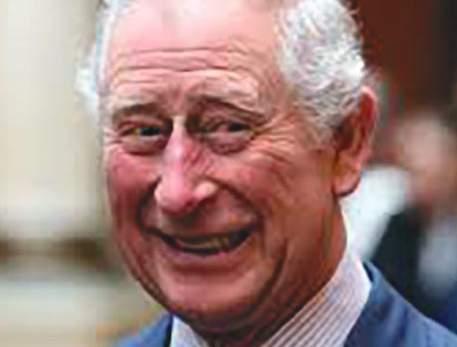
Following the first explosion in 1960, radioactive fallout landed in newly independent Ghana and in Nigeria. The Nigeria Government had earlier warned France not to conduct those tests but France refused. The test affected a lot people in Kano and its surroundings. After the test, Nigeria was made to break diplomatic relations with France.
Writing on the then situation in his book titled “A RIGHT HONOURABLE GENTLEMAN---The life and times of Alhaji Sir Abubakar Tafawa Balewa by Mr. Trevor Clark, he wrote on page 495 “As to relations with General de Gaulle (who had been assured in the Algerian cease-fire agreement that Sahara tests might continue for some years, and had just received massive support from the French people in his referendum on self-determination for Algeria, despite the abstention of 40% of resident Algerian voters), Abubakar personally followed up Dr. Esins’s demarche. At half past seven in the morning, after returning from Bauchi, he ordered the withdrawal of the French ambassador, Mr Raymond Offroy and his embassy staff from Lagos; he barred all French aircraft and ships; and he denied them all rights of transit.
The Frenchmen found their telephones disconnected the next day, and left by unescorted cars for Dahomey within the 48 hours set in the ultimatum. On unforeseen consequences was a dearth of liquid petroleum gas for Ghanaian lamps and stoves, since LPG was carried up the coast in French cargo vessels. The people who were to be hurt most were the citizens of Nigeria’s francophone neighbours in Niger, Dahomey and elsewhere. A more hypothetical result was to be suggested seven year later, M. Offroy was to be a prominent leader of the anti-federal government, pro-Biafran, lobby in Paris, and President De Gaulle to incline to favour Igbo secession.
At the time the Nigerian press and politicians were ecstatic, although their colleagues in Dahomey, Niger and Tchad were distressed. No other country broke off diplomatic relations with France over Saharan nuclear testing, resting content with shouting slogans”.
During the civil war, we all knew where France stood and this led to anti-French demonstrations by over 3,000 Nigerian students at the French embassy in Lagos on September 14, 1968.
A breakthrough in Nigeria/France relationship came on February 4, 1987, when the then Head of State, General Ibrahim Babangida flew to Paris in France for medical treatment. He was in France for
PLACE THE OHANAEZE CAP ON JOHN MBATA’S BIG HEAD is still alive in whatever shape?
How would the outcome of the elections guard against a repeat of history, the deepening of suspicion, the widening of the historical fault-lines between the South East Igbo and the Igbo in the other states thereby encouraging others to prey on the indiscretion of the mainland ‘Igbo’?
The Igbo, particularly of the South East, is almost synonymous with the word ‘marginalisation’. Is there a game plan to remove that from the psyche of those who would feel ‘robbed’, ‘excluded’, ‘humiliated’. ‘dispossessed’, even marginalised by an outcome that casts a doubt on the ‘Rivers-ness’ of the incoming President?
I say these without prejudice to the high respect in which I hold the former Inspector General of Police IGP Mike Okiro (retd), a man of great education and intellect, a police officer of no mean distinction, an unassuming and unpretentious brother of the Catholic faith, a Nigerian public servant of unimpeachable integrity, a humble person who would be expected to lead with distinction should he be become the next President of Ohanaeze Ndigbo.
My only worry is that given the controversy that has trailed his candidacy over the delicate
four weeks until he came back on March 4, 1987. No Nigeria Leader ever visited France again until March 8, 1999, when the President elect, Olusegun Obasanjo visited Paris. He was received by the then French President, Jacques René Chirac (29 November 1932-26 September 2019) even though he had not been sworn in. On February 4, 2000, President Obasanjo GCFR was in France for three days. All in all, President Olusegun Obasanjo visited France six times during his eight-year tenure as the President of Federal Republic of Nigeria. The last was on May 16, 2006, the day the Senate rejected the third term bill.
On June 10, 2008, President Umaru Musa Yar’Adua GCFR (16 August 1951-5 May 2010) visited France and was received by President Nicolas Paul Stéphane Sarközy de Nagy-Bocsa (70) at the Elysee Palace where they had lunch together. After the visit, President Yar’Adua announced a 5-billion-dollar deal with France.
On November 24, 2011, President Goodluck Ebele Jonathan GCFR GCON (67) was in France for a meeting to attract foreign investments to Nigeria. He led an economic delegation.
President Muhammadu Buhari GCFR (82) was in France for a state visit between September 14 and 16, 2015. He was also in France between February 2 and February 4, 2016. Between November 10 and 16, 2018, President Buhari was in Paris for a peace forum. Between November 10 and 13, 2021, President Buhari was also in Paris for a working visit.
We have to close the book of prejudice on France so as to move forward. We are presently in bad shape and we shall welcome any help from friends or foes who will rescue us from our present economic dilemma. The recent state visit by President Bola Ahmed Tinubu GCFR to Elysee Palace in Paris is most welcome. We need friends not foes any longer or else the world will continue to move without us. We need to sustain our traditional ties with London too, while at the same time pursuing our adventure with Paris. Rigidity wont solve our problems in Foreign Affairs, so far as our national interests are recognized and protected.
France at present is the third biggest economy in Europe after Germany and the United Kingdom, so we cant shut down the opportunities France has to offer. I am aware of top French companies operating in Nigeria. They include Air Liquide, specializing in gases, technologies, and services for industry and health, Air Liquide operates in Nigeria to supply industrial gases and related services. The company’s offerings
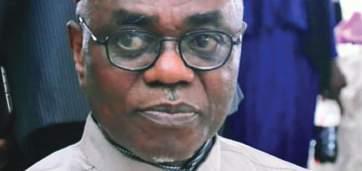
issue of his state of origin, it matters very little whether his accusers are right or wrong, whether his Police record or that of our alma mater the University of Ibadan shows reads that he is from Rivers State, if elected, he would most likely preside over a disjointed Ohanaeze at this
point. And that will be an unmitigated disaster because, divided we have always fallen, divided we shall always fall. Without prejudice to his right to contest, Is it not possible for my elder brother, Dr. Okiro to sacrifice his ambition for another candidate, say,
support sectors such as oil and gas, manufacturing, and healthcare, Bolloré Transport & Logistics, a major player in logistics and transportation, Bolloré has been active in Nigeria, providing services that facilitate trade and commerce. The company has shown interest in investing and exploring opportunities within Nigeria’s economy, Maurel & Prom--has operations in Nigeria through its significant stake in SEPLAT, one of the country’s leading indigenous operators. The company engages in exploration and production activities, contributing to Nigeria’s energy sector.
Ponticelli Frères is another French company that provides services including assembly, boilermaking, and maintenance, supporting various industrial projects in Nigeria, Alstom has been involved in Nigeria’s rail transport projects. The company contributes to the development and maintenance of railway systems, supporting the country’s efforts to improve its transportation network, Sodexo, operating in Nigeria, Sodexo provides quality-of-life services, including facilities management, catering, and employee benefits. The company serves various sectors, such as corporate, healthcare, and education, enhancing operational efficiency and employee well-being, Danone, through its subsidiary Fan Milk, Danone has a presence in Nigeria’s dairy and frozen dairy products market. Fan Milk is known for its range of frozen yogurt, ice cream, and other dairy products popular among Nigerian consumers.
Schneider Electric specializes in digital automation and energy management. Schneider Electric drives digital transformation in Nigeria by integrating worldleading process and energy technologies, an endpoint to cloud connecting products, controls, software, and services, across the entire lifecycle, enabling integrated company management, for homes, buildings, data centers, infrastructure, and industries, AXA Mansard Insurance plc was incorporated in 1989 as a private limited liability company registered with the National Insurance Commission (NAICOM).
The company was listed on the Nigeria Stock Exchange in November 2009 and currently boasts the highest market capitalization in the Insurance sector of the Exchange. The company’s health insurance service has been greatly awarded in Nigeria in recent years. Swiss Pharma Nigeria Limited (Swipha) company engages in the production and distribution of Anti-malaria, anti-infectives, anti-diabetes, CNS, and cardiovascular drugs with over thirty brands to its credit.
In 2008, Swipha became the first pharmaceutical company in Nigeria to obtain ISO 9001 certification and in 2014 again became the first company in West Africa to obtain WHO GMP certification. Examples of Swipha’s products include drugs like Arenax Plus Forte and Arenax Plus, Lafarge Africa, a subsidiary of the Holcim Group, Lafarge Africa is a leading player in Nigeria’s building materials industry. The company manufactures and distributes cement, aggregates, and ready-mix concrete, serving construction needs across the country.
Total Energies is another French company in Nigeria that majors in the petroleum industry. The company began operations in Nigeria in 1956 rapidly becoming a major player in Nigeria’s onshore and offshore oil and gas exploration, production, natural gas liquefaction, and marketing of petroleum products.
Total Energies currently operates about 570 service stations in Nigeria for the retail of petroleum products. This service station is to help the government meet the mandate of getting petroleum products across to as many members of the population as possible. In December 2023, TotalEnergies announced plans to invest $6 billion over several years in Nigeria’s oil and energy sector, focusing on gas and offshore projects. The company also currently employs more than 1800 members of staff nationwide. Over the past years, the company has invested in Nigeria’s oil and gas sector through projects like the Ubeta gas development project to supply Nigeria’s LNG liquefaction plant to aid gas supply across Nigeria. In foreign affairs there are no permanent friends or permanent enemies only permanent interests.
the urbane Senator John Mbata who, as chairman of Monier Construction Company (MCC) of Sam Mbakwe fame, could be expected to be guided by the spirit of that great man whose leadership Imo State almost reenacted the magnificent era of the legendary Dr. Michael Okpara, late former premier of the defunct Eastern Region?
That said, Mbata has had an equally illustrious career in the service of the country. Before retiring into full time entrepreneurship, he served with distinction as a member of the Senate between 1999 and 2007. He was at various times chairman of the Senate Committee on Appropriation, member senate committee on defence, works and housing, women affairs, information, as well as local and foreign debts.
An unpretentious and unapologetic Igbo man of Ikwerre extraction, he possesses the character, competence, reach and generational quotient to unify Ndigbo and create the impetus for not only for the progress of the Igbo geo-political areas but a sustainable Igbo renaissance in Nigeria where mutual co-existence and amity would reign supreme.
We live by the choices we make.
May God guide us aright.

“You’ve seen over the past weeks that there’s been agitation from some of these companies (MNOs) to increase tariff. They’re requesting for 100 per cent tariff increase. But it won’t be by 100 per cent and we’re still looking at that study and NCC will come up with a clear directive on how we go about it, to strike the balance as a government to protect our people...” --Minister of Communications, Innovation and Digital Economy, Bosun Tijani, says government may not accept Telcos’ request to increase tariffs by 100 per cent.


Only three Nigerian leaders have been invited by the British Monarch for state visits to Buckingham Palace. They are General Yakubu Gowon GCFR (90) and his wife Victoria Gowon (78) (12–15 June 1973), President Shehu Usman Aliyu Shagari GCFR (25 February 1925 – 28 December 2018) (17–20 March 1981) and General Ibrahim Babangida GCFR (83) and his wife, Maryam (9–12 May 1989).
In fact, Nigeria is more favoured than most African countries that have been invited for state visits to Buckingham Palace.
On the other hand, the British Monarch had visited Nigeria twice. Queen Elizabeth II (21 April 1926- 8 September 2022) first visited Nigeria between January 28 to February 16, 1956. She was accompanied by her husband, the then Duke of Edinburgh, Prince Phillip (10 June 1921- 9 April 2021). She visited Kaduna, Kano, Port Harcourt, Ibadan and Lagos.
While in Nigeria, she worshipped at the Cathedral Church of Christ in Marina, Lagos, an Anglican church founded by Reverend Samuel Ajayi Crowther (1809 – 31 December 1891) and which the Queen’s visit was under the Provost, Reverend A.W. Howells (17 September 1905- 7 March 1963). During her visit, the Queen donated a chair to the cathedral. The chair is still being preserved in the cathedral till today.
The Queen also commissioned the Nigerian painter and sculptor, Ben Enwonwu to make a bronze sculptor of herself. The next year, she posed in London as Enwonwu banged metal against his imagination in order to bring an outsized version of the Queen to life. The sculpture was completed in 1957, and in November of the same year was presented at the
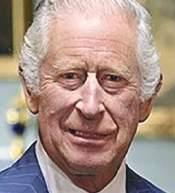
Royal Society of British Artists exhibition in London.
The Monarch was also in Nigeria between 3 to 6 December 2003 for the Commonwealth Heads of Government (CHOG) meeting in Abuja. She was received by President Olusegun Obasanjo GCFR. The Queen also visited Nasarawa state.
General Gowon was actively preparing for a state visit by the British Monarch, Queen Elizabeth II before he was overthrown in a military coup by General Murtala Mohammed while in Kampala, Uganda,
for the Organisation of African Unity (OAU) summit in July 1975.
The present British Monarch, King Charles III (76) is a regular visitor to Nigeria.
Charles, Prince of Wales, now King of England has visited Nigeria four times, in 1990, 1999, 2006, and 2018.
For his first visit, he and his now late wife, Diana, Princess of Wales (1 July 1961- 31 August 1997) arrived in Nigeria on March 15th, 1990. They left Gatwick Airport and were met at the Murtala Muhammed Airport, Lagos by the then Chief of General Staff, Admiral Augustus Akhabue Aikhomu (20 October 1939 – 17 August 2011) and Mrs. Rebecca Aikhomu. Nigeria was under military rule at the time with General Ibrahim Babangida serving as the military president.
The Prince and Princess were taken to State House Marina where General Babangida and his wife, Maryam Babangida (1 November 1948 – 27 December 2009) received them. That night, they were hosted at a state banquet after which they retired to the Royal Yacht. The Royal Yacht was docked next to the Marina in Lagos.
In 1999, the prince returned for the inauguration ceremony of President Olusegun Obasanjo (87) GCFR, late South African president, Nelson Mandela was also in attendance.
In 2006, The Prince of Wales, Prince Charles arrived at Nnamdi Azikiwe International Airport, Abuja to begin a 3-day state visit. At the time, the trip was seen as a boost to the democratization of Nigerian polity. While he was around, he also visited Kaduna and Kano.
2018 saw Prince Charles (now King Charles III) (76) return, but this time with a new wife, Camilla, the Duchess of Cornwall. They were received by President Muhammadu Buhari at the Presidential Villa in Abuja. While he was in Abuja, he met with some traditional rulers at the residence of the British High Commissioner, Paul Arkwright. Some of the monarchs present include the Ooni of Ife, Oba Adeyeye Enitan Ogunwusi (the Ọjájá II) CFR (50) , Sultan of Sokoto, His Majesty Sultan Muhammad Sa’ad Abubakar III (68) CFR, Emir of Kano, Muhammadu Sanusi II (63), Obi of Onitsha, Nnaemeka Alfred Ugochukwu Achebe (83), Etsu Nupe, Alhaji Yahaya Abubakar (72) CFR, Oba of Benin, His Royal Majesty, Omo N’Oba N’Edo, Uku Akpolokpolo Oba Ewuare II (71) and Shehu of Borno, Abubakar Ibn Umar Garba Al Amin El-Kanemi (67). During the three-day visit, the couple also met with and talked to some Nigerian youths, the Armed forces, and people in the creative sectors, specifically in arts and fashion.
Only six British Prime Ministers have visited Nigeria. They are Harold Wilson, Alec Douglas-Home, Margaret Thatcher, Tony Blair, David Cameron and Theresa May. Mr. Harold Wilson was in Nigeria for the Commonwealth Conference on Rhodesia, now Zimbabwe, held at the Federal Palace, Hotel, Lagos, between 12 January and 14 January, 1966. Nigeria’s Prime Minister then, Sir Abubakar Tafawa Balewa (December 1912 – 15 January 1966) hosted the Conference. Other world leaders that attended the conference were Lester Pearson of Canada, Sir

Who emerges President-General of Ohanaeze Ndigbo after tomorrow’s elections, to be conducted by the election committee headed by Chief Ejiofor Onyia?
Will the Nze Ozichukwu Chukwu-led Ohanaeze leadership deliver on the expectations of Ndi Igbo worldwide who have been waiting with bated breath for the new leadership under a president-general who, in line with the 2004 Constitution of the body, must come from Rivers State?
Can Nze Ozichukwu Chukwu deploy his famed man-management skills and political savvy to navigate the labyrinthine intrigues trailing what, by all accounts, is expected to be a watershed election in Ohanaeze history?
What, with allegations that one of the candidates is not an indigene of Rivers State, or that he has what is akin to dual indigene-ship? Assuming he wins, will the other candidates accept the outcome?
What steps are being taken to guard against validating the allegation that has always been used to create division between the Igbo of the
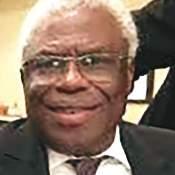
South East and their kith and kin in other states; that the latter are regarded as inferior Igbos to be exploited and put down at will? Thus, will the various stakeholders subsume
their narrow personal or self-serving interests under the larger collective Igbo interest at a time that the race faces its most daunting existential crisis?
These, and more are some of the posers that ought to adumbrate the Igbo consciousness, going into the election.
Tomorrow’s election has generated considerable interest for at least two other reasons: First, is the requirement for the incoming president to possess the stature to stand toe to toe, with various leadership cadre in the country particularly leaders of other socio-cultural groups and political leaders from the south east geopolitical zone with governors leading the pack. The second is the argument that the president who will emerge must be an “authentic” Rivers indigene. That three intending candidates had cause to hold a press conference where they ‘disowned’ a presumed front runner justifies the need for caution moreso when it is acknowledged that one of the major problems plaguing Ohanaeze and by extension the Igbo race is the perennial failure of consensus, a seething disunity that is often ignored but never chased away.
Of course, there is the ever present fear of the process running into some legal headwinds, something that we have witnessed time and again. Will this election be an exception? Hopefully, the answer will emerge within the next twenty four hours.
It could be useful if the wise men and women who make up the electoral advert their minds to the following questions:
Would the history of inter-ethnic relations between the Igbo and the other ethnic groups in the defunct Eastern Region have been different, perhaps more constructive and productive, if the great Zik of Africa had allowed Professor Eyo Ita to remain as the leader of Government Business after the former was ditched in the former Western Region?
Would the defunct Eastern Nigeria Development Company (ENDC), the umbrella body under which many economic enterprises in the defunct Eastern Region were established have collapsed, when ODUA Group (Western Region) is striving as a behemoth and the NNDC (Northern Region),